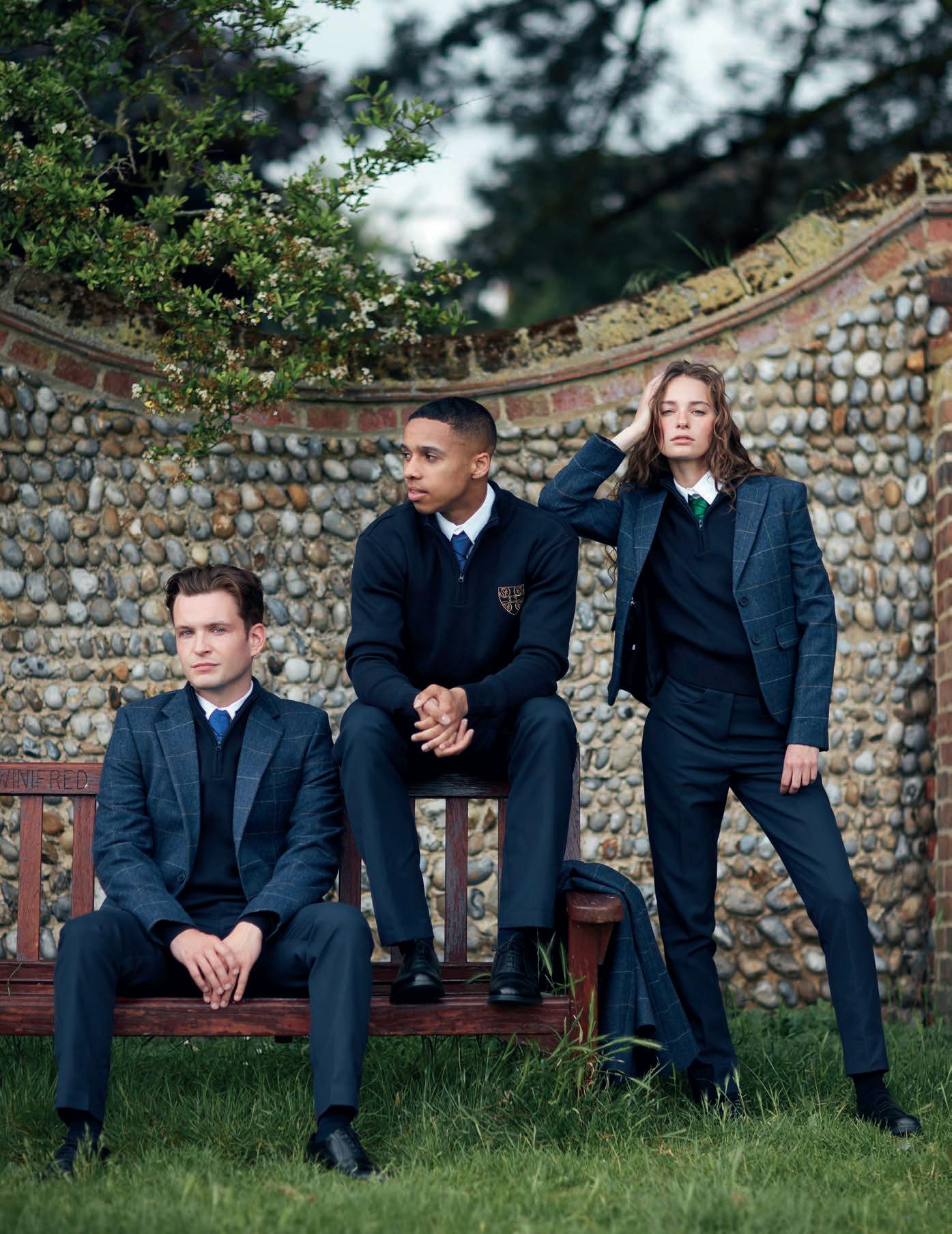INDEPENDENT SCHOOL PARENT
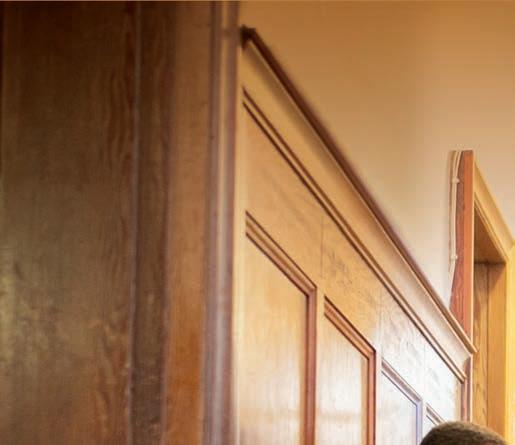
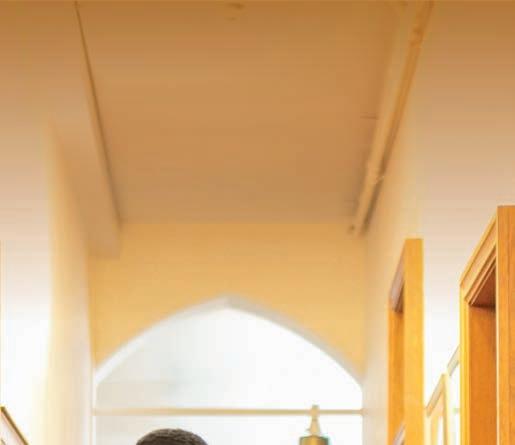

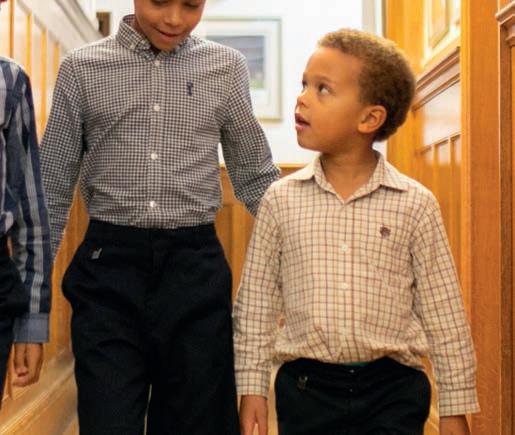

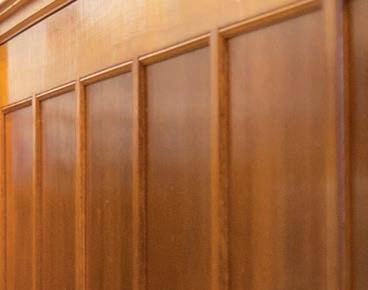




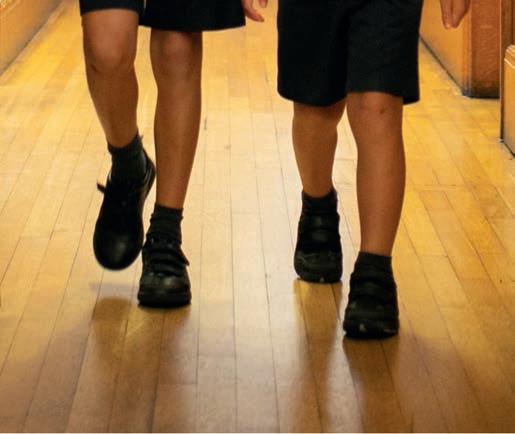






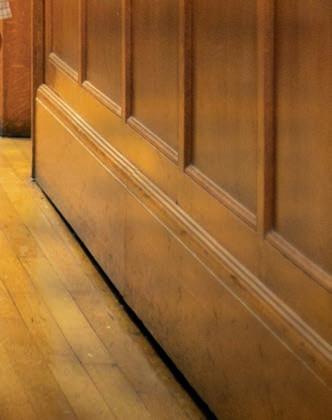



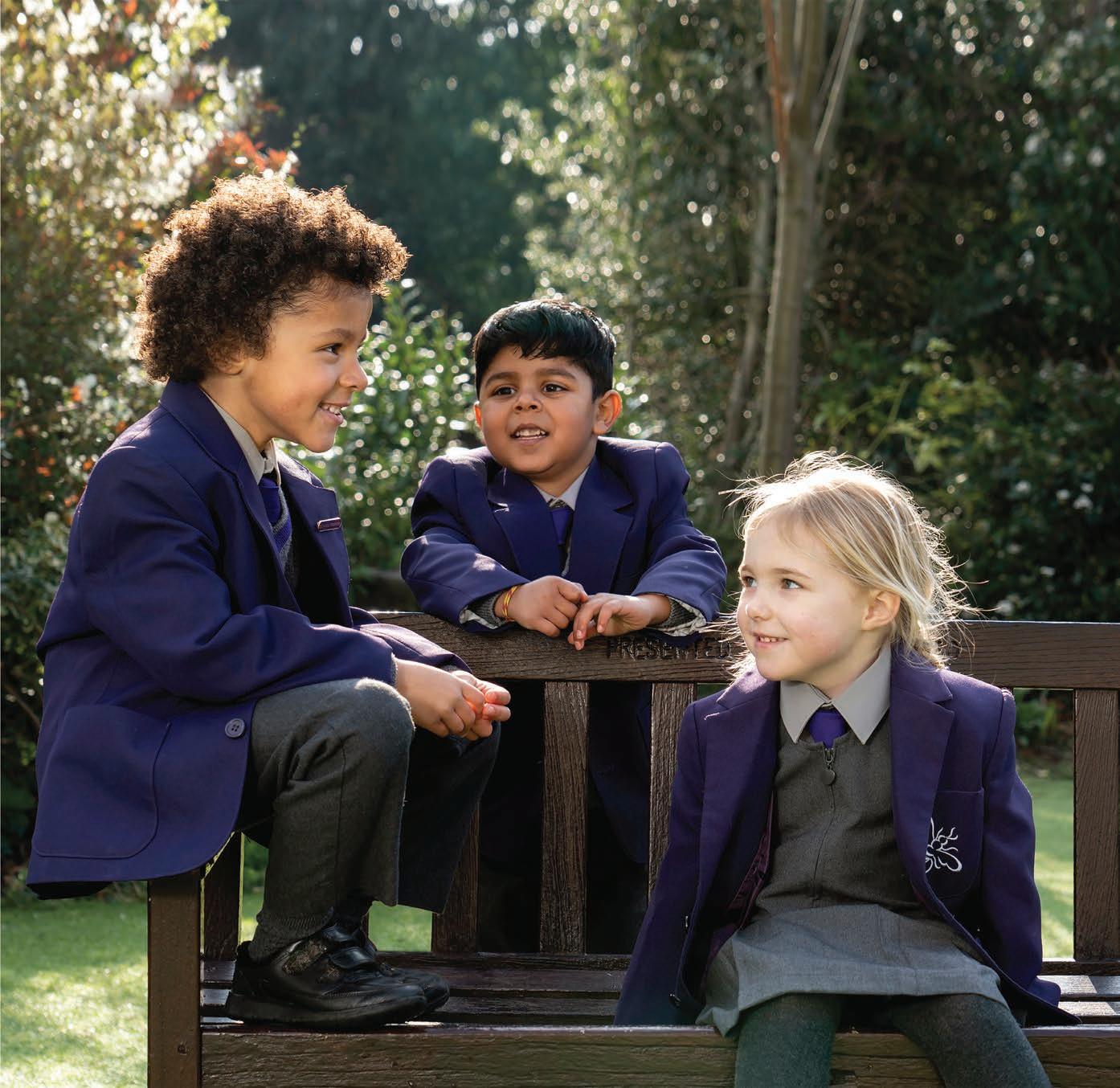

























It’s my pleasure to welcome you to this autumn’s prep and senior schools edition of Independent School Parent Our eighth Independent Schools of the Year Awards ceremony was held just before half term – more than 200 guests, including the finalists of the 25 categories, and senior leaders across the sector filled the Law Society in Chancery Lane, London for the big reveal. Turn to page 62 now to find out who won what, then head over to the website, independentschoolsoftheyear.co.uk for a full list of the winners, finalists and commended schools in each category. Many thanks to those of you who entered, and to our campaign sponsor, Schoolblazer. Schools have faced severe financial pressures this year in a perfect storm of VAT on fees, increases in national insurance contributions and the removal of charitable business rate relief. However, it isn’t all doom and gloom, as many schools are still forging ahead with their bursary and scholarship provisions. On page 36, you’ll learn how fee assistance structures are evolving and that you shouldn’t be deterred from researching and starting the process for your child. If your child has just started reception and is grappling with phonics and letters, our expert advice piece on page 28 is all about how parents can o er support in those first weeks of learning to read. And if our surprisingly good British summer is a distant memory and you could do with some winter sun, why not enter our competition to win a luxury family holiday in Crete? Turn to page 80 to find out more.
CLAUDIA DUDMAN, EDITOR
@ISParent
@IndependentSchoolParent
@independentschoolparent


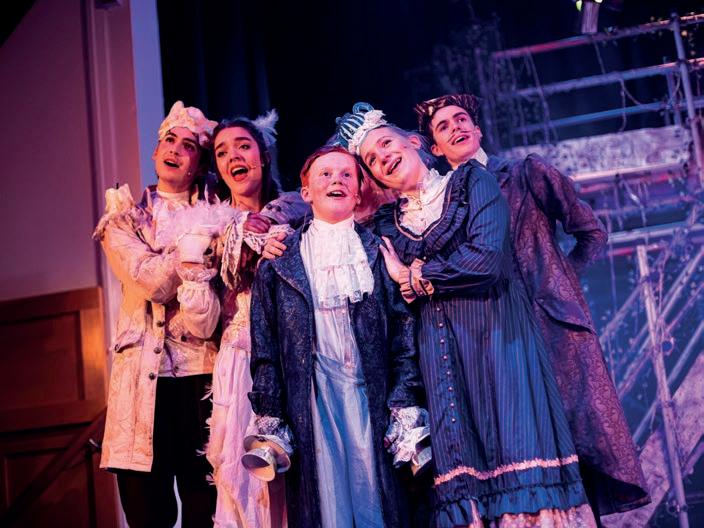
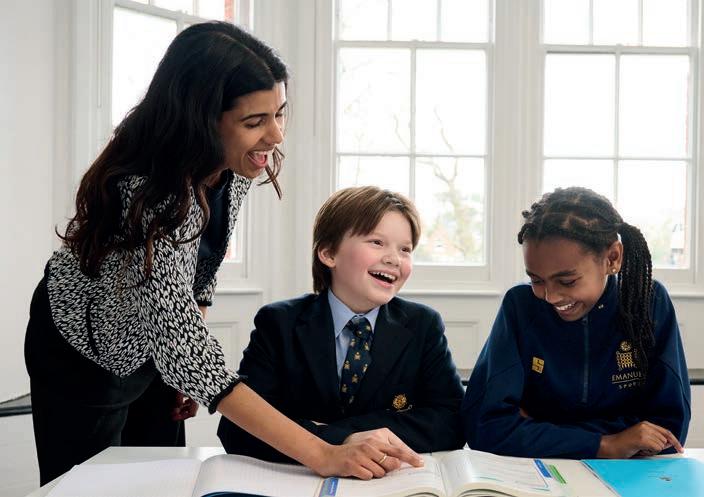
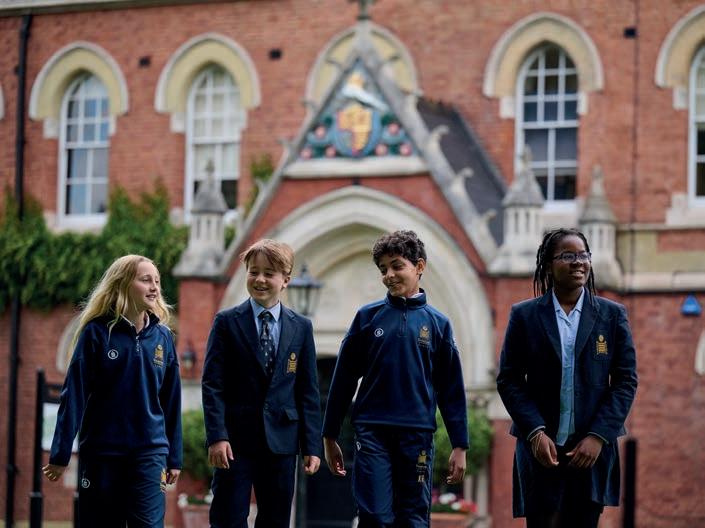

ADVERTISING
Acting
simon.temlett@chelseamagazines.com
Portfolio
nicholas.gavigan@chelseamagazines.com
Acting



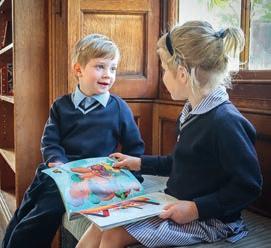
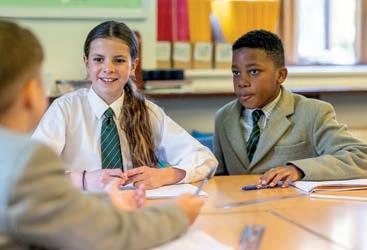

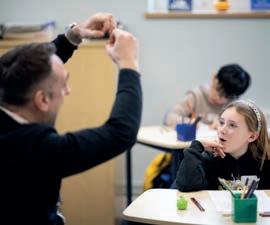
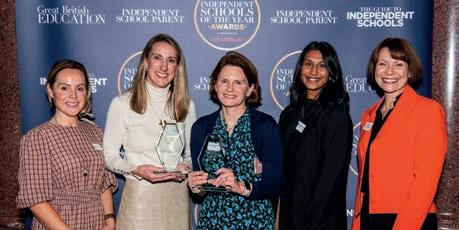
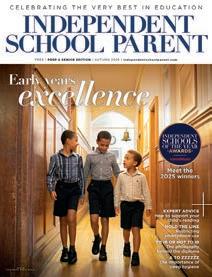




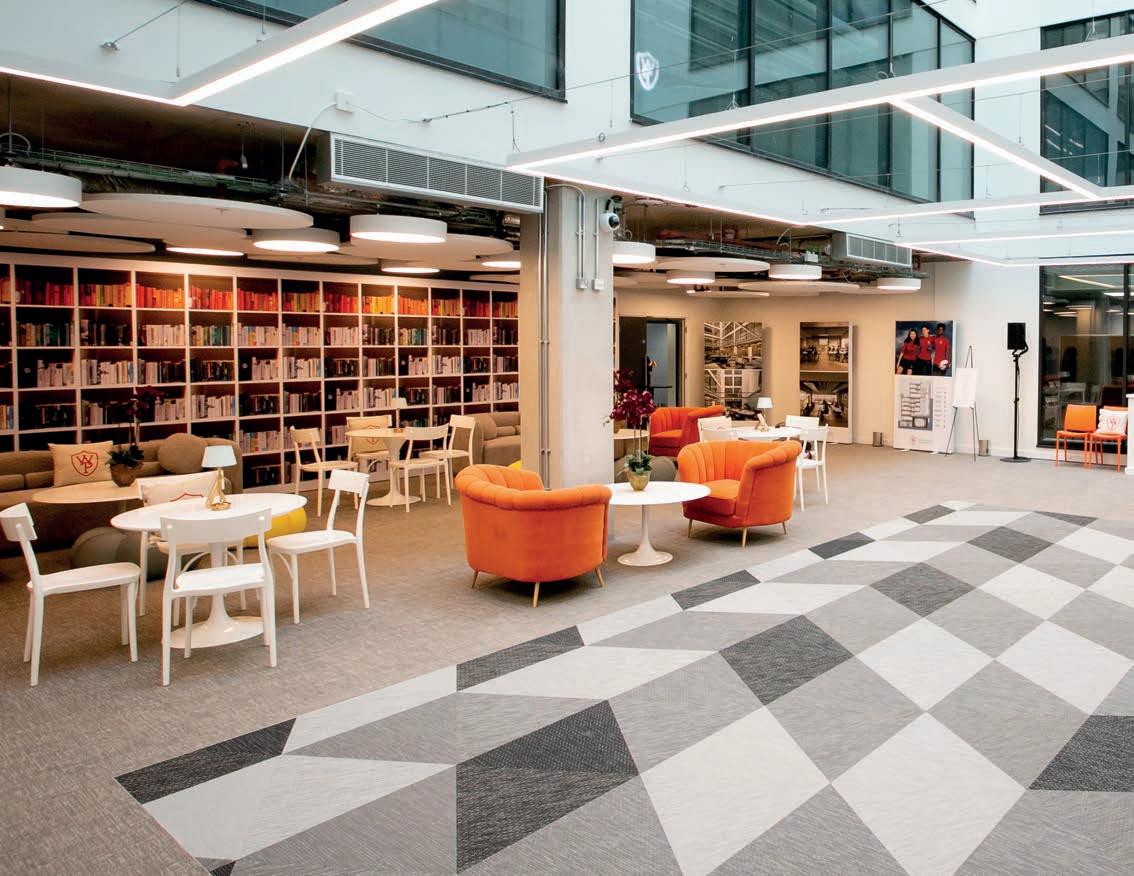

The new independent senior school opened in Olympia in September, with its first cohort of students from across years seven to nine. Built on the excellent reputations of the Wetherby Schools and Pembridge Hall, Wetherby Pembridge is poised to continue this legacy of tradition, combining academic rigour with the latest educational innovations.
As the newest member of the Inspired Education Group, it o ers a holistic education in a premium purpose-built setting with world-leading facilities, which includes 15 acres of outdoor sports grounds, creative art and performance spaces. Wetherby Pembridge students will benefit from global university and career counselling, pioneering AI learning initiatives, and international student exchanges.
Designed by award-winning London architects Walters & Cohen, it’s located amid the Olympia neighbourhood’s ongoing £1.3bn transformation.
Founding Head, Nick Page, says: “From our future-ready classrooms and labs to our professional-standard theatre and world-class sporting facilities, we’ve created an environment of academic excellence where we can identify and nurture students’ full potential and enable them to flourish and succeed in whichever field they choose.”

Papplewick School, Berkshire
The school’s boys celebrated European Language Day this September in characteristic style. With parent-led workshops about Spain, Russia, Turkey and more providing particular highlights, students also learned about Ukraine’s history and its national treasures, as well as some useful phrases in various languages from across the continent.

On your bike!
Morrison’s Academy, Perth and Kinross
Once again, the Crieff school was proud to collaborate with Comrie Croft and Scottish Cycling to deliver the Scottish Schools’ Mountain Bike Championships. Almost 500 secondary-age students from more than 100 schools across the country took to the trails for the event, which is now recognised as the biggest U18 schools mountain-bike race in the UK.
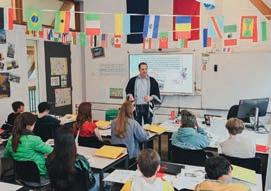
Bedales, Hampshire
New Bedales Assessed Courses (BACs) are being developed to further reduce the number of GCSEs taken by students to two subjects (maths and English language). Year 10s can currently choose from BACs such as digital game design, global awareness and Japanese. These alternative courses offer increased depth, more active learning, and a wider range of assessments.

the ascendant
Tring Park School for the Performing Arts, Hertfordshire
A new BBC docu series, Stage Stars, telling the stories of the homegrown stars of tomorrow is out now. It offers viewers insight into the delicate balance between boarding-school life and preparing for a career in the spotlight. Blending behind-the-scenes work and performances, it captures the ambition and work ethic of Tring Park students.
St Gerard’s School, County Down
After a string of outstanding achievements, 14-year-old student Seren Harris has her sights set firmly on 2026’s All-Ireland Fleadh. At this year’s event, the All-Britain champion placed second and third in the Fiddle Slow Airs and Fiddle Dance Tunes categories respectively.
• BOYS ALLOWED
Abbot’s Hill School, Hertfordshire
The day school will extend co-ed provision into the senior school, with boys being admitted into year seven from September 2026. The decision follows the recent introduction of boys into the prep, as well as rising demand from families interested in Abbot’s Hill’s culture, value and ethos.
Taunton School, Somerset
The school’s first-ever Giving Day in September was a resounding success. Filled with events, challenges, performances and bake sales raised a total of £415,000 – far exceeding the original target of £250,000. Funds will go towards campus refurbishments and the Assisted Places programme.
• NEW
Bedford School Mohali, India
Bringing a wealth of experience in UK and international education, Naomi Atkins has been appointed the new school’s founding Principal. A partnership between Bedford School and the Doon International Education Society, it will be the first British international girls’ school in India.
Headteachers on the move

This term, Elizabeth Knight took over as the Head of Wycliffe College Prep, Gloucestershire.

Next September, Merchant Taylors’ School, northwest London will welcome Sam Baldock as its new Headmaster. Dr Adrian Rainbow will start as Head of Exeter School, Devon in September 2026.

Oundle School, Northamptonshire welcomed Dominic Oliver as its new Head this term.
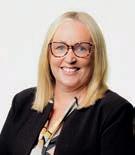
Heather Cavanagh has taken up the permanent role as Head of Burgess Hill Girls’ School, West Sussex.

In January 2026, Sarah SutherlandBooth will take over as Head of Dorset House Prep, West Sussex.
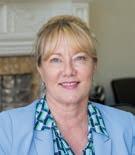
Brighton College, International
The British international school group is set to open its first schools in continental Europe, benefiting more overseas children with the same pioneering curriculum and opportunities that have seen Brighton College pupils progress to the world’s top universities. In partnership with Intellego Education, new day and boarding schools in Rome, Madrid and Lisbon for ages three to 18 will launch from September 2027.

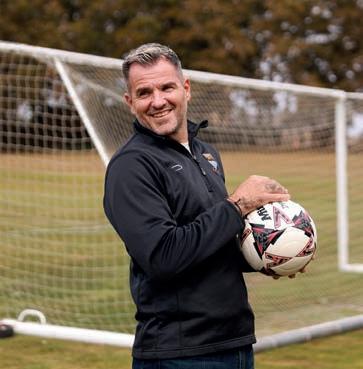
Gordonstoun, Moray
The school has welcomed the world’s youngest national football manager Simon McMenemy as its new Head of Football. Aged just 32 when he took charge of the Philippines team, the Aberdeen native has spent the past 15 years coaching in Asia. His arrival follows Gordonstoun’s sports provision revamp, with the aim of offering academy-level coaching and building professional partnerships.
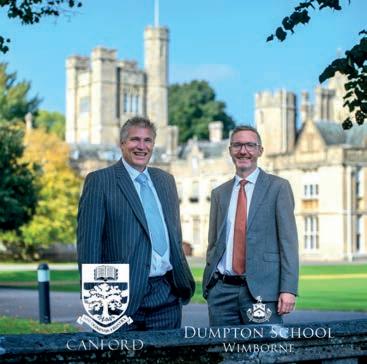
The Canford Schools Group, Dorset
Two highly successful schools in the south-west of England, Canford and Dumpton, have announced plans to merge, forming the Canford Schools Group. Places at co-ed senior boarding and day school Canford are much sought after, Dumpton is a popular co-ed day pre-prep and prep. Located just three miles apart – and with shared educational values – both schools will maintain their current identity.

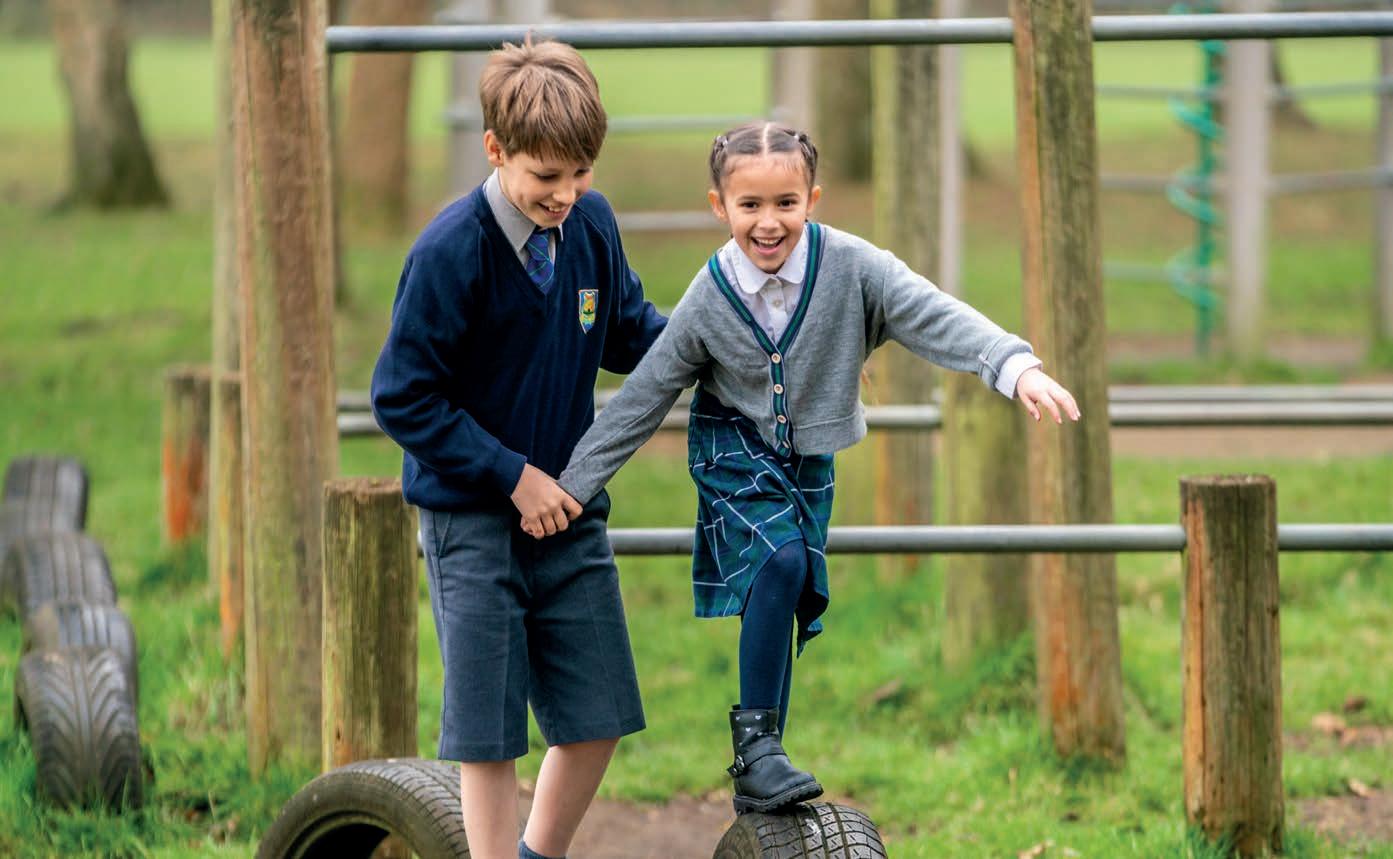










148 8
148 8






























Kimbolton School, Cambridgeshire
The all-through school is set to open a preschool in January 2026. A nurturing space supported by dedicated staff, it will be housed next to the school’s reception classrooms to help ease the youngsters’ gradual transition into school life.
• BRIGHT YOUNG THINGS
Cranleigh School, Surrey
This term, Cranleigh Prep opened its doors to fiveand six-year-old pupils for the first time. The new pre-prep offering is part of an ongoing plan to widen access, with nursery and reception classes set to be added in September 2026.
• LOOKING
Bolton School, Greater Manchester
Amanda Potts has taken up a new position: Head of Futures. A sign of the school’s commitment to supporting students as they move on to higher education and the working world, the role heads up the department offering students indepth university and career guidance.
• GOING
Minerva Virtual Academy, International
The fast-growing school has launched its own Duke of Edinburgh Award scheme, meaning it’ll be among the first online schools to be licensed to run the extracurricular initiative. It will cover all four elements, including the expedition.

Pocklington School, Yorkshire
Over the summer, second- and third-year students showcased a powerful exhibition, titled Self-Portrait Poems, at Pocklington Arts Centre. Featuring personal poems and photographs that explore identity, self-expression and the world as they see it, as well as audio recordings of their poems, the exhibition was the multimedia culmination of a creative school project.

Ellesmere College, Shropshire
Three talented Ellesmere College Tennis Academy players have served an amazing season. Gwen Klu, 15, is now a world-ranked junior and has been asked to join Ghana’s national squad, while Alfie Edwards, also 15, won the U16 and U18 Shropshire County Championships, and VV Alkureishi, 13, qualified for Play Your Way to Wimbledon, almost making it to the U14 girls’ singles quarter finals.
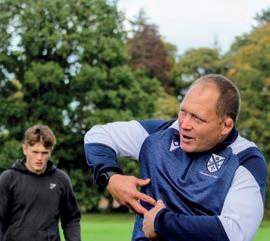
Glenalmond College, Perth and Kinross
Former Scotland international player WP Nel has been appointed to the college’s rugby coaching team. After three world cup tournaments and 60 caps for Scotland, he’s still playing professionally for Stirling County. Nel has taken on the role of Forwards Coach, and with a particular focus on the senior rugby teams, he’s set to bring a wealth of professional experience to the sports department.
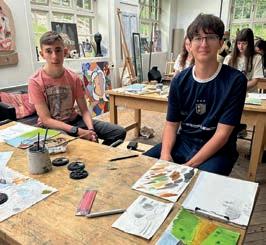
Sedbergh, Cumbria
The school stepped up to rescue a life-changing educational experience for children affected by war. Days before a group of seven Ukrainian children, supported by the Children of Heroes charity, were due to travel to the UK for the Brightseeds initiative, the host school’s programme was cancelled. Sedbergh answered the appeal, hosting the children and their group leader for three weeks.

Over 25 years of supporting life’s journeys.

Over 25 years of supporting life’s journeys.

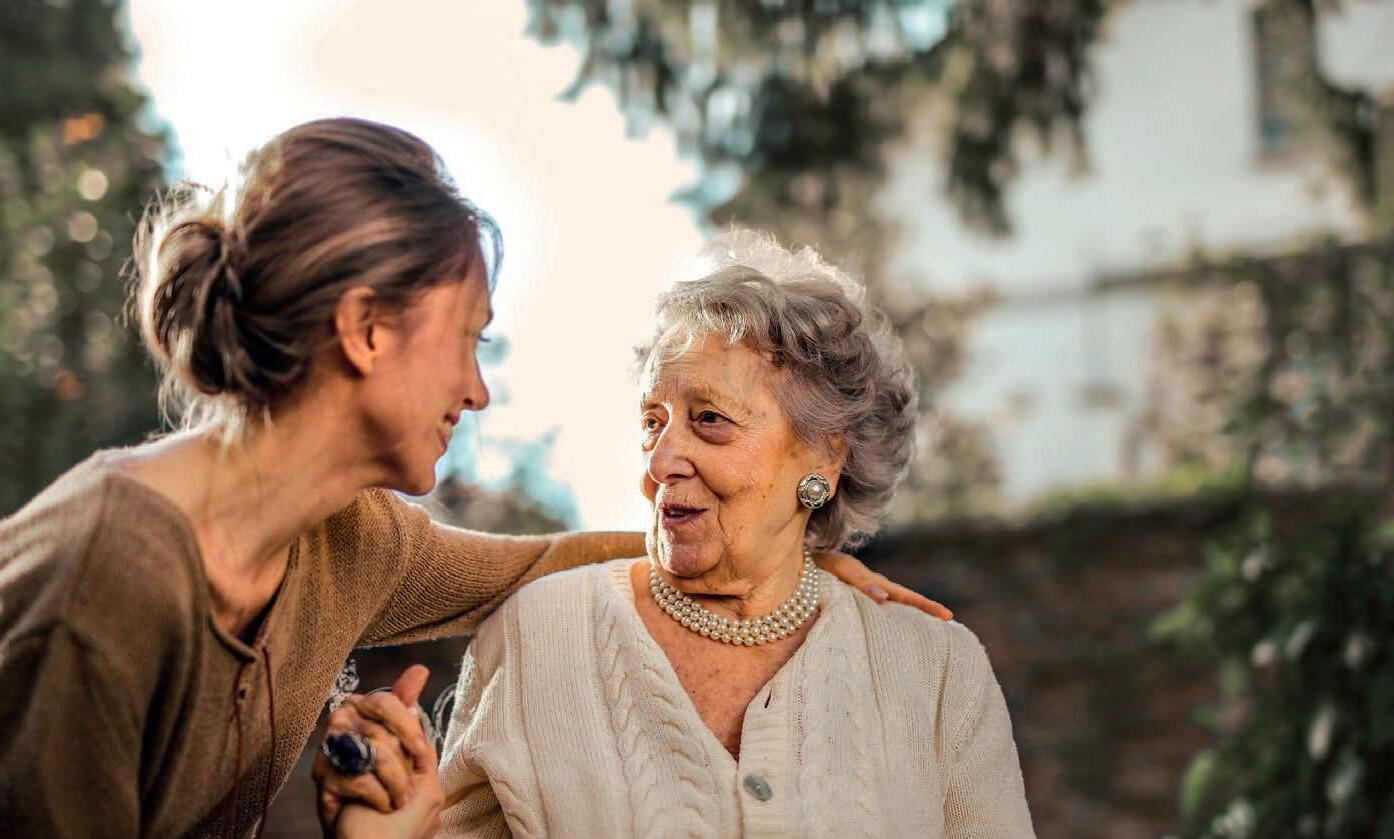
For over 25 years, Trinity Homecare has been dedicated to providing exceptional, person-centered care in the comfort of your own home. Our bespoke live-in care services ensure you receive the right support tailored to your needs.
For over 25 years, Trinity Homecare has been dedicated to providing exceptional, person-centered care in the comfort of your own home. Our bespoke live-in care services ensure you receive the right support tailored to your needs.
With 24/7 support and a compassionate team of care experts, we’ll find the perfect carer to support your independence, wellbeing and daily life—so you can continue living life your way.
With 24/7 support and a compassionate team of care experts, we’ll find the perfect carer to support your independence, wellbeing and daily life—so you can continue living life your way.
Contact our dedicated team to explore your options:
How can our live-in and visiting care services help?
•Full-time care in the comfort of home
•Full-time care in the comfort of home
•‘Outstanding’ rated care, so you know you’re in safe hands
•‘Outstanding’ rated care, so you know you’re in safe hands
•One-to-one support with your daily routine
•One-to-one support with your daily routine
•Support with personal care such as washing, dressing and any continence care (if required)
•Support with personal care such as washing, dressing and any continence care (if required)
•Companionship, friendship and reassurance
•Companionship, friendship and reassurance
•Someone to take care of the housekeeping and ensure your home is clean and comfortable
•A new lease of life
•Someone to take care of the housekeeping and ensure your home is clean and comfortable
•A new lease of life


Gareth Parker-Jones on the changing landscape of independent schools and the reasons for establishing the Rugby School Group
There has been a surge in large private education groups and foreign investors buying UK independent schools, especially prep schools. Many of these acquisitions have taken place in the wake of the government’s imposition of VAT on independent school fees. In some cases, schools have been reassured by the lifeline offered by a new owner, but in some the result has caused concern.
Parents worry about who’s running their child’s school, whether it’s suddenly going to change direction, or if the new owner is based thousands of miles away, never to be seen and only concerned with the bottom line.
Where is Rugby in this volatile time for the independent education sector? We’re a co-educational school for students aged 13 to 18. Half of this year’s
conversations with people who admired our Whole Person Whole Point approach and were interested in our conviction of the transformative nature of boarding. Rugby School Thailand and Rugby School Japan are now thriving, and Rugby School Nigeria opened in September 2025.
We have good relationships with many UK independent prep schools, especially with those whose pupils have joined us for their senior education.
External pressures are making it harder for some of them to carry on doing what they’re good at and what parents want for their children: a broad education, often in country locations where pupils can safely learn and play outside; freedom to remain children for as long as possible, learning self-confidence and trying new things; care based on kindness.
We started to think about the potential benefits of

WE STARTED TO THINK ABOUT THE POTENTIAL BENEFITS OF a closer relationship with some of the prep schools we knew and admired, WHOSE LEADERSHIP WE RESPECTED AND WHO SHARED OUR VALUES
cohort of 890 are boarders. We’re a thoughtful, academic and – crucially – charitable organisation.
At the heart of Rugby is our house system. Every student belongs to a house for all the time they’re at Rugby, and of course the boarders live in theirs. We keep them small – about 10 from each year group, and try to ensure a mix of children – local, from elsewhere in the UK and abroad, and not all from the same socio-economic group. The government appears determined to caricature independent schools as being preserves of a narrow elite – a long way from the truth.
Rugby has a tradition of being accessible to talented children, whoever they are. All of us learn best, grow up wiser and kinder, when we’re surrounded by people who have had different experiences from our own and come from a variety of backgrounds.
Thanks to our bursary programme, around 40% of our students have financial assistance. This includes the Arnold Foundation which covers 100% of fees, plus extras, for talented children with a need for boarding, whatever the reasons. No fee income is used to fund any of our bursary places; the money comes from philanthropy and investment.
About 10 years ago, we started to receive overtures from international organisations keen to enter into a partnership. We rejected most of them but started
a closer relationship with some of the prep schools we knew and admired, whose leadership we respected and who shared our values.
Our approach to them wouldn’t be based on acquisition. It would be an invitation to become members of the Rugby School Group, with all the benefits of financial security, alongside reassurance that they would retain their identity and autonomy.
The schools would be in different parts of the country, so they wouldn’t be competing for pupils.
In 2019, Bilton Grange was the first prep to become a member. It was followed by Aysgarth in 2025, and Old Buckenham Hall will join in January 2026.
Our goal for establishing the Rugby School Group in the UK is not to centralise, but to support a small number of outstanding, like-minded prep boarding schools. As well as stability, students of member schools benefit from being part of a global network of exchanges and collaborative projects, and in which staff share ideas on teaching and learning.
What does it mean for the parents? Reassurance that the family-school relationship with Rugby is personal, that the prep school they chose for their child will retain its special qualities, and the focus remains on supporting the highest quality of education and care for their children.
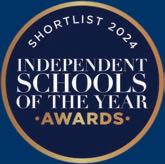


An excellent day and boarding school on the Derbyshire–Nottinghamshire border for ages 0–18, offering a well-rounded education that fuels ambition, builds character, and prepares young people to go further in every aspect of life.
Read our latest excellent ISI Inspection on our website.
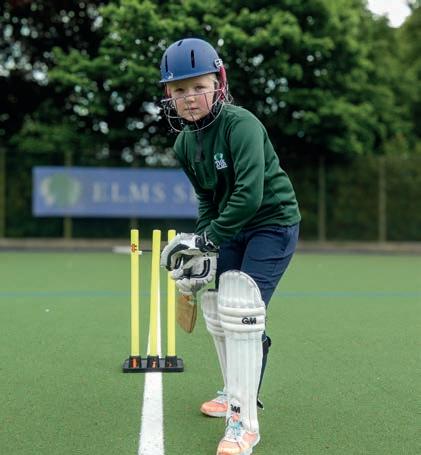
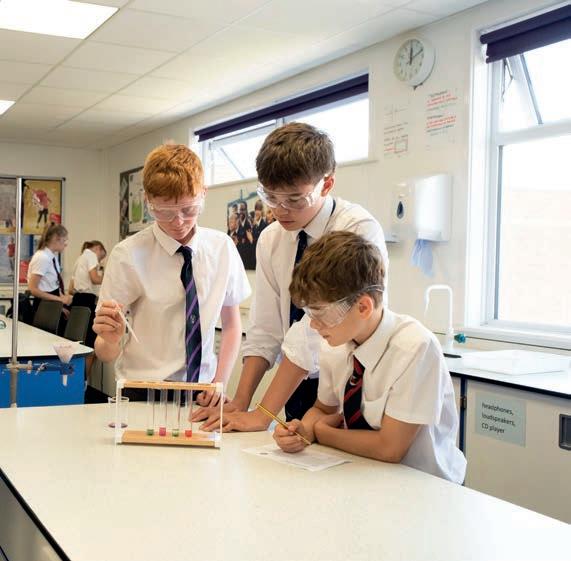




The power of early intervention is key in helping children with dyslexia thrive, writes Michelle Catterson
The conversation around dyslexia and special educational needs (SEN) is shifting, and not before time. For years, the narrative focused on barriers such as slow reading, low confidence and missed potential. But, at our school, we see what’s possible when the right intervention comes early enough to transform a child’s whole story.
Moon Hall is a specialist mainstream school for pupils, aged seven to 16, with a primary need of dyslexia. Our pupils follow the national curriculum, taught by subject specialists who are also trained in dyslexia-specific approaches. It’s a model that proves that specialist support and high aspirations can, and should, coexist.
Across the UK, 1.5 million pupils (around 17%) are identified as having SEN, with roughly one in 10 thought to be dyslexic. Within the independent sector, the number of pupils receiving SEN support has more than
Specialist education is evolving. Parents are no longer seeking places that simply support their child; they’re looking for environments that empower them to thrive. At Moon Hall, our motto is: Believe, Belong, Become. We create a community where children rediscover the joy of learning, where individuality is celebrated, and where difference is seen as strength. The impact extends to families too, many of whom have long battled a system that didn’t meet their child’s needs. The relief and pride they feel in seeing their child flourish are profound. And increasingly, specialist schools like ours are sharing their expertise globally. This year, we launched the Moon Hall Learning Centre Cairo, bringing diagnostic assessments, specialist tuition and teacher training to the Middle East. The vision is simple: to make early intervention and expert teaching available worldwide.
I ALWAYS REMIND THE TEAM AT MOON HALL SCHOOL, “Our job isn’t to fit children into a school system; it’s to reshape THE SCHOOL SYSTEM, SO EVERY CHILD CAN FLOURISH”
doubled in the past decade. These figures remind us that neurodiversity isn’t an exception; it’s part of the fabric of every classroom. As I often say, “When we adapt for those who struggle most, we improve outcomes for everyone.”
Early intervention: changing the story
Early intervention isn’t just about teaching reading earlier; it’s about changing a child’s relationship with learning. With early identification, we can build on strengths, reduce anxiety and prevent years of self-doubt.
At Moon Hall, interventions are integrated seamlessly into every classroom. There are no separate learningsupport bases or pull-out sessions that make pupils feel different or behind. Every child learns alongside their peers, with targeted strategies woven into daily teaching. This inclusive model sets Moon Hall apart, and it works. Our GCSE results and pupil progress demonstrate exceptional value added, showing the tangible difference specialist teaching in a mainstream setting can achieve. Many children arrive at Moon Hall feeling different, defeated or ready to give up because the accommodations they needed hadn’t been made. One of the most powerful things we hear from new pupils is, “I don’t feel different anymore.” That sense of belonging is transformative. When children feel accepted, they start to believe in themselves again, and that belief changes everything.
• Present information many ways: speak it, show it, write it.
• Allow processing time before expecting responses.
• Celebrate creative strengths, since dyslexic thinkers often see patterns and connections others miss.
• Normalise assistive technology with tools like Read&Write and speech-to-text as standard practice.
• Notice patterns such as letter reversals, inconsistent spelling or avoidance of reading.
• Talk early with teachers or the SENCo.
• Ask for progress evidence – results should be measurable.
• Focus confidence: self-esteem is as vital as accuracy. When parents and schools work together, children feel supported, believed in and empowered.
At a time when education headlines often focus on funding, we mustn’t lose sight of what matters: inclusion. Every school should have SEN at its heart. Because when we design classrooms around those who struggle most, we create learning environments where everyone succeeds.
At Moon Hall, the difference is visible in our pupils’ progress, in their joy, and in their families’ renewed hope. That’s what it means to Believe, Belong, Become.
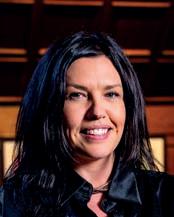
As the newly appointed Assistant Head (Nature), Katy Kelly stresses the vital part this new role plays in education
We’re proud to be pioneering a transformative approach to education, that places nature at the heart of learning and wellbeing.
As Assistant Head (Nature), I’m delighted to share how this unique role is shaping the future of our school, enriching the lives of our pupils.
Mount Kelly is a co-ed day and boarding school for ages four to 18, nestled on the edge of Dartmoor. With 600 pupils and an “excellent” rating from the Independent Schools Inspectorate (ISI), we’re committed to delivering a holistic education, nurturing academic success, personal growth and emotional wellbeing.
Our journey into nature-based education began with a question: does time spent outdoors detract from academic achievement? An analysis of exam results revealed the opposite – pupils engaging in outdoor
faculty, embedding nature into every subject and year group. Pupils are involved in a Royal Society biodiversity project in partnership with the University of Plymouth, gaining exposure to professionals and research.
Nature is central to our wellbeing strategy. Green spaces are used for pupil regulation, replacing enclosed rooms with calming, outdoor environments. A woodland “biome” offers dedicated space for reflection and selfregulation, accessible to both pupils and staff. Staff wellbeing is prioritised, with encouragement to take wellbeing walks and engage with nature during breaks.
Using the Nature Connection Index (NCI) developed by Derby University tracking changes in wellbeing, engagement, and skills development, we commit to measuring impact. Early findings are promising: pupils report feeling calmer, more focused. Teachers observe increased participation and creativity in lessons. Cross-

OUR JOURNEY INTO NATURE-BASED EDUCATION BEGAN WITH A question: does time spent outdoors detract from academic achievement? AN ANALYSIS OF EXAM RESULTS REVEALED THE OPPOSITE
activities consistently achieved higher value-added grades than their peers. This compelling evidence led to a whole-school commitment to integrating nature into our strategic vision.
The role, Assistant Head (Nature), marks a significant milestone; we believe, the first full-time school leadership position dedicated solely to nature in education. My focus is to build connectedness: to nature, place, each other, and ourselves. This connectedness is not only vital for wellbeing, but enhances academic engagement and personal development.
Mount Kelly’s grounds are a treasure trove of green and blue spaces, rich in biodiversity and natural beauty. While pupils have always had access to these areas, we now use them intentionally and creatively across the curriculum. Lessons are increasingly outdoors, especially tutor time, where pupils take nature walks, engage in reflective activities, and participate in handson experiences such as gardening and photography competitions. Activities encourage pupils to engage meaningfully with the world around them, encouraging conscious, mindful awareness of their environment, away from distractions of technology and screens.
Our Nature Connection programme empowers pupils to manage plots of land, grow plants, and explore the natural world. Resources and ideas are shared across
curricular links are emerging, with pupils making connections between nature and academic concepts.
Staff development is key to our strategy; regular INSET sessions, practical activity cards, a “staff nature” chat platform to share ideas. Our aim is to make nature integration accessible and sustainable, for all.
We’re expanding our educational provision with new GCSE and A-level courses, launching a project to support nature connection in local primary schools, in collaboration with Oxford University – exploring impact on behaviour and attendance. In March, we will host the UK’s first nature education conference, connecting educators, researchers, and policymakers to explore how nature can transform teaching and learning. We are introducing a nature scholarship to nurture and empower changemakers of the future, young people who demonstrate a passion for environmental stewardship, wellbeing, and innovative thinking, welcoming applications for a 2026 start.
As Assistant Head (Nature), I’m excited to lead this innovative journey. At Mount Kelly, we believe that nature isn’t a distraction from learning – it’s a powerful catalyst for it. By embedding nature into every aspect of school life, we’re nurturing resilient, curious and compassionate young people who are deeply connected to the world around them.


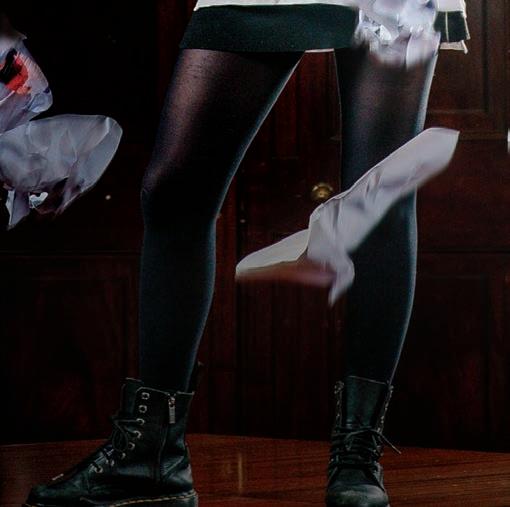
We can’t ignore the dark side of fashion – the exploitation behind the creative facade. I’m going to be a fashion journalist you can trust – who uncovers the truth, offers you better choices, and empowers you to express yourself ethically. Let’s redefine fashion together and transform our wardrobe and our world. Book a visit


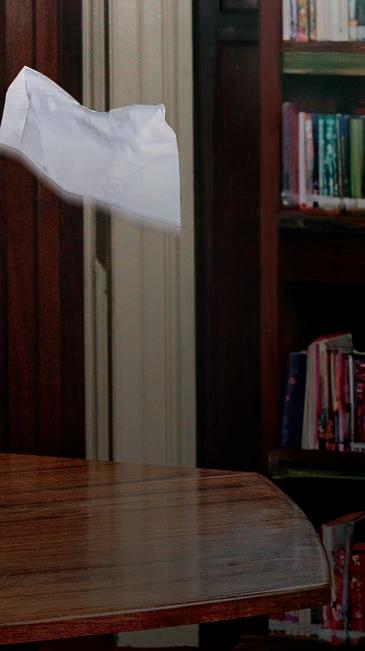
Bryanston is an award-winning, co-educational boarding and day school for pupils aged 13-18, set in 400 acres of Dorset countryside admissions@bryanston.co.uk | +44 (0)1258 484 633





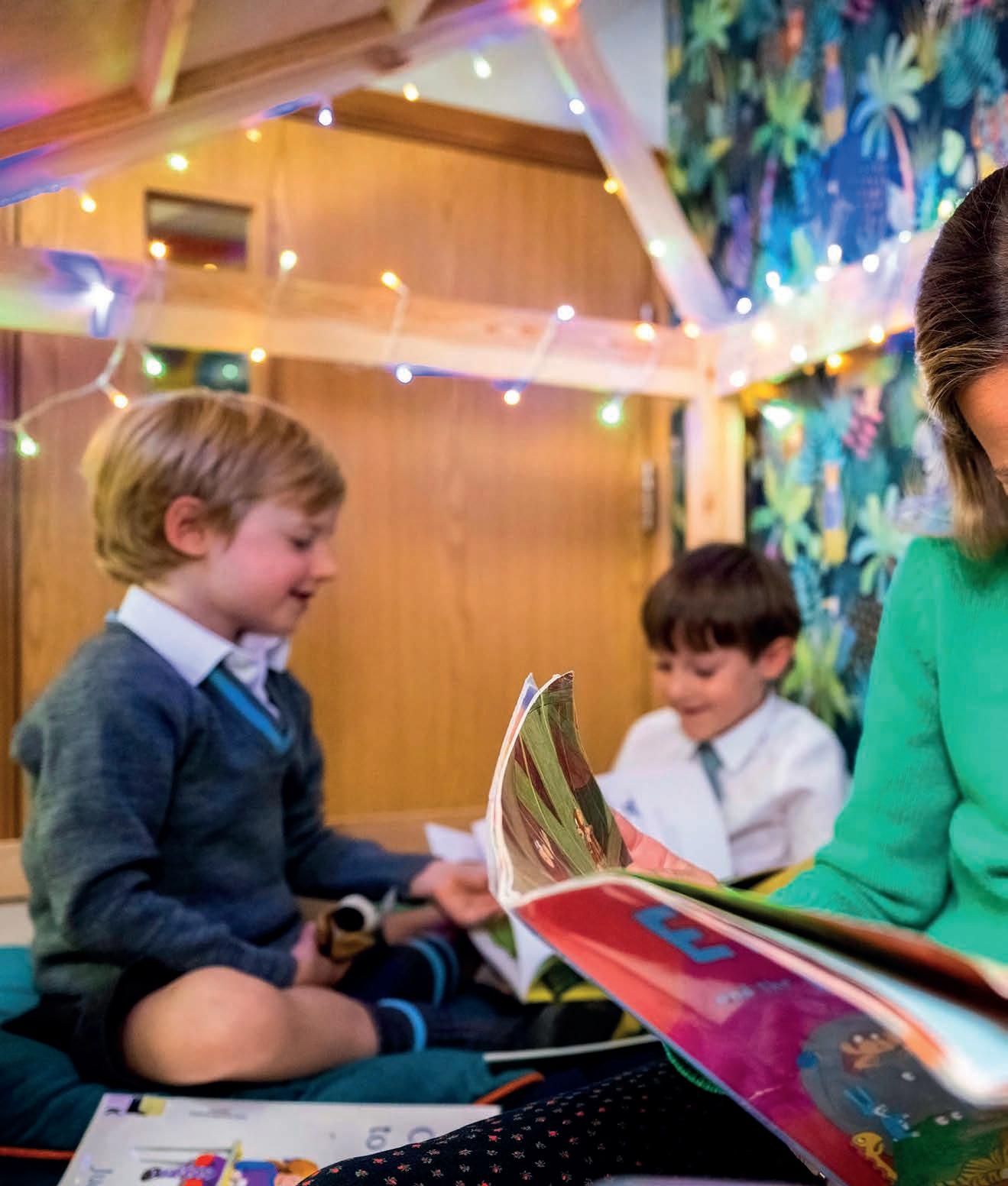




By inspiring curiosity and joy for life in all pupils, pre-prep education continues to ourish. Robust curriculums, Early Years initiatives and a commitment to developing resilient and self-assured learners who explore themes such as leadership and compassion means that they’re well-prepared for the next stage of their education. Read on to learn how three of the nalists in this year’s Independent Pre-Prep School of the Year award category in this magazine’s awards campaign have created enriching communities and environments to support children as they take their rst step into school life...
Highfield Pre-School is a nurturing community where a passion for learning and a love of life begins.
The pre-prep stands out for its commitment to developing resilient, confident and self-assured learners, while establishing positive relationships in environments which engender growth and personal development. These spaces are fostered by staff, who ensure that children undertake a range of adult and child-led activities, both inside – a large Victorian house – and outside, a large open space, with a willow garden and pond for Forest School and pond dipping.
Children assimilate and often progress to Highfield Prep. They meet reception teachers, participate in joint events with reception pupils, and have weekly sessions with Highfield’s specialist PE, music and drama teachers. This conscious effort provides children with a smooth transition into Highfield Prep, ensuring they settle in quickly, and can build on established relationships which prioritise their personal and academic development.
Highfield’s provision blends a robust curriculum, featuring outdoor learning, music, French, yoga and swimming with outstanding pastoral care. Through extensive consultation with parents and staff, the catering team creates bespoke meal plans to meet dietary requirements. Children eat in a dedicated
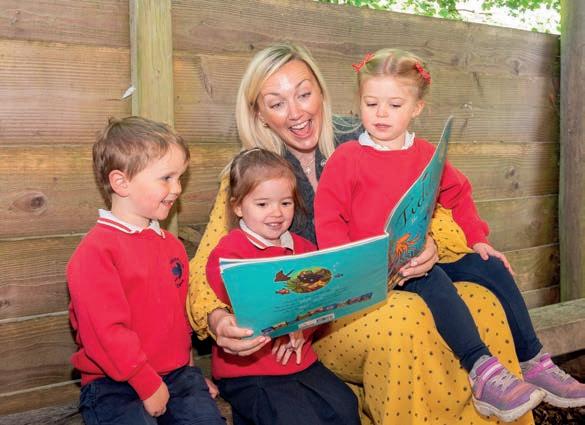
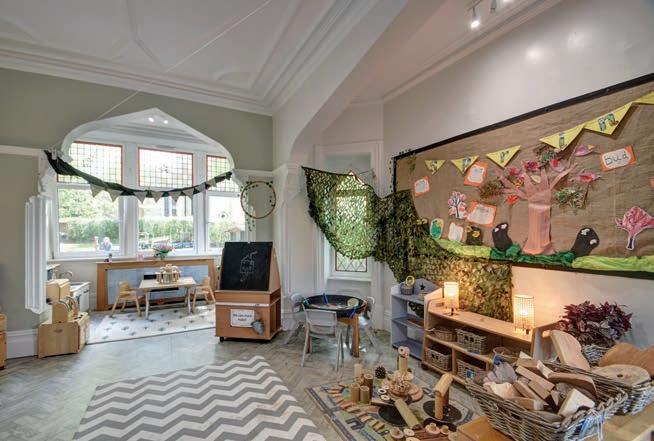
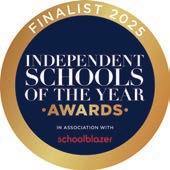
dining room, developing positive attitudes towards a broad variety of food.
The school is also proud to offer Baby Highfield, a free weekly session where parents can bring their 0-2-year-olds to pre-school. They’re a wonderful opportunity for families to connect and make use of the outstanding facilities. This year, it was expanded to also offer baby yoga – run by accredited practitioners –and Forest School for tots.
Through a diverse curriculum and robust pastoral care offerings, children develop emotional literacy, independence and empathy from an early age. Staff are passionate about developing individual relationships, and take pride in knowing the children as their parents know them. The process of learning should be inspiring and challenging: through a mix of initiatives, each child has opportunities to develop confidence and work in an environment which best suits their learning styles. This gives them the freedom to be themselves, try new things and embrace challenges.
Highfield nurtures confident, engaged learners, and with a focus on the whole child; intellectually, emotionally and socially. The school ensures they leave pre-school with strong foundations and every possible advantage in the next stage of their educational careers.
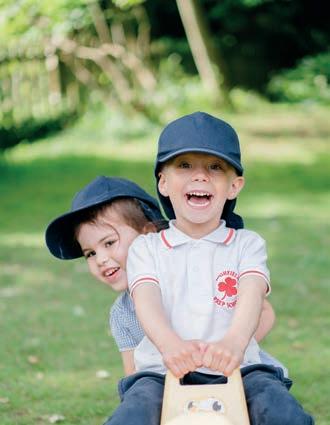
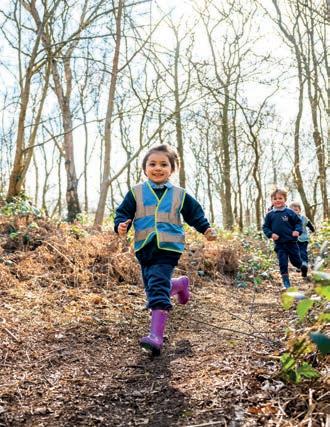
Hurlingham’s strength lies in its deeprooted culture of care, creativity, and curiosity. The school’s ethos that children thrive when they’re known, valued, and inspired was recognised in its most recent ISI inspection, where its Early Years provision was awarded the rare and prestigious judgement of a “Significant Strength”. Inspectors were particularly struck by the emotional development of its youngest learners, a direct result of the intentional focus on wellbeing, relationships, and responsive teaching.
What sets Hurlingham apart is the ability to blend high academic expectations with a genuinely joyful school experience. The children flourish in an environment that’s both ambitious and nurturing, where creativity is embraced, individuality is celebrated, and kindness underpins every interaction.
Over the past year, outdoor learning has been introduced into its Early Years, purposeful play has been embedded in the curriculum, and home-school partnerships have been strengthened. All these initiatives contribute to children’s readiness for the next stage of their education. Hurlingham stands out not just for what it does, but how it does it; with warmth, integrity, and an unwavering commitment to the best possible start for every child.
In 2024-25, the pre-prep provision remained
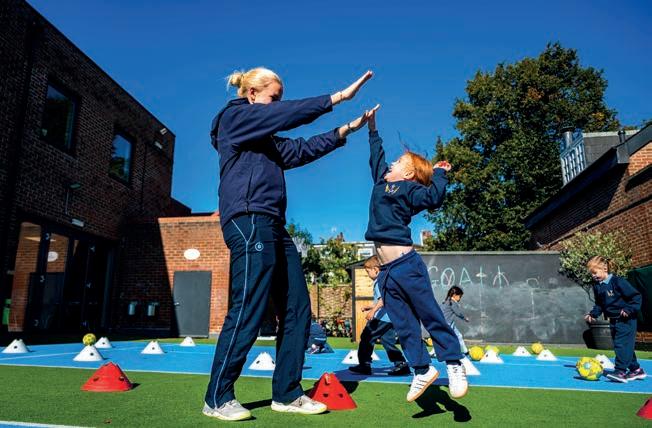
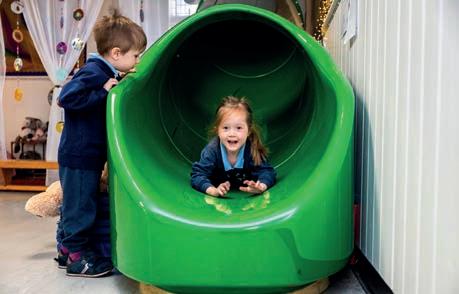

child-centred, dynamic, and responsive to the needs of its learners. The EYFS 2024 curriculum framework was mapped, ensuring full coverage of the seven areas of learning, with particular focus on emotional development and communication, two areas consistently cited by parents as vital in early education.
A particular highlight this year has been its Little Leaders initiative, where even the youngest pupils explore responsibility, teamwork, and voice through class councils and buddy projects. It has also expanded its Forest School programme, integrating outdoor learning into core curriculum delivery to build confidence, independence and connection with the natural world. These initiatives are embedded in the rhythms of school life and have had measurable impact on pupil confidence, resilience, and engagement. They reflect a commitment to purposeful innovation which is always grounded in what’s best for children.
At Hurlingham, kindness, confidence, curiosity and respect shape a culture where emotional intelligence is valued as highly as academic attainment. It fosters self-assured, emotionally literate learners well-prepared for the demands of the next stage of their education.
Preparation for transition is thoughtful and structured: it builds strong learning habits, encourages independence, and ensures children experience, stretch and challenge in a supportive setting. Children leave not just school-ready, but confident in who they are, eager to contribute, and equipped with both the skills and the character to thrive.
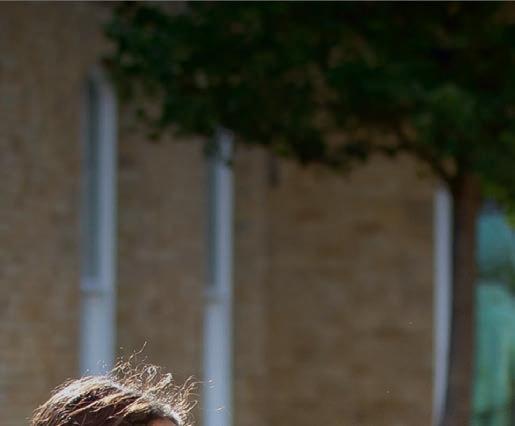
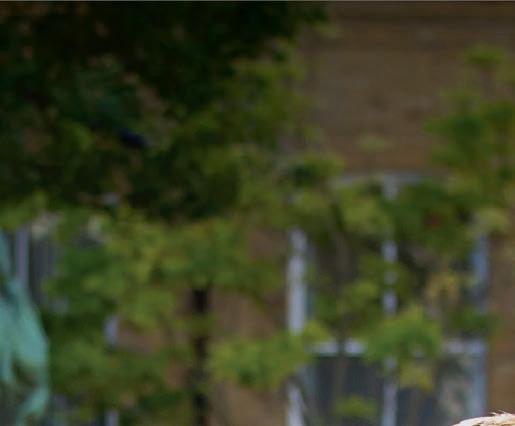
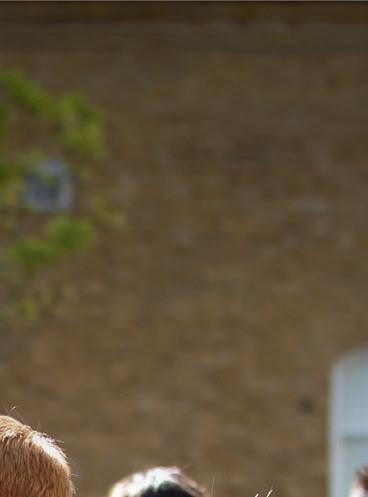
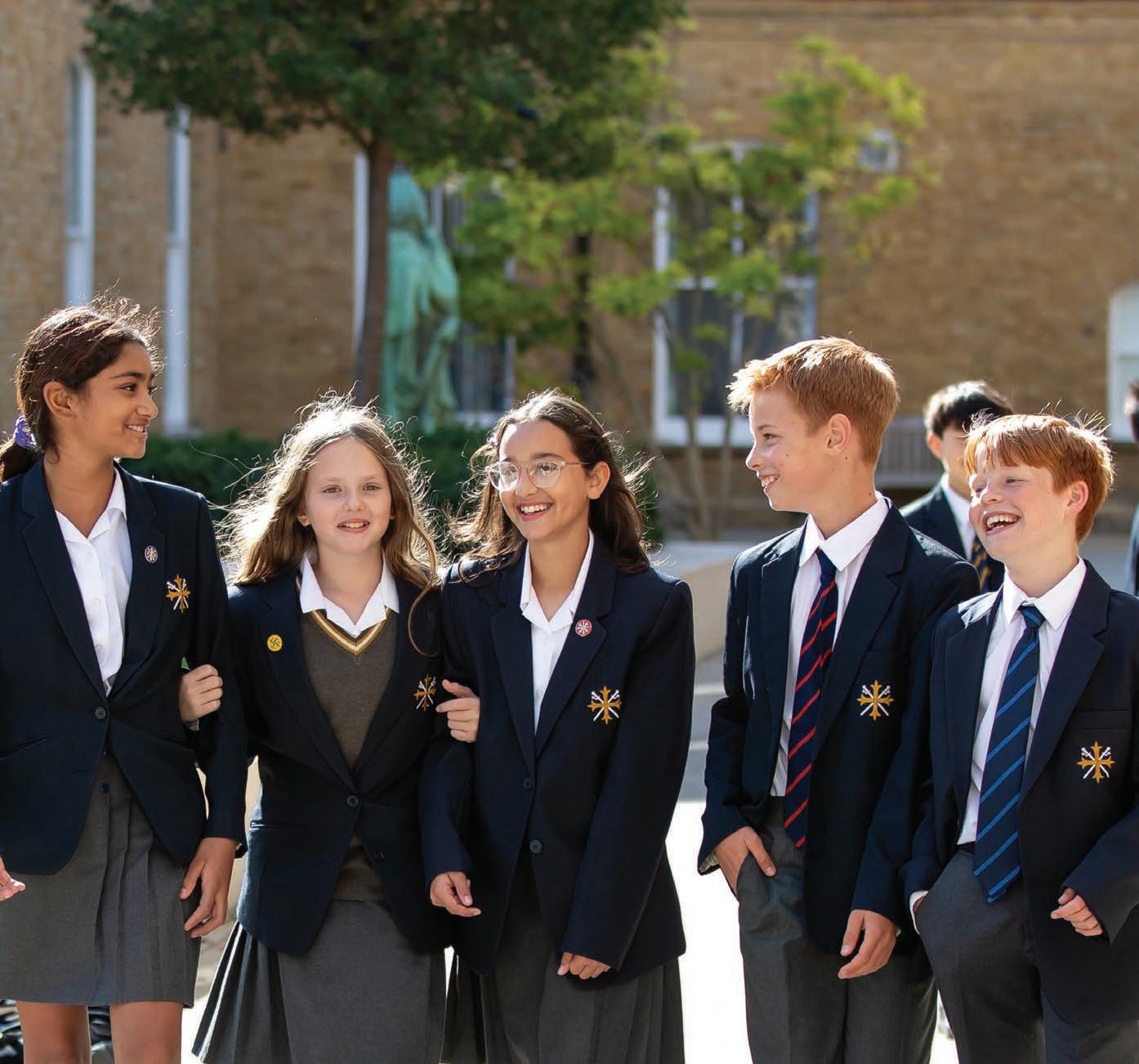
Letting its pre-prep cohort take a practical lead in their own learning story, Truro High School for Girls creates courageous individuals
The pre-prep at Truro High is a vibrant, nurturing community where every girl is deeply known, genuinely loved and wholly celebrated. Learning is alive – practical, sensory, and joy-filled – and driven by a belief that children thrive when their individual identities are truly embraced.
Its girls don’t just receive knowledge; they shape their learning. They’re given agency and autonomy in an environment that invites curiosity and challenge. One moment they’re building a bridge outdoors, the next they’re questioning a visiting sixth former about future dreams. The school weaves inspirational role models into the daily fabric of school life, nurturing aspirations without limits.
What makes it truly unique is that academic rigour and creative exploration are symbiotic. Through its High Performance Learning pedagogy, deep thinking and high achievement grow from play, wonder, and relationships. Its ethos has been described by inspectors as “magical”, by parents as “transformational”, and by our girls as “a place where you can try anything.” This isn’t just a school – it’s a launchpad for life, where confidence, compassion and courage are sparked in every child.”
Its provision evolves with imagination and responsiveness. When one class making fruit salad noticed a Fairtrade sticker on a banana, curiosity led to a classroom transformed into a banana cooperative by morning. They researched global trade routes, explored atlases and investigated chocolate, tea and ethical

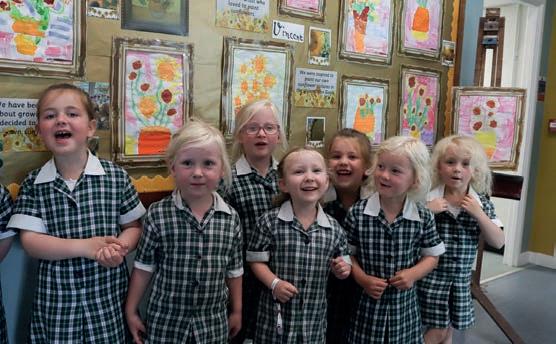
consumerism – culminating in persuasive posters and impassioned advocacy.
This is the essence of its approach: learning led by children, facilitated by teachers who pose questions rather than answer them. Its learning spaces reflect this freedom – offering flexibility, light, and inspiration. From exploring in senior school labs to leading classroom debate, this sensory, collaborative learning fosters deep engagement. The result? Articulate, self-aware learners who step forward with confidence and curiosity. Its girls don’t wait for permission to lead – they step into it, with vision and voice.
Its core value – kindness – is the heartbeat of the school. Woven through this is the golden thread of High Performance Learning, which champions courage, curiosity and excellence. These values are modelled, encouraged and lived every day. Girls are empowered to ask bold questions, take brave steps, and show deep care –for themselves, one another, and the wider world.
Through the principles of High Performance Learning, the youngest children build core cognitive and emotional habits: from resilience to meta-thinking, creativity to collaboration. These aren’t abstract skills – they’re embedded in every aspect of work and play.
The school challenges stereotypes, breaks down barriers and inspires ambition. Whether dissecting philosophical ideas or asking a visiting alumna about her career in engineering, girls are taught to dream wide and aim high.
Prep isn’t a leap – it’s simply the next chapter.


For many families, school closures can be unsettling. But challenge often brings renewal, and it’s the independent schools that embrace change and lead with compassion that have the ability to bounce back – and in some cases even stronger than before, writes Samantha Dainty






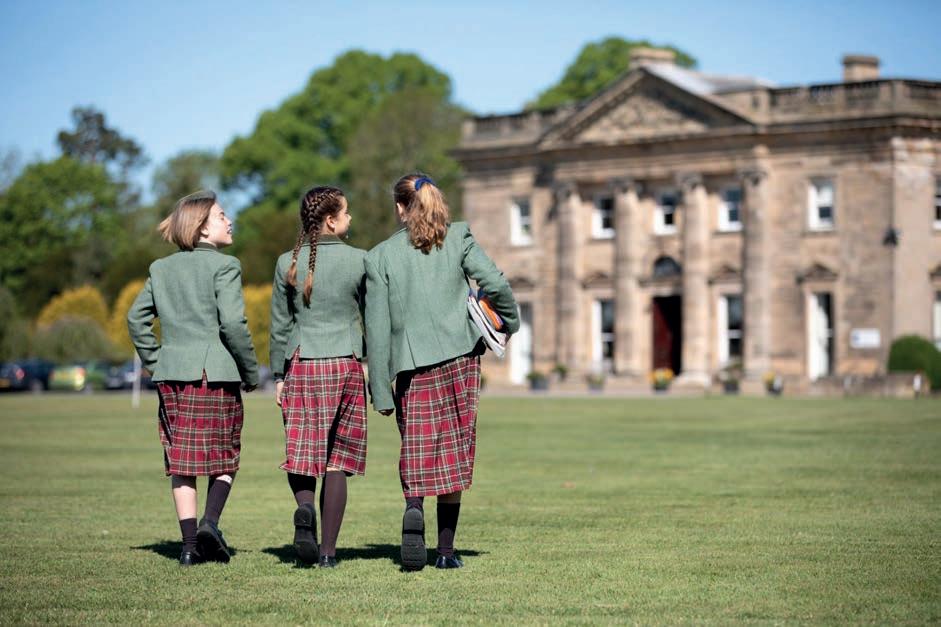
IT ADAPTED ITSELF TO FIT THE NEEDS OF NEW arrivals. Bus routes were redrawn to make travel feasible. Small classes were expanded to ensure CONTINUITY. EXTRA GCSE OPTIONS WERE ADDED
When Queen Margaret’s, the all-girls’ boarding school near York, announced its sudden closure just three weeks before the end of the summer term, the news was utterly devastating. Families faced disruption, pupils experienced the wrench of leaving friends and teachers behind, and staff faced an uncertain future. Some students who had just completed year 10 and year 12 have had to repeat the year, unable to find a school that could accommodate their subject choices or align with their exam boards.
Across the country, 2025 has brought further losses to the independent sector, with closures that have shaken communities large and small. The reality has felt devastating for many – and it’s hard to find ways to sugarcoat or search for silver linings. Yet, as is so often the case in times of adversity, beauty can emerge from loss and recovery. In the midst of grief, stories of compassion, creativity, and community have begun to surface.
For parents at Queen Margaret’s, the question was immediate: where will our children go now? In this context, the actions of neighbouring schools became decisive – and marked the difference between a painful rupture and a hopeful transition. Bootham, The Mount, and Ampleforth all rallied for the Queen Margaret’s community, hosting open days and taster sessions at short notice, doing their best to match existing fee arrangements, scholarships and bursaries, even while juggling their own end-of-term demands.
Among them, Queen Mary’s near Thirsk stood out for the depth of its response. The school didn’t just open its doors – it adapted itself to fit the needs of new arrivals. Bus routes were redrawn to make travel feasible. Small classes were expanded to ensure continuity. Extra GCSE subject options were added, so that no pupil had to abandon their chosen course mid-stream.
“We were devastated at the news of Queen Margaret’s closing. It honestly felt like a bereavement. Queen Mary’s has been beyond fantastic in what, for us, has been thoroughly distressing circumstances. The school has bent over backwards to accommodate us with travel and GCSE options and shown unbelievable empathy. Every single contact – academic, pastoral, admissions staff, pupils or parents – has been wonderful. We’ve been welcomed with open arms.”
Charlotte Dugdale-Tonks, parent
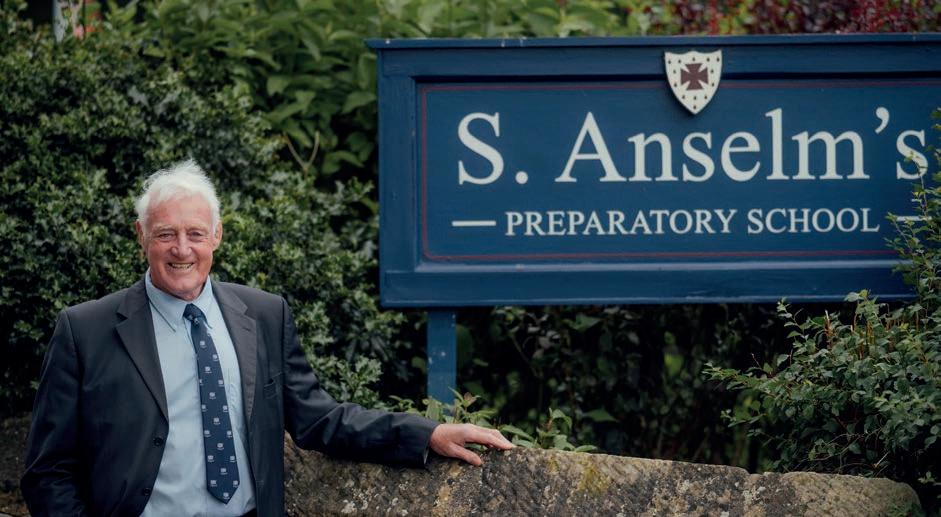
TOGETHER THESE STORIES REVEAL THE BEST of the independent sector: empathy in action, creativity under pressure, and a shared belief that EDUCATION IS ABOUT MORE THAN BUILDINGS
In a moment when educational choices had been stripped away, Queen Mary’s offered something invaluable: dignity, stability, and a sense that every child mattered.
For many distressed families, Queen Mary’s became not just a school, but a lifeline.
Across the country, schools and communities have shown extraordinary resilience in the face of closures. While each story is unique, many share a common thread: compassion in crisis.
At Connaught House School in central London, Principal Mrs Victoria Hampton recalls two recent examples that demonstrate how deep these values run.
When St John’s Wood Prep closed in July 2024, the news was devastating for families. Determined to ensure no child was left without a place, the school reached out to Connaught House directly. Despite being a small school, Connaught House offered a place to a year two pupil whose family had been affected. With one-to-one support to smooth the transition, the child has flourished – making friends across year groups and fully embracing school life. His mother has since joined the fundraising committee, a reflection of how completely the family has been welcomed into the Connaught House community. Another example came when Hawksdown House closed in 2022. Its headteacher, showing great empathy for staff facing career uncertainty, personally contacted Connaught House about a talented teacher seeking a new post. She joined as a form two teacher and, within two years, was promoted to the school’s senior leadership team. What could have been a career setback has become a truly positive change – both for her and for the school.
These stories show that while closures can fracture communities, they can also forge new connections – between schools, families and educators – grounded in generosity and trust.
This same sense of belonging and determination was at the heart of S. Anselm’s in Bakewell, Derbyshire, a 137-year-old school saved from closure through the collective efforts of parents, alumni and local supporters earlier this year. A public auction and fundraising drive raised more than £245,000, giving the school a new lease of life. A new trust board was formed, fees were reduced, and sponsorship opportunities created to widen access. Emma Harrison, parent and trustee, described how the announcement that the school had been saved “was met with tears of joy” and that “the emotion in the room was electric” – a powerful reminder of what a united community can achieve.
Together, the stories of S. Anselm’s, Queen Mary’s and Connaught House reveal the best of the independent sector: empathy in action, creativity under pressure, and a shared belief that education is about more than buildings – it’s about people and purpose.
The closures facing independent schools mark a moment of reckoning – but not of defeat. Out of challenge comes renewal. The schools that innovate, collaborate, and lead with empathy are already showing that the independent sector can and will adapt to survive.
Independent schools have weathered wars, recessions and reforms before; their strength lies in their ability to reinvent without losing their soul. And as these stories reveal, when people come together with compassion and creativity, even endings can become beginnings.
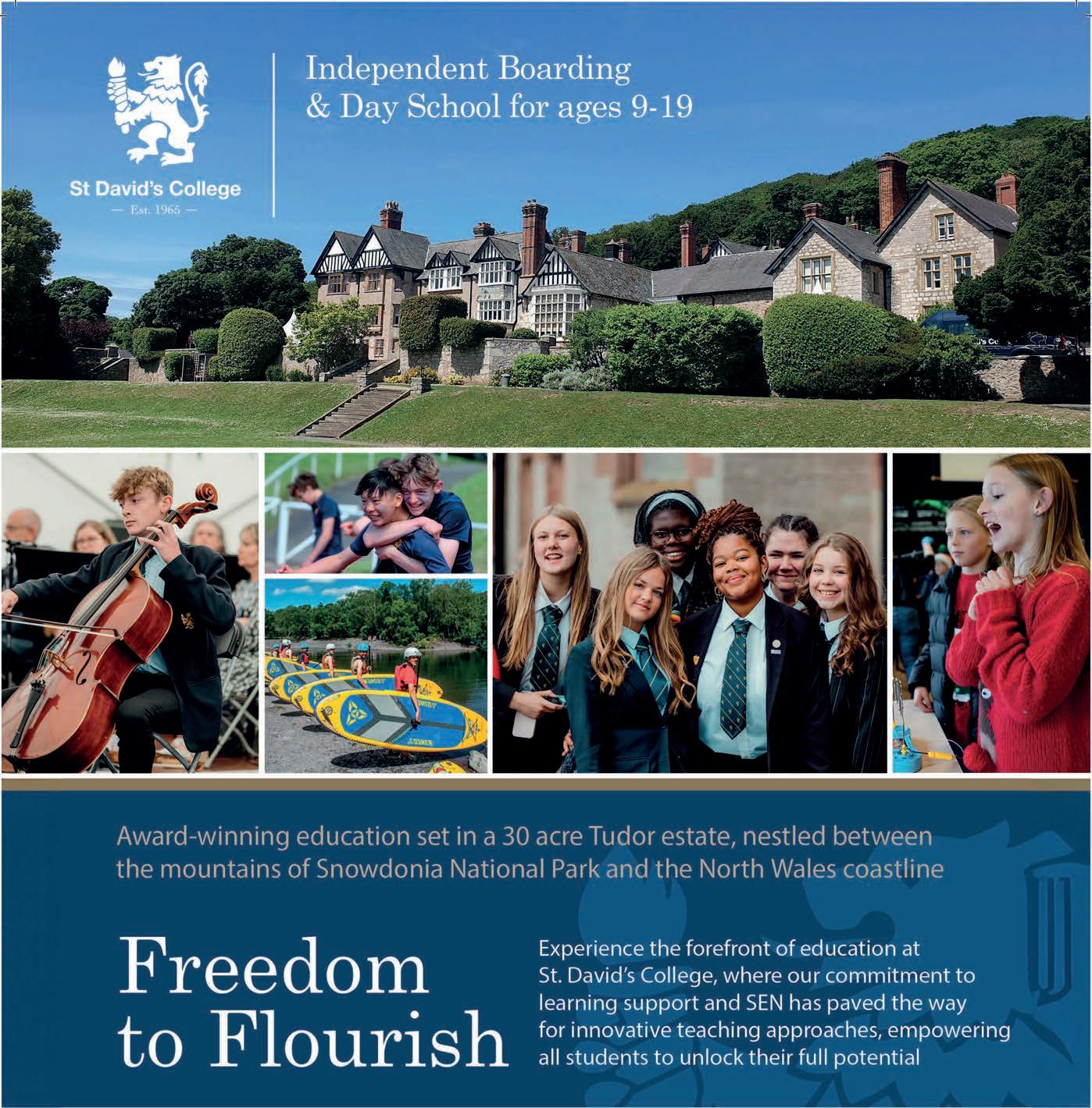
Excellence Scholarships available for September 2026 entry - apply now




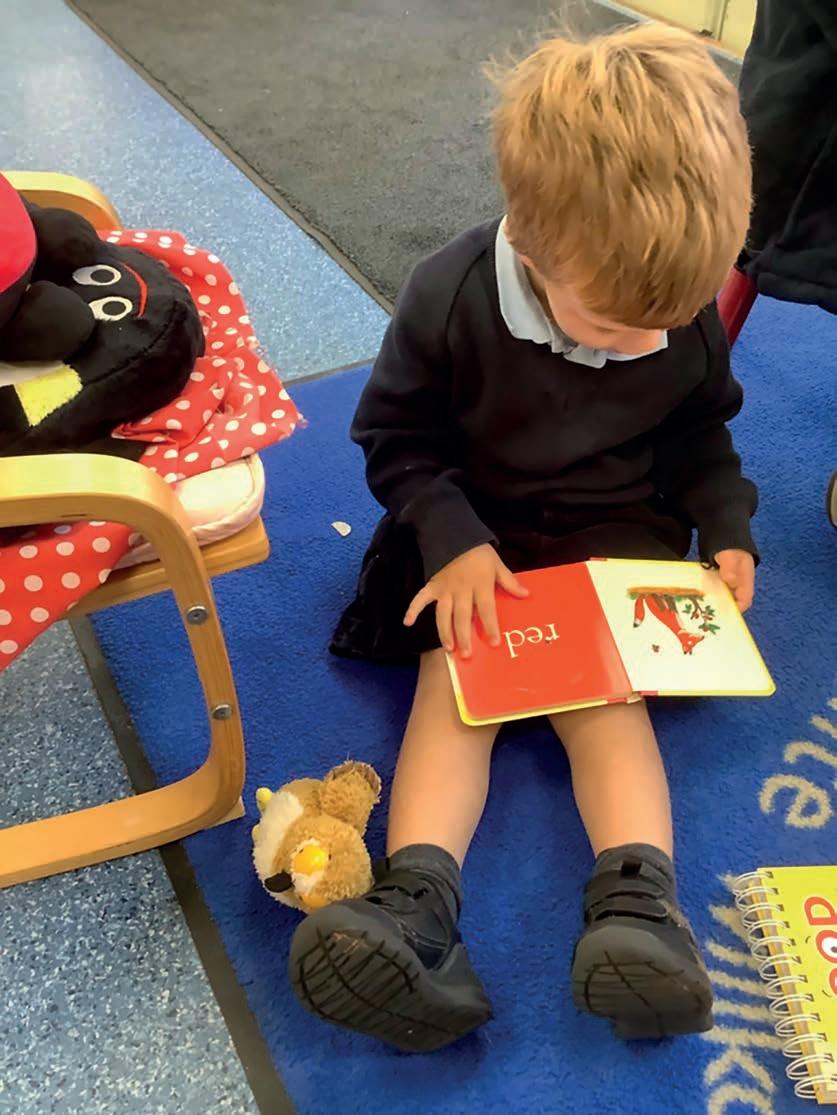
How can parents support children during their first few weeks of learning to read?
We ask five experts for their advice

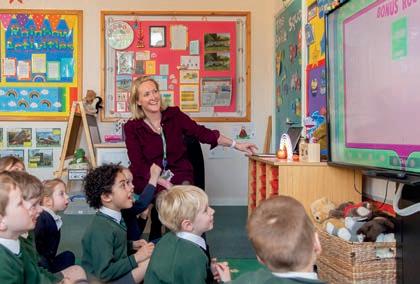

There are lots of fun and e ective ways to help children learn to read. At the heart of it are early learning principles like active play, exploration, and plenty of talking. Songs, nursery rhymes, and storytelling spark imagination while building language skills. Choose books with lots of rhyme and repetition – children love familiar patterns, and this helps them connect sounds with words.
Multisensory provision – magnetic letters on the fridge, drawing letters in sand, flour, or shaving foam – also helps, as children start see and use
while whole language
so
can
words naturally during play, learning that reading has purpose.
Phonics teaches the link between letters and sounds, so children can decode words, while whole language encourages them to see words in context and understand their meaning. At The Downs Malvern, we combine both, meeting children where they are and helping them grow.
Role models, shared reading, and peer support build fluency and confidence. By blending di erent strategies, you can support your child and nurture a real love of reading, which will boost self-belief and enthusiasm for years to come.

Allen,
Immersing your little ones in a literate environment sounds so scary, surrounded by tomes of literature from an early age but, essentially, it is about removing the fear from reading, making language and words fun, non-pressured and nonthreatening. Entering the worlds of the beautiful foolishness of Dr Seuss, the powerful simplicity of the Mr Men series, and the stunning adventures of Maurice Sendak (Where The Wild Things Are) and Eric Carle (The Very Hungry Caterpillar)


immerses our youngest readers and prereaders in the utter joy that is language, words and literature. Of course, it’s not just about books and the environment around us in signs, both words and pictures – it a ords us this opportunity of immersion, spending time and sparking interest in sometimes the most unlikely of places. Whatever your child’s interest –and it may be traditional tales or football, flu y animals or trains – accept it, celebrate it and enter that world together, collaboratively creating a passion for reading.
In the first few weeks of learning to read, parents play a vital role in supporting their child’s early reading journey. Snuggling up with books each day helps children feel relaxed and excited about stories. Share healthy reading habits by letting your child see you enjoying books too. Talk about the key parts of a book, discuss the front cover, title, author, and blurb and encourage your child to predict what the story might be about. Discuss the illustrations together, exploring what is happening in the pictures and how the characters might be feeling. Revisit the GPCs (grapheme-phoneme correspondences) taught in school to reinforce phonics learning. Once your child can blend sounds, begin sharing simple books with words, supporting them as they segment and blend to read. Always shower your child with praise. Keep reading time joyful and pressurefree hopefully building the foundation for a lifelong love of reading.



SNUGGLING UP WITH BOOKS EACH DAY helps children feel relaxed and excited about stories. Share healthy reading habits by letting YOUR CHILD SEE YOU ENJOYING BOOKS

Lucy Daviss, Head of Pre-Prep Abbot’s Hill School, Hemel Hempstead
In the first few weeks of learning to read, it’s crucial to make it a fun and positive experience for your child. Fostering a love of stories and creating a print-rich environment at home will further encourage your child to pick up books themselves. Reading together for pleasure in cosy areas or creating routines for reading will encourage enjoyment and quality time. Parents can also try labelling objects at home, perhaps with magnetic
letters on the fridge or using bath-toy letters to introduce phonic learning in a fun way.
Playing simple games such as ‘I spy’, where sounds rather than letter names are clues, can be played during school runs. Blending sound clues for an object can also help: ‘Can you find your b-oo-t-s? Can you use your s-p-oo-n?’ Encouraging your child to segment is also a really useful skill, for example: ‘What sounds can you hear in the word frog?’ Clapping the sounds can also help children to hear them separately.
The initial stages of learning to read are a magical time, and like a doorway opening into stories, knowledge and, most importantly, imagination. Parents play a vital role in nurturing this early journey. The best support often comes through warmth and patience: celebrating small successes, listening as your child sounds out words, and gently correcting pronunciation without applying any sense of pressure. Reading together each day, even for a few minutes, helps children associate books with comfort and joy. Talking about the pictures, making predictions, and asking what they think might happen on the next page – keeps reading fun and meaningful. Crucially, we should be role modelling this to our children as well by letting them see us enjoying books. When reading feels like a shared adventure rather than a task, confidence blossoms naturally, and the foundation for a lifelong love of reading is beautifully set.










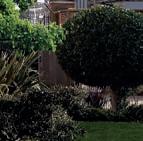



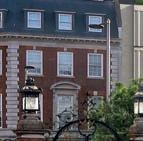
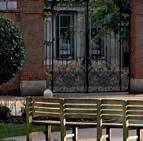
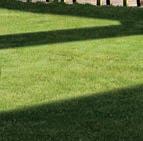



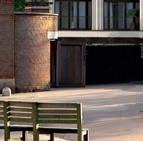
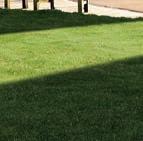








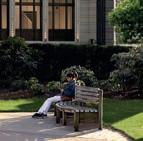



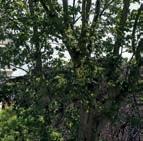





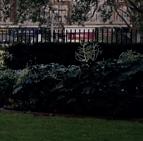

In London, few postcodes balance tradition and modernity quite like Kensington. Its leafy streets and elegant architecture are matched by an energy that comes from world-class culture, retail and education. For families, the appeal is even greater: here, some of the city’s nest schools sit within walking distance of parks and gardens that feel a world away from central London’s hectic pace.
Opposite the gates of Holland Park, a new development is shaping what family living in the capital can look like. Holland Park Gate is a collection of around 70 residences arranged across four distinct buildings, designed to pair generous living spaces with thoughtful services that support daily life.
What makes the project stand out is its understanding of the rhythm of family living. Lodha’s vision went beyond creating beautiful interiors; it was about building an environment where children can grow, parents can nd ease and everyday life feels both connected and calm. A concierge team can assist with everything from school runs to laundry, while resident spaces such as the cinema and family rooms bring people together. Even small
details, like coordinating multiple drop-o s, have been carefully considered.
Central to the development is a landscaped courtyard by acclaimed designer Andy Sturgeon, winner of nine Chelsea Flower Show gold medals and three ‘best in show’ awards. e gardens, planted with native species, o er a green centrepiece that encourages both biodiversity and social interaction. For families, it provides an everyday space to pause, play and connect with nature, which studies increasingly show supports children’s wellbeing and development.
Inside, the residences themselves are marked by space, light and cra smanship. Large living areas allow for gathering together or retreating
into quieter corners, with interiors nished to the exacting standards for which Lodha is known. Taken together, the homes feel less like apartments and more like sanctuaries designed around real family life.
Life at Holland Park Gate is further enriched by its location. Kensington High Street is just steps away, while London’s best museums, cultural institutions and private schools are close at hand. For international families, excellent transport connections mean Heathrow is less than 30 minutes away, while world-class universities such as Imperial College London and the Royal College of Art are nearby, ensuring opportunity at every stage of life.




Holland Park Gate is more than an address –it’s an invitation to a way of life where families are supported, daily routines feel e ortless and children grow up with nature, culture and community at their doorstep. In one of London’s most sought-a er neighbourhoods, it represents a new benchmark for modern family living.
hollandparkgate.com

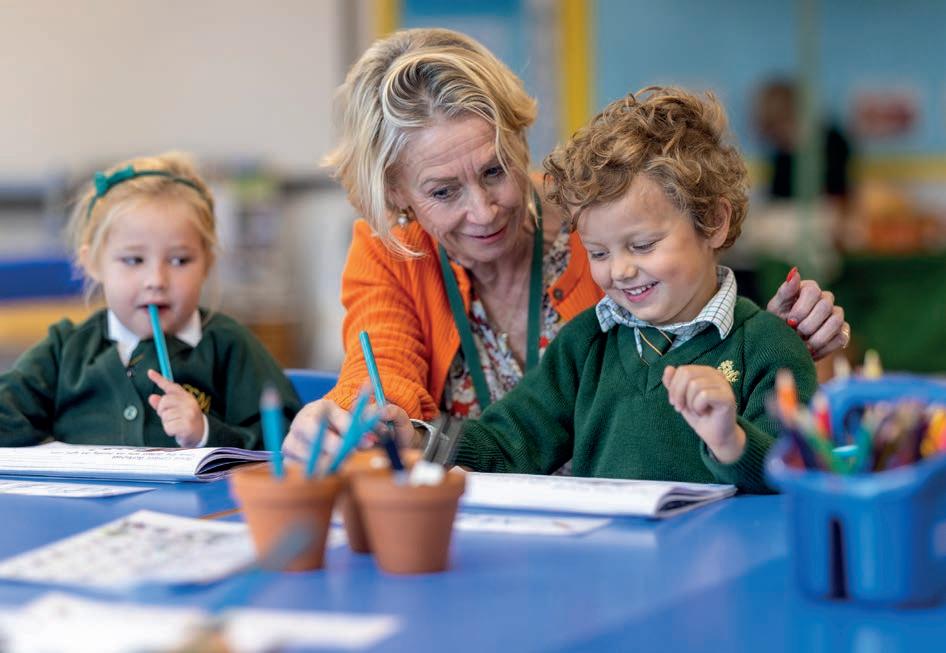
At a time when many schools are growing even larger, with sprawling campuses and hundreds of pupils per year group, it’s worth asking whether “bigger” really means “better”. For many families, the answer is no. Small schools offer something different – an environment where children are known, supported, and given the space to develop as individuals. At Forres Sandle Manor (FSM), we believe that being small is not a compromise but a strength, and that it offers distinct advantages for children’s learning, wellbeing, and growth.
In a small school environment, no child is overlooked. Teachers understand their pupils well – not just how they learn, but how they’re developing as individuals.
At FSM, the close attention we give enables us to celebrate each child’s strengths, nurture their interests, and notice when they need support. That sense of being recognised and encouraged gives pupils the confidence to thrive.
Small schools encourage connections across the whole community – among pupils, families, and staff. The “FSM Family” isn’t just a phrase, it’s an experience. From pre-prep through to the senior school, pupils learn within a close-knit community where kindness, respect, and inclusion are lived values. Parents are part of that journey too, creating a shared sense of belonging.
With smaller class sizes, learning can be more personalised. Pupils at FSM receive close attention and tailored support, helping them make strong academic progress while also developing
independence. Beyond the classroom, enrichment and co-curricular opportunities are equally accessible – children don’t get lost in the crowd, but instead are encouraged to participate and shine. In fact, small schools often provide a greater breadth of opportunity than might be expected. At FSM, pupils can choose from more than 100 co-curricular activities each week, ranging from sport, music, and drama to outdoor education and specialist clubs, such as F1 in schools and CREST Award. This inclusivity means that talents can be discovered and nurtured in unexpected places.
In a smaller school, children have more opportunities to lead. Leadership isn’t reserved for the few, but spread widely across the school. Whether it’s leading on the sports field, performing on stage, being part of the Eco Council, or mentoring younger pupils,
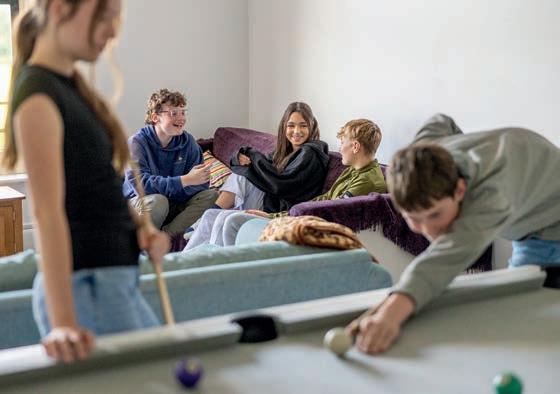
FSM students take on roles that build responsibility and character. These are experiences that stay with them for sixth form, university and beyond. The pressures on young people today are significant. Small schools are well placed to prioritise wellbeing and mental health, offering pastoral care that’s proactive and personal. At FSM, our size means that we can provide support for every concern identified. Crucially, we have the time and capacity, ensuring that children feel safe and understood. The visibility of staff and the accessibility of support make a tangible difference to how children experience daily life.
BEYOND THE CLASSROOM, ENRICHMENT AND co-curricular opportunities are equally accessible – children don’t get lost in the crowd, but instead are ENCOURAGED TO PARTICIPATE AND SHINE
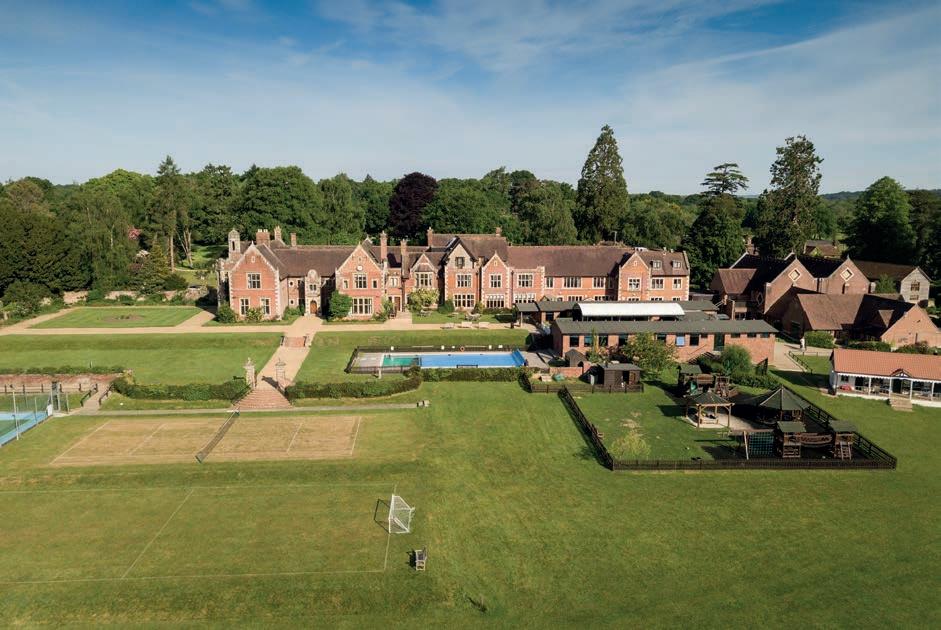
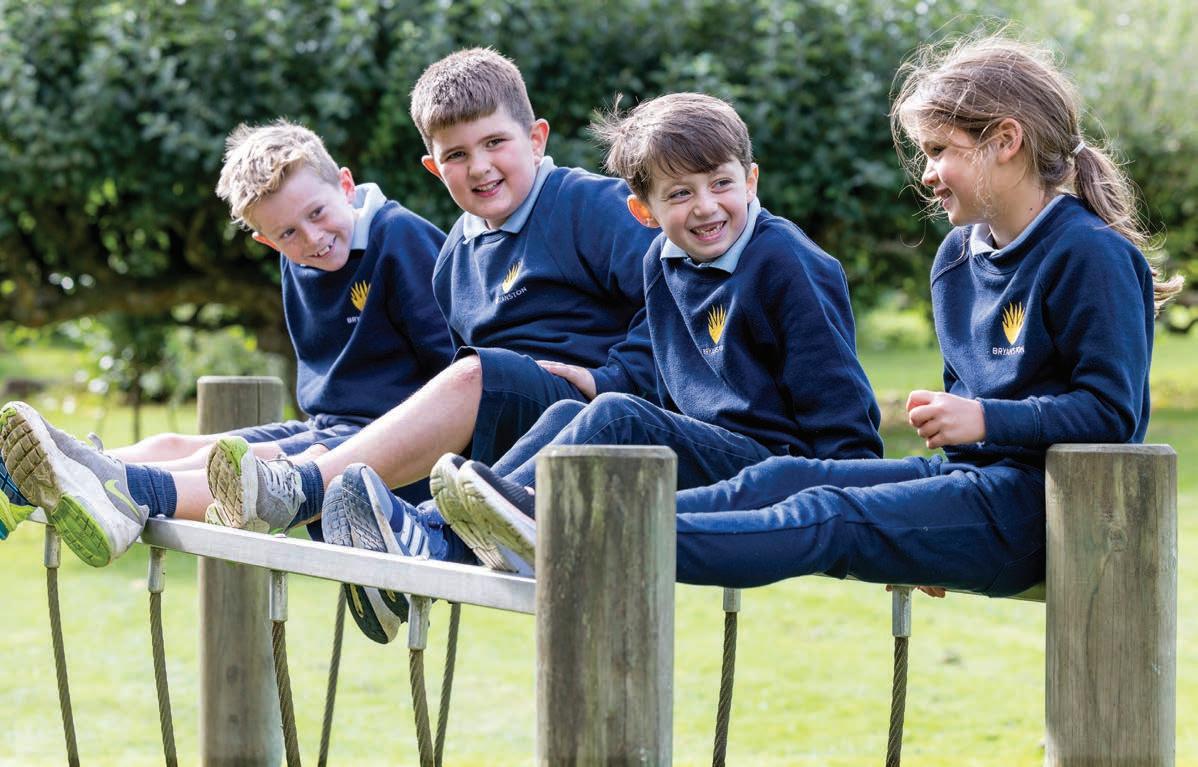
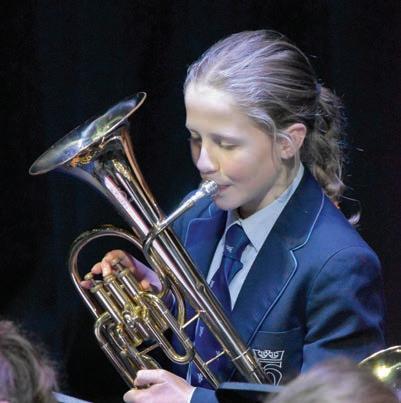




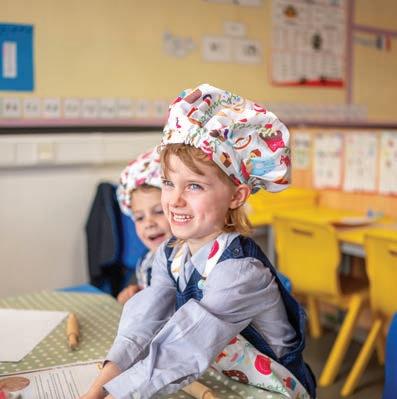








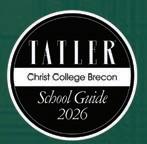



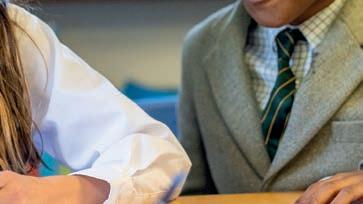


• Class sizes of less than 20 pupils allow teachers to focus on each child’s progress individually
• A total roll of less than 400 pupils (FSM: 228) creates an intimate, family-like atmosphere
• A high teacher-to-pupil ratio will ensure tailored academic support
• It builds a community where pupils, parents and sta know one another
• Children enjoy vast opportunities and take part in sport, music, drama, etc. without being lost in the crowd

Children here are prepared for life in the wider world, and the flexibility required
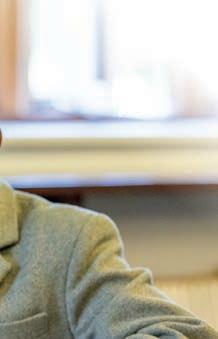

OUR SCALE IS OUR STRENGTH: IT ENABLES US TO combine academic ambition with personal care, and to give every child the space, encouragement, and OPPORTUNITIES THEY NEED TO SUCCEED
Being small doesn’t mean being limited. FSM pupils benefit from the best of both worlds: the support of a small community alongside opportunities that reach beyond the school gates.
With pupils from diverse backgrounds, a broad cocurricular programme, and a focus on resilience, FSM prepares children to thrive in today’s wider world.
In a rapidly changing society, children need to be flexible thinkers, problem solvers, and e ective communicators. FSM’s scale allows us to embed these skills across subjects and activities, ensuring that pupils leave us not only with strong academic foundations but with the confidence to navigate uncertainty and seize opportunity.
Equally, the partnership between school and home is stronger in a small setting. At FSM parents are active contributors to their child’s journey. Teachers know families well, communication is open, and decisions are shared. This sense of collaboration ensures that pupils benefit from consistency between school and home.
Small schools matter because they allow children to flourish as individuals while being part of something bigger than themselves. At Forres Sandle Manor, our scale is our strength: it enables us to combine academic ambition with personal care, and to give every child the space, encouragement, and opportunities they need to succeed.
In a sector often dominated by size, it’s small schools like FSM that demonstrate the power of education delivered thoughtfully, attentively, and with heart.




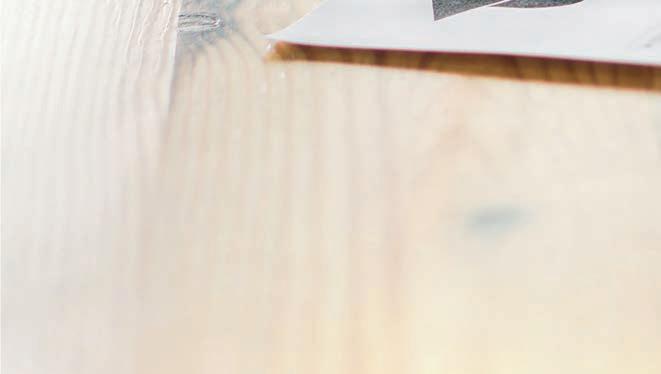



Nathaniel McCullagh, Managing Director of Simply Learning Tuition, looks at what bursaries and scholarships are available to families post-VAT



The independent school sector has been hit hard by the addition of VAT to fees, an increase in running costs, and the loss of Business Rates Relief. So, where does this leave families looking for a bursary to help to pay their children’s school fees?
Perhaps surprisingly, in rather good stead. Rather than turning o the taps, many schools have doubled down on their commitment to provide an independent education for all who would bene t from it, regardless of their ability to pay. None of the 20 or so schools we spoke to for our research have reduced their bursary provision, and many have actually increased it. At Kingswood School in Surrey, for example, Head Matthew Bryan, says: “ is year, we have 10 new 100% bursaries to children who might need and bene t from them.”
And there’s a good reason for this current philanthropy. “Schools need full and varied classrooms – bursaries give us a great lever to do this,” says Dominic Mott, Head of Hurstpierpoint College in East Sussex.
Data from the Independent Schools Council’s 2025 census backs up what schools have told us. It shows a rise in total fee assistance to around £1.5bn – an 11.5% increase on the prior year – with almost three-quarters of that (£1.1bn+) provided directly by schools. And the average means-tested bursary rose to about £13,852 a year (up 7.3% from 2024).
At face value, this data seems like an indication that schools increased their headline level of fee assistance in the rst year of VAT but it’s worth noting that these gures more e ectively relate to the year prior to the introduction of the VAT charge in January 2025.
ere are some clear trends, however; schools are managing their bursary provision more e ciently, with fewer 100% awards, and more 40-50% awards geared at helping a greater number of students. According to Alison Melrose, Headmistress of Cameron Vale School in Chelsea, “Schools are also reducing bursary lists by removing previous historical ‘handshake’ agreements and ensuring money is only going to those in need and weaning families o the support over time – 10% less each year for example –to ensure that the money is being spent only when it really needs to be.”
MANY SCHOOLS HAVE DOUBLED DOWN ON their commitment to provide an independent education for all who would benefit from it, REGARDLESS OF THEIR ABILITY TO PAY
SO, HOW SHOULD PARENTS APPLY FOR A BURSARY? Calmly; the best advice is to not be scared. Remember, that schools want bursary students and HAVE FUNDS TO SUPPORT THEM
All the schools we spoke to have reported a rise in the number of bursary applications, and in many cases, these are being prioritised for existing students, particularly in years 11 and 13, to get them through exams. And there’s no doubt that larger, older schools with deeper co ers have been better able to weather the current headwinds. “Schools with long-standing endowments like Rugby have been fortunate to maintain their o erings, while others have had to make di cult choices,” says Laura Bursey Faulkner, Deputy Head (Admissions & Marketing) at Rugby School.
Across the board, supporting existing students is the priority. Vicki Hoad, Fees Clark at Worth School explains, “We absolutely prioritise supporting current Worth students. It really helps if families can contribute in some way, so that we’re not providing a 100% bursary. We want to keep class numbers high and will favour a bursary application who’s able to contribute to the fees. We also look out for children who will add something special to the school community.”
Schools source bursary funds in di erent ways, some from fees, some from endowments and others through support from larger trusts (such as Heath eld School, which has just secured £1.5m from the Julia Rausing Trust).
So, how should parents apply for a bursary? Calmly; the best advice is to not be scared. Remember that schools want
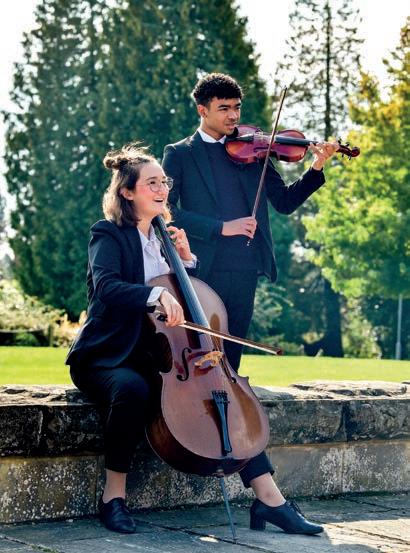
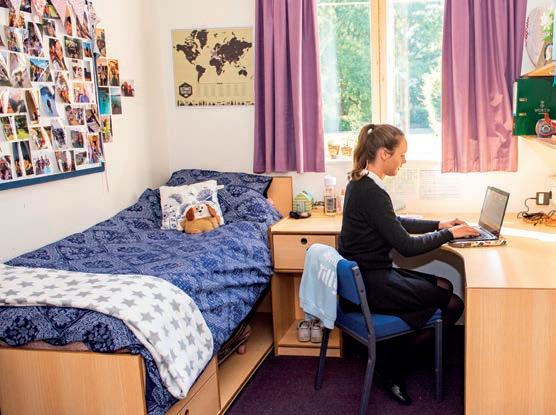


bursary students and have funds to support them. Bursaries don’t have to be paid back, and you’re treated in the same way as other families at school.
You should start your research early in year four or ve for a move at 11+ (many families are inclined to prioritise a move to fee-paying schools at the point of transitioning to seniorschool level). Check each school’s published bursary policy. Be sure that their current provision will meet your needs – many give application deadlines and indicative income thresholds, but exact decisions are always individually assessed. Bursary o ers change frequently, so check school websites carefully for updates – Christ’s Hospital, for example, has expanded its bursary to day students for the rst time and Bolton school has launched a new bursary scheme to provide a third of all new students with a bursary (the school raised more than £500,000 in summer 2025).



Children
of all backgrounds will benefit from the sense of community in a supportive independent school
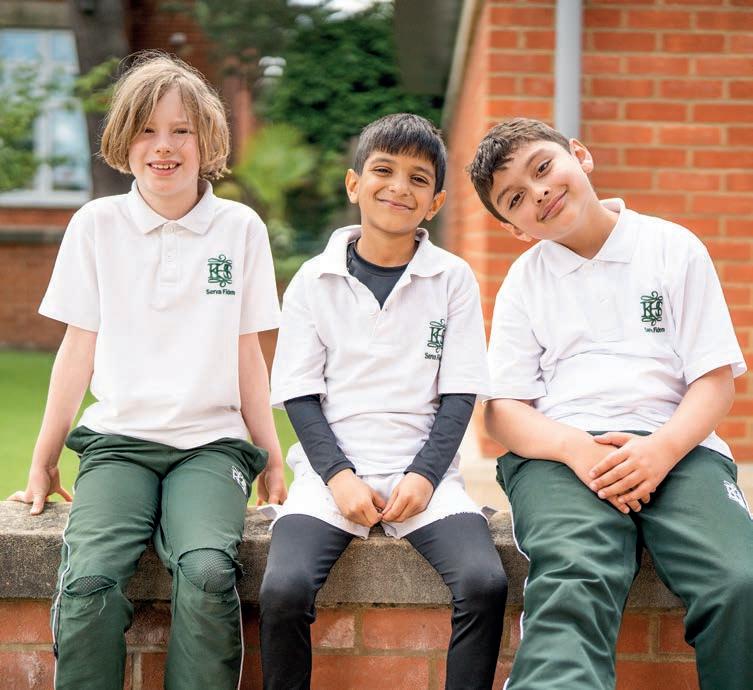
DON’T CONFLATE SCHOLARSHIPS WITH fee remission. Apply for both where possible: scholarships open doors on sporting, academic or artistic merit; BURSARIES OFFER AFFORDABILITY
As soon as you’ve decided on a couple of schools, you can then separately make an application for a bursary, or a scholarship, or both.
Don’t conflate scholarships with fee remission. Apply for both where possible: scholarships open doors on sporting, academic or artistic merit; bursaries address affordability. Some schools such as Rugby and Hurstpierpoint require children to be awarded a scholarship before they can be considered for a bursary. The majority do not. Bursaries are means tested and provide financial support for families who struggle to pay school fees. They range from a contribution to a full remit of fees for the child’s lifetime at that school.
Match your needs with the school – glossier schools may offer a full bursary but might not provide the community that your child would thrive in. Smaller schools may offer smaller bursaries but have a more down-to-earth demographic where the difference in financial background in the pupil cohort might be less marked. Just be aware that smaller schools may be riskier partners for longterm bursary commitments because VAT and related cost pressures have hit thin-margin day schools hardest.
The assessment process is often delegated to an external company, who will analyse a family’s income and assets. Parents don’t have to fulfil a particular income limit, but rather the whole financial picture is taken into
How to increase your chances of financial assistance success:
• Offer to pay half, or as much of the fees as you’re able – from a school’s perspective, half of one fee paying child is better than none
• Also consider scholarships –which are given for unique and sometimes unusual talents (Christ’s Hospital has a scholarship for students living on the Isle of Wight, at Harrow School, students who have lived in nine London boroughs for more than two years may be eligible for help from the John Lyons Charity)
• As well as applying directly through the school, you can also apply to an Education Trust. See The Education Trusts’ Forum (Scottish, Armed Forces, single parent, Catholic)
• If you can’t get a bursary, be creative in your approach – your school may offer other options, such as monthly payments, which could help manage cashflow.
consideration. Wealthy grandparents will not be asked to contribute (unless they’re legal guardians) but you’re unlikely to be successful if you own a Gainsborough or supercar. Second properties, cars and divorce complicate applications but the assessors are well able to identify genuine need and decide how much financial support should be offered.
Our advice is simply; if your son or daughter is academically able and confident and will benefit from the education, sense of community and other benefits of an independent education, don’t let the cost, or concerns about other students’ wealth, hold you back. I know of parents who sent their son to a leading London prep school and then Eton on full bursaries all the way through. He found that there were many other boys in his position and the few who holidayed on yachts just invited him along and paid the bill. No one stood out as being particularly different; but all benefited from the friendship, sports and world-class education. As Dominic Mott says, “At school everyone wears a uniform or sports kit, it’s actually hard to spot a bursary child.”
Schools are happy to discuss your application at any stage – the earlier the better – but if you would like advice ahead of approaching schools there are many expert professionals available to help.
KATIE HUGHES looks at the alternative options available to the 11+ examinations

ALL-THROUGH INDEPENDENT SCHOOLS EDUCATE children in both primary and secondary years. And because many have students from two to three years old right through to the age of 18, THEIR EXISTING STUDENTS CAN OFTEN SIDESTEP THE 11+


An umbrella term for tests taken by 10 and 11 year olds, the 11+ is commonly part of the year seven or deferred year nine entry process for independent senior schools. And while it sees potential pupils tested on their skills in maths and English, along with verbal and non-verbal reasoning, it can take on di erent forms for di erent schools.
e pressure for pupils involved in this testing process is something that some parents are preferring to spare their o spring. And the good news is that not every route into senior school depends on it.
So, what are the alternative options?
All-through independent schools educate children in both primary and secondary years. Some also o er nursery provision. And, because many have pupils from two or three years old right through to the age of 18, their existing students can o en sidestep the 11+.
Take Mill eld in Somerset, where 90% of the school’s prep intake goes on to study at its senior school: a transition that doesn’t hang on the success of 11+ tests but does demand a minimum standard from pupils.
Mill eld’s Director of Admissions, Rosie White, explains, “Entry to our senior school is usually automatic for our prep pupils, subject to satisfactory behaviour and their ability to access the curriculum.”
Dulwich Prep & Senior, which educates boys aged from two to 16, o ers similarly seamless transitions, with progression from its prep to its senior school dependent only on a record of good behaviour. Not a typical all-through model, it also prides itself on nding the right senior option for each child.
Deputy Head Ed Matten says, “We o er the choice of staying at Dulwich Prep & Senior to GCSE, in addition to leaving for a broad variety of senior-school destinations”.
is year, more than 5,000 pupils from more than 100 UK schools studied for the International Baccalaureate (IB) Diploma: a highly respected alternative to A-levels and the culmination of a wider IB programme for three to 19 year olds
Among those o ering the IB in the UK are ACS International Schools in Cobham, Egham and Hillingdon, none of which uses traditional 11+ tests to determine entry (and all of which are allthrough schools).
“Broadly selective schools like ours eliminate the reliance on a single entrance exam,” says Hazel Kay, Director of Marketing, Development ▲
and Admissions at ACS. “Instead, our application process takes a holistic approach, which includes reviewing school records, teacher references, a student questionnaire, and subject test scores.”
Also o ering IB and not expecting would-be pupils to sit the 11+, is London’s Southbank International School. Its admissions team says, “With applicants coming from educational systems all over the world, there are no suitable standardised admissions examinations.”
In place of exams, applicants need to show evidence of above-average academic ability and the attributes needed for IB study, not least interpersonal and self-discipline skills.
Many independent senior schools that o er the UK curriculum also bypass 11+ tests for new pupils or minimise reliance on them.
One is King’s Bruton in Somerset, which makes o ers to pupils based on interviews with the headmaster, along with school reports and feedback. Predicted exam results are used for class setting and the school is proud of what it describes as “outstanding GCSE, A-level and BTEC results,” with most pupils going on to their rst choice of university.
Another is Seaford College in West Sussex, which advertises itself as “inclusive, nonelitist and academically non-selective”. Like many of its counterparts, Seaford draws on ISEB Common Pre-Tests taken in year six (standardised online tests) to make sure potential pupils can access the curriculum. And it celebrates numerous examples of academic excellence.
Finally, for a school that goes a step further,
“A common misconception is that broadly-selective (or non-selective) schools are less academic. In reality, they cater to a wide range of academic abilities while providing the framework for students to achieve at the highest level.



“They also o er a less stressful admissions process, which helps to alleviate pressure on both students and parents. And they usually o er a variety of academic programmes. This inclusive ethos helps students to develop cultural understanding and empathy; skills that are increasingly important in a globalised society.”
ROBERT HARRISON, DIRECTOR OF EDUCATION AND
INTEGRATED TECHNOLOGY, ACS INTERNATIONAL SCHOOLS
THIS YEAR MORE THAN 5,000 PUPILS from more than 100 UK schools studied for the International Baccalaureate Diploma: a HIGHLY RESPECTED ALTERNATIVE TO GCSES
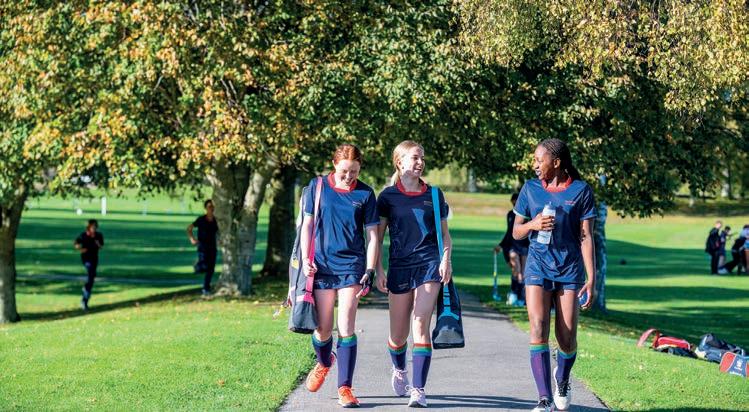


with no entrance exams and an environment in which children grow in a ‘free-range’ environment, parents can take a look at Summerhill in Su olk. Here, pupils may prepare for and sit GCSEs or concentrate on other passions, such as art, woodwork, science or music.
But whatever route parents and pupils decide to take into independent senior school, it’s clear that the 11+ is just one of them.
FIVE MORE INDEPENDENT SENIOR SCHOOLS THAT DON’T DEPEND ON THE 11+
• Hurst Lodge, Yateley
• Shoreham College, West Sussex
• Bede’s School, East Sussex
• King’s School, Plymouth
• Huddersfield Grammar School




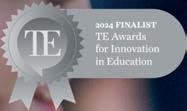

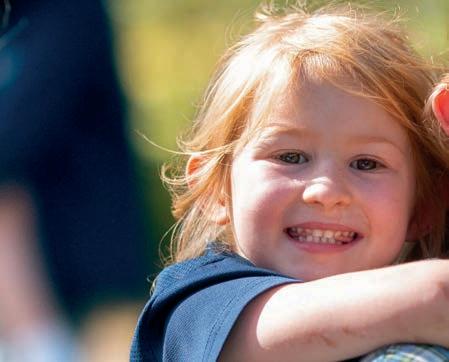

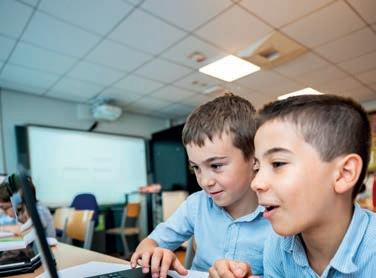


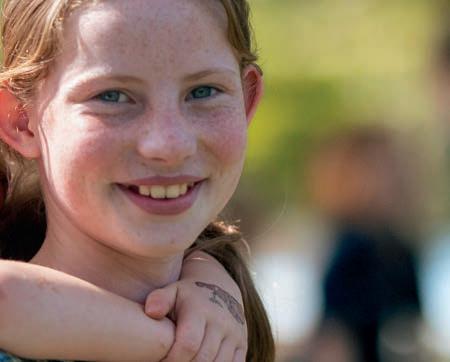











Roedean School, East Sussex, a BSA-recognised Sleep Champion, shares its secrets to achieving good-quality boarding-house slumber
Good sleep is the foundation for health, resilience and learning. Recognising its central role in the lives of its students, Roedean School has taken significant steps to review, support and improve the sleep habits of its boarding community. The school’s work in this area has earned recognition through the Boarding Schools’ Association (BSA) Sleep Champions scheme, which highlights schools that demonstrate a strong commitment to fostering healthy sleep environments for pupils.
The Sleep Champions programme requires schools to undergo a rigorous audit of sleep practices, from boardinghouse routines and use of technology to awareness campaigns and wellbeing strategies. At Roedean, this initiative was led by Deputy Housemistress Joan Arnall, whose professional background includes working with the Alzheimer’s Society, and Olivia Waller, Senior Boarding Mistress. “We wanted to ensure that our pupils and our staff were given the tools and awareness they need to make healthy choices,” explained Ms Waller.
There were two reasons for conducting a full sleep audit. First, the school wanted to investigate the impact of screen time, particularly late at night, on pupils’ ability to get quality rest. “We know that the blue light from screens interferes with melatonin production, delaying sleep onset,” said Ms Waller. “The survey confirmed that both pupils and staff were guilty of logging on late, either for school work, socialising across time zones, or simply scrolling.”
Second, the school recognised the crucial link between mental health and sleep. Many of Roedean’s boarding staff are Mental Health First Aid trained and understand how poor sleep undermines cognitive function, mood and resilience. The audit also paid attention to specific challenges facing boarders, such as jetlag after long-haul


THE SLEEP CHAMPIONS PROGRAMME REQUIRES schools to undergo a rigorous audit of sleep practices, from boarding-house routines and use of technology to AWARENESS CAMPAIGNS AND WELLBEING STRATEGIES
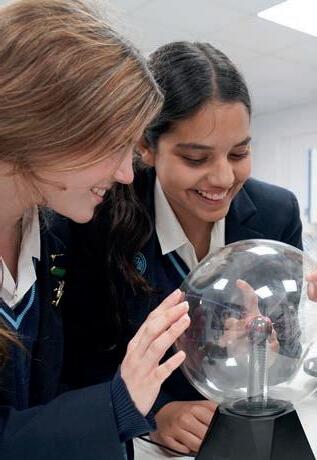
11-18 Scholarships
registrar@fhs-sw1.org.uk www.fhs-sw1.org.uk 020 7730 2971
registrar@fhs-nw1.org.uk www.fhs-nw1.org.uk 020 7723 0176 LEADING
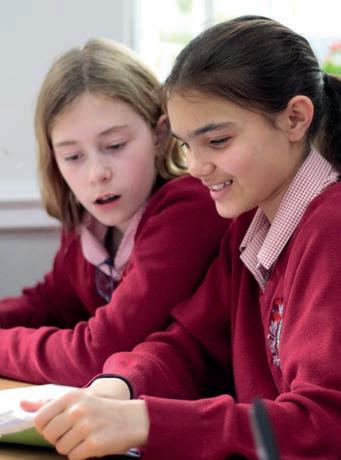
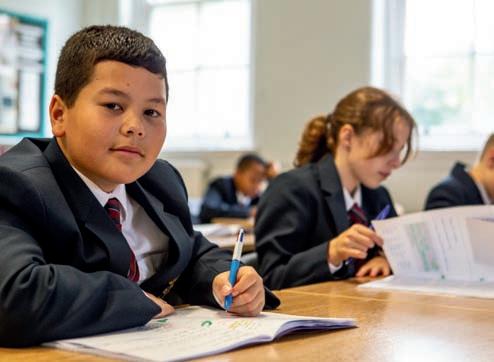
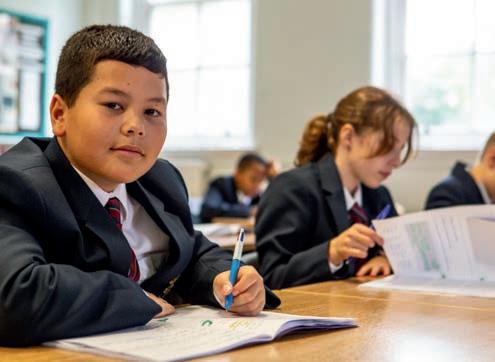




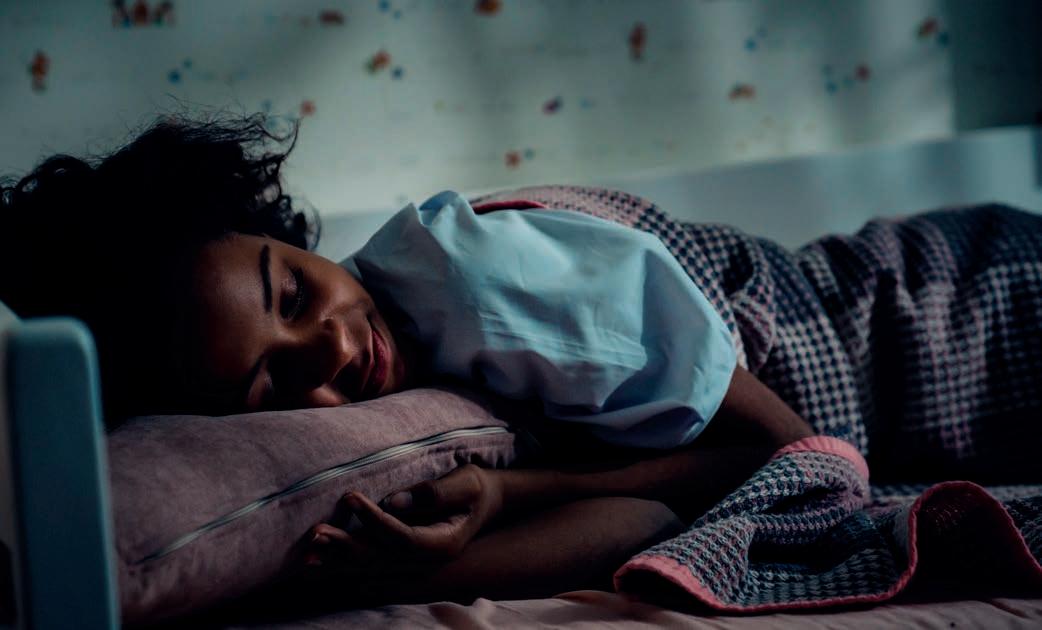
flights, and the particular difficulties some neurodiverse pupils face in establishing regular sleep patterns. The audit revealed that late-night screen time was the enemy of healthy sleep. Pupils were using screens too late, while staff set a poor example by replying to emails well past bedtime. “It became obvious that we needed to change our culture around rest,” said Ms Waller.
The outcome of the audit has seen some really positive ongoing changes at Roedean. These include:
• Houses are now being encouraged to create tech-free spaces for boarders to use in the evenings – House 2, for example, now has a Meaningful Escapism room.
• The house mistress team put together a tech review survey that all boarders and boarding parents were invited to respond to. Data and comments from that were analysed and a current review of tech privileges is happening.
• There’s now an increased focus in houses on activities and provision that promote wellbeing, such as yoga and morning and evening swimming sessions. The houses have brought in fruit teas too, which have less sugar than other pre-bedtime drinks that have previously been available.
QUALITY SLEEP IMPROVES ATTENTION, memory, creativity, and physical health. For young people balancing the transition to boarding life, THE BENEFITS ARE EVEN MORE PROFOUND
• Staff now practise what they preach and aren’t to be seen working on a computer late at night.
• Boarding and the health centre work closer together to provide educational and healthcare outlets for boarders on a variety of topics, sleep being one of them. Sleep hygiene was even made topic of the month in summer 2025, ensuring all pupils engaged with it.
The findings mirror worldwide concerns that excessive screen time and disrupted sleep are issues affecting teenagers and adults alike. Roedean’s leadership in this area demonstrates both a proactive response to global trends and a commitment to ensuring pupils are being supported in every aspect of their wellbeing.
Quality sleep improves attention, memory, creativity, and physical health. For young people balancing their academic work, sport, friendships, and the transition to boarding life, the benefits are even more profound. Roedean’s engagement with the BSA Sleep Champions programme reflects the school’s holistic ethos – to nurture mind, body and spirit. By embedding healthy habits into daily routines, the school is equipping pupils with lifelong strategies for success.
1 Stick to a routine – go to bed and wake up at the same time every day.
2 Create a calm environment – keep bedrooms cool, dark, and quiet.
3 Limit screen use before bed –switch off all devices at least an hour before sleep.
4 Choose relaxing activities in the evening – such as reading, listening to music or gentle stretching exercises, like yoga.
5 Watch caffeine and sugar intake – avoid stimulants such as tea and coffee after mid-afternoon.
6 Exercise regularly – but aim to finish vigorous activity a few hours before bedtime.
7 Don’t work from your bed – keep that space reserved for rest and relaxation only.
8 Try mindful practices – such as deep breathing or journalling to wind down.
9 Address jetlag gently - with gradual adjustments to bedtime after long-haul travel.
10 Lead by example - adults and peers modelling good habits encourage the same in others.
Peter Thackrey, Deputy Head, Pastoral, at Bedales, explains that the school’s phone policy – which is grounded in Bedalian values – avoids a total ban
At Bedales, we responded to the February 2024 government guidance on mobile phones in schools with a characteristically Bedalian approach. While the guidance aligned with our ethos, we wanted to implement it in a way that worked for our whole community. At the time, only Block 3 (year nine) students were required to hand in their phones during the school day.
We began planning for a revised policy to launch in September 2024, starting with discussions among houseparents and the School Council, which includes student representatives from all year groups. There was broad agreement that reducing daytime phone use would benefit students. It was also agreed that the existing Block 3 policy could naturally extend upward year by year, covering Block 4 (year 10) by September 2025.
However, staff felt strongly that Block 5 (year 11) should
also hand in phones during the day starting in September 2024. Distractions in lessons – such as app notifications pinging and students relying on their phones instead of laptops – were becoming increasingly disruptive.
To support this shift, we invited campaigner Natasha Devon to speak to students about mobile phone use and social media. Her message echoed what staff had been saying, but her status as an external speaker gave it fresh impact. Following this, we held a whole-school symposium to decide next steps.
As a community, we agreed:
• Blocks 3 and 4 (years nine and 10): No mobile phones during the day.
• Block 5 (year 11): Phones allowed but must be kept out of sight and placed in designated phone boxes during lessons (a creative idea from James Welham, Head of Maths).
• Sixth form and staff: Phones permitted but must remain out of sight during the day.

During our September INSET, staff engaged in role plays to practise implementing the new policy, including how to handle situations where students refused to hand in their phones – Georgie Nugent, Head of Drama, gave a memorable performance!
True to Bedalian values, the aim wasn’t to ban phones outright but to disrupt the habit of constant checking. We wanted everyone to be more present and engaged with the rich academic, social, and co-curricular life of the school they’re part of.
This shift required practical adjustments. QR code usage around campus was reconsidered, and boarders –who now hand in all devices overnight – needed alarm clocks, watches, and pre-paid debit cards to replace the multifunctional phone.
The transition was smooth, thanks to the community’s hard work. Block 5 students reported improved focus and learning, while staff found themselves more present, no longer distracted by emails or messages en route to lunch. Sixth form students
appreciated retaining phone access, understanding the responsibility that came with it and embracing their role as models for younger peers.
Importantly, we allowed space for learning through experience. On Wednesday afternoons, when lessons end early and students retrieve their phones before the 5:30pm assembly, we noticed a return to habitual checking. These moments became opportunities for gentle reminders to engage with those around them instead.
Now, Blocks 3 to 5 hand in phones during the day and all devices overnight. Sixth formers and staff keep phones out of sight during the day. The impact has been overwhelmingly positive, fostering a more mindful and connected school environment. As students prepare to leave Bedales, they’re better equipped to manage their device use and habits independently.
Looking ahead, there’s growing interest from parents in extending overnight device hand-ins to the sixth form. It may be time for another whole-school symposium!
TRUE TO BEDALIAN VALUES, THE AIM wasn’t to ban phones outright but to disrupt the habit of constant checking. We wanted EVERYONE TO BE MORE ENGAGED
In contrast, Natalie Shaw, Vice Principal at Dame Allan’s Schools, outlines the reasoning behind their decision to implement a strict no-phones policy
At Dame Allan’s, we’re not antitechnology, and we’re certainly not anti-smartphone. The devices themselves are not the enemy. Used wisely, they can provide support, connection and information. The real problem lies in unregulated, unrestricted use – particularly among younger children who are not yet ready to manage the pressures that come with them.
Pupils in years seven to 11 have always been expected to keep their smartphones locked away during the school day, with no use permitted between 8.30am and 3:45pm. From September, we have gone further. Year seven pupils aren’t allowed to bring smartphones into school at all. They can use basic ‘brick phones’ for calls and texts at the start and end of the school day, but internet-enabled devices will be off limits. With strong parental support, this change is designed to encourage as smartphonefree a childhood as possible – at school and at home –with the restriction following pupils through to the end of year nine. Importantly, this doesn’t mean children are cut off from digital learning: all pupils use Chromebooks, with appropriate levels of web
access, in lessons and at home for research, homework and collaboration, giving them the benefits of technology without the downsides of unrestricted smartphone access.
We made this decision because the impact of smartphones on children’s wellbeing is undeniable. Our own pupil surveys show that sleep deprivation is rife, often driven by group chats that run into the early hours of the morning. Children simply don’t have the maturity to remove themselves from constant online conversation. Fear of missing out – FOMO – keeps them scrolling, replying and checking. The result is tired, distracted pupils whose concentration in lessons is compromised.
The issues extend beyond tiredness. Schools across the country deal daily with the fallout of online behaviour: bullying in group chats, exclusion games where children are repeatedly removed, racist language and inappropriate image sharing. These incidents are not only distressing for those involved but absorb huge amounts of staff time – time that should be spent on supporting pupils in more constructive ways.
For years, we’ve educated children on safe and responsible internet use. We’ve taught them about

YOUNG PEOPLE DESERVE TIME to grow without the constant pull of social media, the sleepless nights AND THE DIGITAL DRAMA
privacy settings, digital footprints and respectful behaviour online. But the reality is that education alone isn’t enough. The design of these devices – the notifications, the addictive features, the geotagging, the social comparison –overpowers the self-discipline of most 11, 12 and 13 year olds. They simply do not yet have the maturity to self-police their usage.
This isn’t a lone crusade by the school. Many parents have told us they wanted to hold off giving their children smartphones but felt pressured by the perception that ‘everyone else has one.’ Our policy gives families the confidence to resist that pressure. It creates a level playing field for children and
takes away the stigma of being ‘the only one without.’
We’re not saying children should never have smartphones. By year 10, most children are more mature, more confident and better placed to make conscious choices about how they use technology. But giving them unrestricted access too early sets them up to fail.
Young people deserve time to grow without the constant pull of social media, the sleepless nights and the digital drama. They need space for family, hobbies and friendships in the real world. That is what lies behind our stance: not banning, but pausing. A pause that gives children the chance to grow into themselves before they grow into their phones.

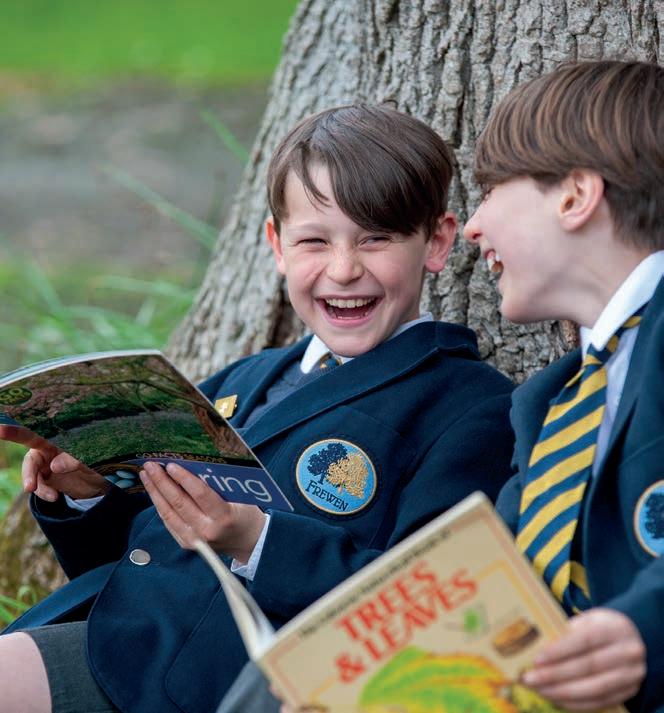
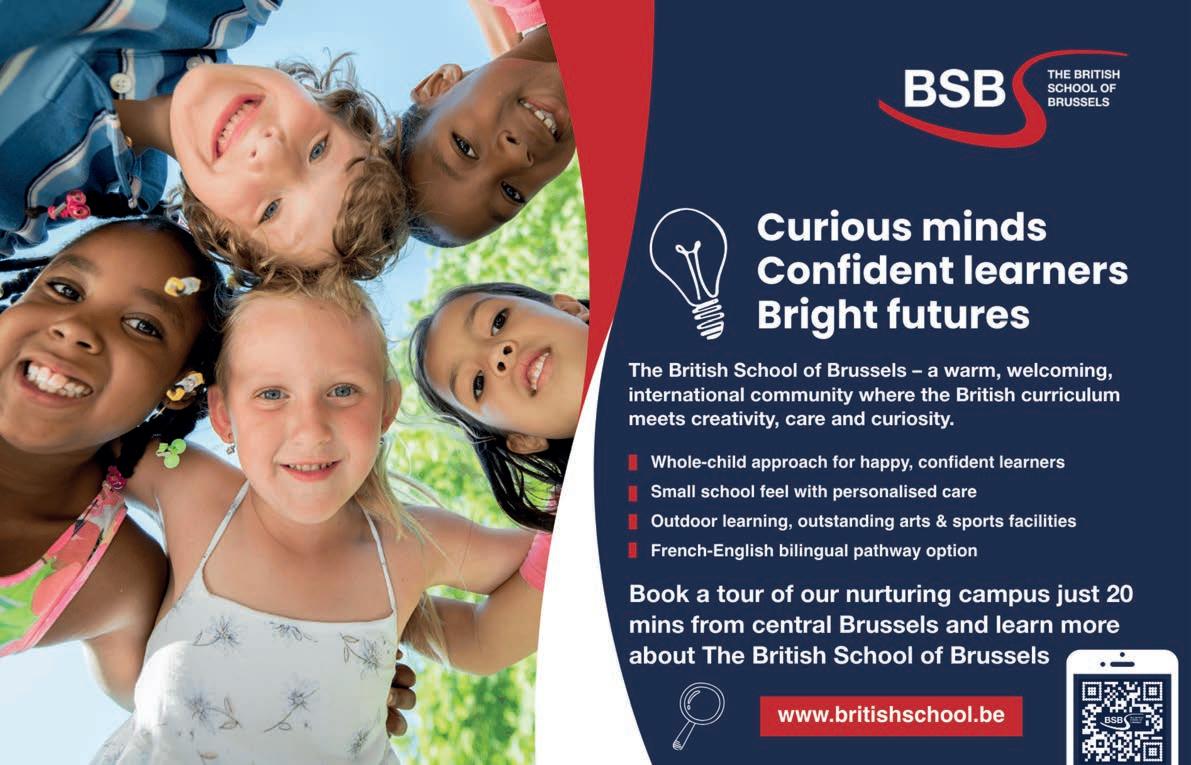
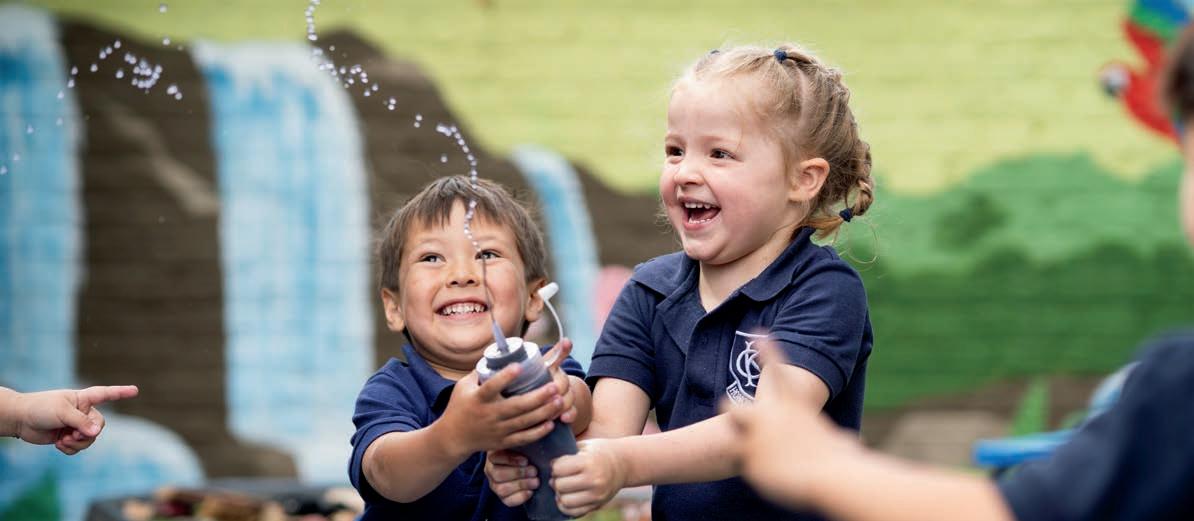






Nick Marcou, Senior Deputy Head (Academic) at Marymount International College explains the philosophy and benefits of the International Baccalaureate Diploma programme
SATS, GCSEs, A Levels, MYP, IB… it sometimes feels like education is just one long string of options (and acronyms!); and with each new option comes a fresh wave of questions.
What’s the difference? Which one is right for me? Do I need to take the same route as my friends? How will any of this actually help me in the future?
It can feel overwhelming. Apprenticeships, university, college – there are so many doors to choose from. And of course, behind every door is a different pathway, a different workload, and a different outcome. The big question that lingers for students (and often for parents, too) is: What’s the best choice?
The short answer is that there isn’t a one-size-fits-all path. But, if you want an option that is recognised globally, admired by universities and employers alike, and respected for both its academic depth and its ability to form wellrounded young adults… then you’re probably looking at the IB Diploma programme.
So, what even is the IB?
The International Baccalaureate, often called the IB, is more than just a qualification. It’s a philosophy of education that values breadth as much as depth. While A-levels, for example, require students to narrow their subject choices and ‘specialise’, the IB keeps the doors wide open. Students study six subjects, ranging from languages and sciences to
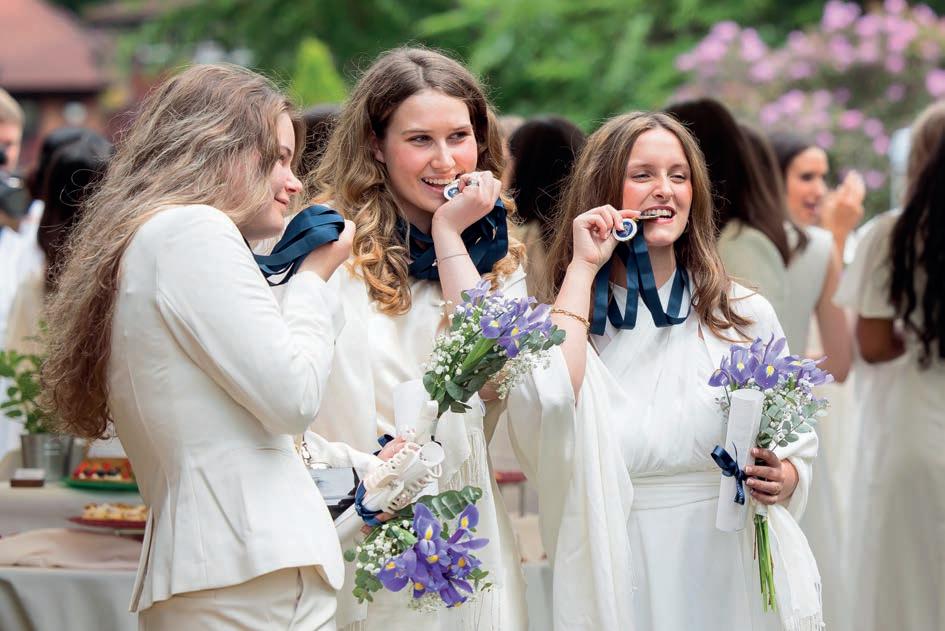

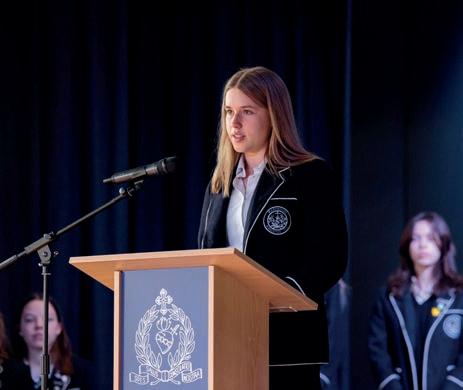
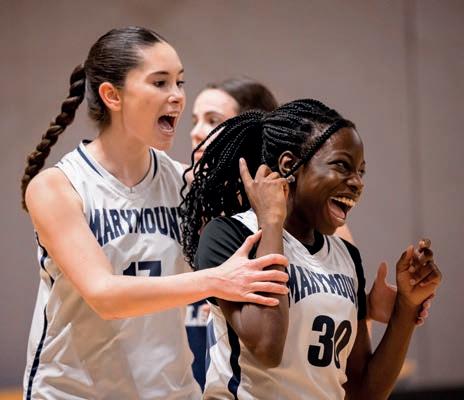
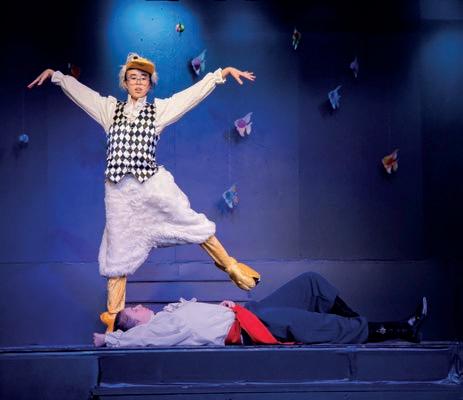
IT’S A PHILOSOPHY OF EDUCATION THAT VALUES breadth as well as depth. While A-levels, for example, require students to narrow their subject choices and ‘specialise’, THE IB KEEPS THE DOORS WIDE OPEN
mathematics and the arts, alongside three core elements: theory of knowledge (a course in critical thinking), the extended essay (a piece of independent research), and CAS (creativity, activity, service, which ensures students develop beyond the classroom).
This mix is what makes the IB so special. It’s rigorous, yes, but it’s also holistic. It doesn’t just prepare students to pass exams; it prepares them to think, to question, to collaborate, and to relate their learning to the world around them. That’s why it’s often referred to as the gold standard of education.
And universities know it. From Oxbridge to the Ivy League, admissions officers respect the IB because it signals that a student hasn’t just memorised facts but developed a critical and evaluative approach, learned resilience, become truly independent, and discovered a genuine love of learning.
At Marymount, we’re proud to be the only all-girls, IBonly school in the UK. For us, the IB isn’t just an option, it’s
our entire focus. And that focus delivers results. In 2025, our students achieved a 100% pass rate with an average score of 37 points, well above the global average of 31. These aren’t just numbers; they represent real young women achieving to their fullest potential, ready to step into the next stage of life with confidence.
But beyond the grades, what sets Marymount’s IB journey apart is the experience. Our students aren’t simply preparing for exams – they are learning how to think critically, act compassionately, and engage with the world around them. They graduate not only with a diploma, but with the mindset and skills to thrive in any university, career, or community they choose to join.
So, if you’ve ever wondered what the IB is and why it matters, here’s the short version: it’s an education that challenges you, supports you, and transforms you. And at Marymount, it’s what we do best.


Meet the students who are getting a headstart in the working world while continuing an independent-school education
At most boarding schools, weekends and free periods are reserved for sport, music, drama or catching up on prep. But at Bryanston School in Dorset, some pupils are adding another layer to their education – work. From portrait painting and modelling to TikTok content and hospitality shi s, these teenagers are combining the intensity of boarding school life with entrepreneurial ventures, gaining not only extra income but also valuable life skills.
While many of his peers are still asleep, 17-year-old Al e is o en found at his easel in Bryanston’s art department in the early hours. Shirt untucked and paint-splattered cords, he works quietly before lessons, adding careful strokes of vermilion to a portrait. “I don’t want to become an artist,” he says with quiet conviction. “I already am one.” at con dence is backed by experience. His rst commission came at just eight years old, followed by a piece accepted into the Royal Academy’s Summer Exhibition when he was 10. Now, portraits range from painting fellow pupils to sta members.





Boarding life gives Al e access to both the resources and inspiration he needs. His workspace stretches from the airy studios to his study-bedroom, where oils, brushes and art books are scattered across his desk. He o en paints friends and teachers, incorporating subtle symbolism into his portraits. His recent subject, Head Richard Jones, is painted with family photos, a football stress ball, and the keys to the school buggy in the background, giving us a glimpse into his life.
“My paintings are interpretations,” Al e explains. “ ey tell you a story about a person and their life.”
With university applications looming, he’s eyeing prestigious art schools such as UCL’s Slade and Edinburgh. anks to Bryanston’s exibility, he has already bypassed the need for a foundation year. Alongside his studies, he has a website where clients can commission work, combining his talent with entrepreneurship. For Al e, portrait painting isn’t just a hobby or a career in waiting; it’s already a profession.
While Al e captures faces on canvas, Marcus’s own face has caught the attention of international scouts. Recently signed as a
For many students, balancing schoolwork with a part-time job is challenge enough.
But for Otto, a Bryanston boarder, the weekend commute between lessons and London photoshoots has become a regular part of life.
It all began with British designer footwear company Grenson, where Otto first helped out behind the scenes before stepping in front of the camera as a model.
“That experience opened the door,” he explains. Soon afterwards, he was o ered paid opportunities through TikTok, turning what started as a summer side project into something more tangible.
Modelling appeals to Otto for its mix of creativity and connection. “I enjoy meeting interesting people and working in environments that feel di erent from school,” he says. For now, he hasn’t signed with an agency, preferring to keep things flexible while treating modelling as a part-
time pursuit. Most of his collaborations are with small brands, where payment comes in a mix of cash and clothing.
At Grenson, Otto modelled, assisted on shoots, and even spent time on the shop floor during the holidays. Social media is another crucial part of his work, posting on Instagram and TikTok not only promoting the brands he supports but also forging new collaborations.
Shoot days can be long, starting early and moving across several locations, yet social campaigns are easier to juggle remotely. “Balancing it with boarding school isn’t always simple,” Otto admits, “but brands are usually understanding.”
Though he’s not yet earning consistently, the prospect of building something sustainable motivates him. For now, the rewards go beyond money in the form of experience, clothes, and a real sense of independence.



Oli Davis, Aldin Hodzic and George Abel, all in the upper sixth at Bede’s, have launched the local gardening service The Three Tulips.
What started as a casual conversation between the three boys, who are all studying A-level Business, has taken root.
”I’ve always been interested in gardening and enjoyed it,” says George. ”We realised that with my interest, and by working as a collective, we could actually make it happen.”
A key moment, adds Aldin, was when Oli passed his driving test. ”We realised that meant we weren’t just limited to our parents driving us around; we could operate independently across a much larger area. With us living in di erent places, it suddenly opened up a much bigger potential market.”
Learning about market segmentation and market research, says Oli, ”gave us



the tools to properly identify our target customer”. The boys’ target customers are people who own property who might need a hand with their garden, typically an older demographic. They knew they needed social media to create engagement and have already launched on Instagram.
The hard work is starting to pay o . ”It’s all very new; we’ve just started out and have already completed two jobs, which we’re really pleased about,” says Oli. ”We’re very conscious of our school commitments, so for now, we only take on jobs on the weekends.”
Talented actress and fellow upper sixth former Ra has landed herself a role in upcoming horror film, The Caged. “I’ve been acting since I was five, which is crazy because it happened completely by accident! I went with a friend to an
audition for The Theory of Everything, thinking nothing of it, and I got the part. That’s how it all started! I signed with an agent and have been working ever since. Playing Claire in Miss Peregrine’s Home for Peculiar Children was amazing, and then, in 2022, I got to play my first lead role in Vesper
She has managed to balance her time on set with her studies. “The timing of my filming schedule is actually quite fortunate, as I’m currently deep into revision. Any downtime I have on set will be dedicated to studying! My teachers have been incredibly supportive, staying in close contact and providing me with revision materials.”
Ra hopes to continue to act professionally beyond Bede’s. “I hope to either go to drama school or start working straight away after I’ve finished my sixth form studies.”
“new face” with Storm Model Management, the 17 year old is preparing for a career that could take him from the school playing elds to catwalks in Milan and Paris.
Because he’s still under 18, Marcus’s modelling commitments are limited to meetings, test shoots, and training sessions. Even so, interest has come from some of the industry’s most recognisable names, including Elite and GQ. His potential has already been graded as “catwalk material,” and when he turns 18, opportunities for shows and commercial campaigns will open up.
For now, however, he remains grounded. “It’s exciting,” Marcus admits, “but school comes rst, for now.” Between agency meetings and photo shoots, he continues to focus on A-levels, with economics a possible degree path.
For Lauren, the journey into work began with something simple. She needed to fund a school trip. e idea of a part-time job was complicated by Bryanston’s rural location, but TikTok o ered a solution. She began posting light-hearted videos about boarding school life, and before long her channel had gathered a loyal audience. What started as a stopgap turned into a monetised venture that she manages alongside school commitments.
“Living in the middle of nowhere, it was di cult to nd a job,” Lauren explains. “So I turned to TikTok. I researched, experimented, and found my niche – boarding-school life.”



Her content, o en featuring friends and daily routines, has become a window into Bryanston, drawing thousands of views. Yet Lauren was also determined to gain practical work experience o ine. She reached out to the events team at a nearby stately home that doubles as a major events venue. ere she has worked behind bars, washed dishes, and supported sta during weddings and festivals. e dual roles of social media creator and hospitality worker might seem worlds apart, but Lauren sees them as complementary. “TikTok is self-expression, while working in catering is about teamwork and hard gra . Both teach me responsibility in di erent ways.”
Balancing schoolwork, content creation, and weekend shi s isn’t always easy. Late nights in the kitchen or long hours at events sometimes clash with the demands of A-levels. Yet Lauren thrives on the challenge, seeing it as preparation for the independence she’ll need beyond school. What began as a way to pay for one trip has evolved into a blend of digital entrepreneurship and real-world employment.
Bryanston has long been known for its creativity and individuality, and the stories of Al e, Marcus, Lauren and Otto re ect this ethos. e school’s exible approach allows pupils to explore their passions, whether in art studios, modelling agencies, or event venues, without losing sight of academic priorities.
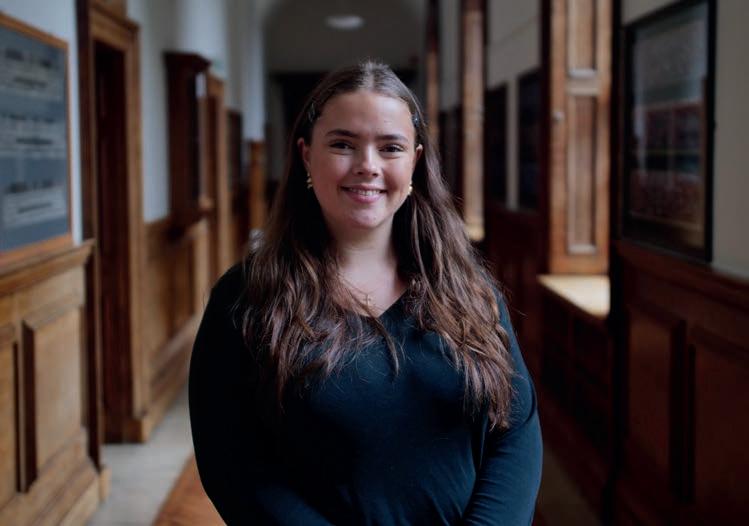


While many boarding pupils spend weekends on the sports eld or in rehearsal rooms, these students are also gaining rsthand experience of industries that demand resilience, self-discipline, and adaptability. e lessons they learn from dealing with clients, to brand management and teamwork, are as valuable as any classroom assignment.
As these pupils show, “earning while learning” isn’t simply about making some pocket money. It’s about independence, developing entrepreneurial skills, and preparing for life beyond school. For Al e, it’s the pursuit of art as vocation; for Marcus and Otto the potential launch of a modelling career or brand creation; and for Lauren, a blend of digital in uence and hands-on gra . Together, they illustrate how work, far from being a distraction, can enrich education.
THE SCHOOL’S FLEXIBLE APPROACH ALLOWS pupils to explore their passions, whether in art studios, modelling agencies, or event venues, without LOSING SIGHT OF ACADEMIC PRIORITIES


Bishop’s Stortford College partnerships’ programme earned it a well-deserved finalist spot in our awards campaign
The college’s Invite and Inspire programme is a distinctive, inclusive educational partnership initiative – which delivers UN Sustainable Development Goals 4, 10, 11 and 17 – is renowned for its breadth, creativity, and community focus. Unlike traditional outreach, it’s built on sustained collaboration and a commitment to reducing educational inequality through enriching, cocurricular experiences.
Spanning all age groups (from year one pupils to adults in care), its unique emphasis is on the creative and performing arts, where most outreach centres around literacy,
numeracy and STEM subjects. This focus fosters creativity, critical thinking, and emotional wellbeing.
The college has forged meaningful partnerships with more than 30 primary and seven secondary schools, delivering professional creative and performing arts workshops conducted by specialist staff in painting, creative writing, coding, design, and music.
These are supported by its own sixth formers, who gain leadership experience by mentoring young minds, while joint initiatives such as medical career days and artist-led workshops, foster shared learning.
Initially met with some scepticism, the
programme has earned trust through its positive impact, and places are now filled within 24 hours, based on the fantastic testimonials received from pupils, parents and staff alike. The college provides resources for students to take away with them, which further enhances their ongoing learning and enjoyment within the arts.
Aligned with UN SDGs 4, 10, 11, and 17, Invite and Inspire promotes equity, creativity, and lifelong learning opportunities for all, it’s the a model of a meaningful educational partnership. Invite and Inspire has now become a fully integrated part of school life, enriching the experiences of both students


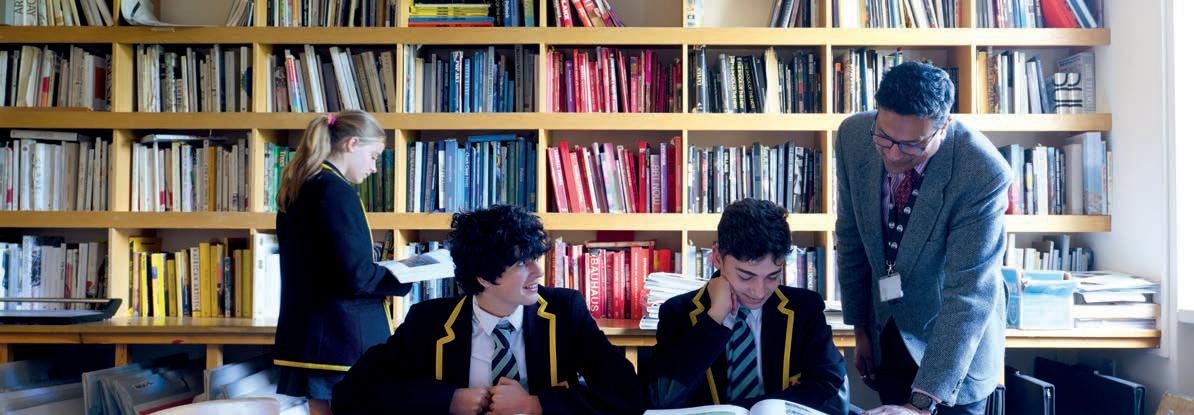

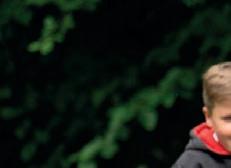
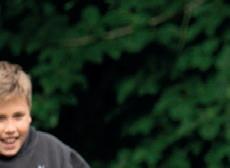
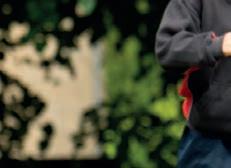

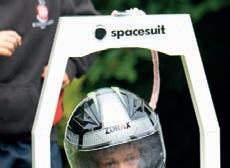
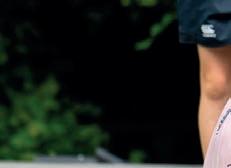



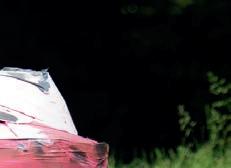
















A HIGHLIGHT THIS YEAR WAS THE Arts in Herts showcase, which brought together local students and adults FOR FIVE CREATIVE EVENTS
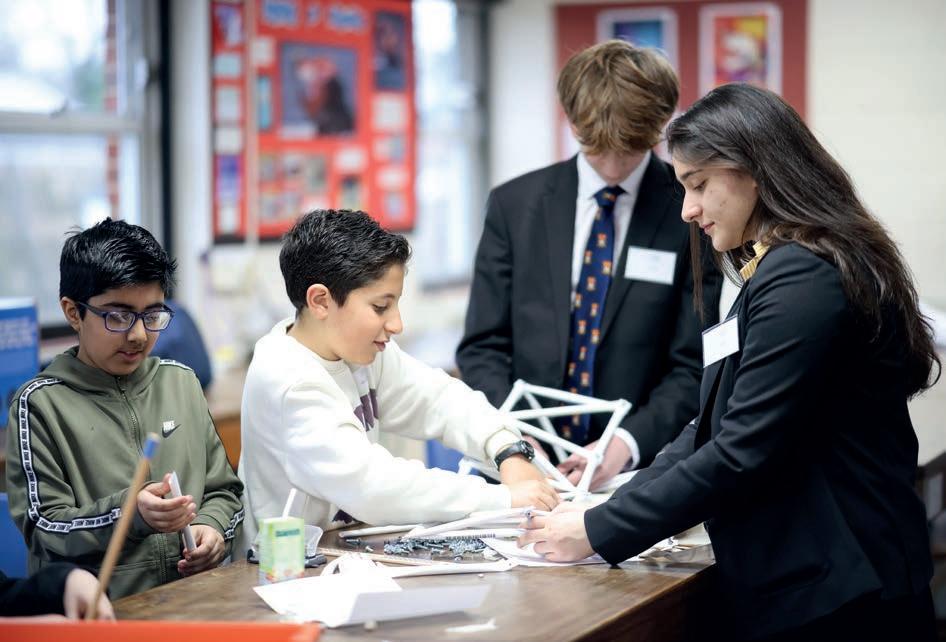
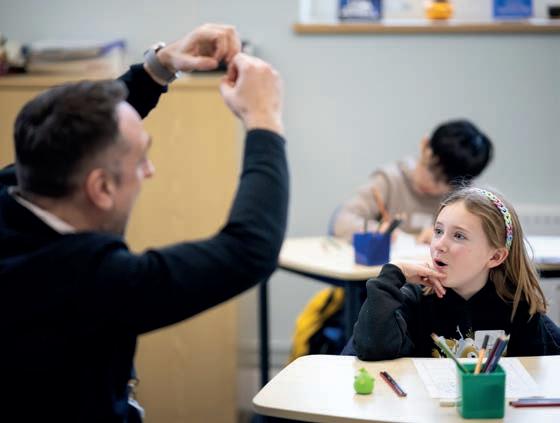
Invite and Inspire addresses gaps in enrichment provision
and the wider community. Sixth formers regularly lead Saturday workshops, gaining leadership skills while supporting younger pupils. A highlight this year was the Arts in Herts showcase, which brought together local students and adults for five creative events. These sessions, led by 26 student volunteers, offered drawing, painting, music, and photography workshops, which had a profound social impact, particularly for residents from local housing schemes. The college’s medical careers day, run in partnership with Operating Theatre Live, also stood out, offering students from multiple schools hands-on experience
in healthcare. These initiatives reflect its commitment to inclusive, co-curricular learning and demonstrate how educational partnerships have become a vibrant, embedded element of the school culture.
Invite and Inspire has enriched learning for more than 300 local students already, providing access to creative, co-curricular experiences often unavailable in mainstream education. Within the school, students gain leadership and mentoring experience by planning and delivering workshops, which helps develop their confidence, empathy, and communication skills. For partner
Data collected showed that the Invite and Inspire programme resulted in:
• Increased interest in subjects: 91.45%
• Increased confidence: 87.23%
• Beneficial interaction with older students: 98.9%
• Enjoyment of meeting other children: 87.1%
• Enjoyable activities and structure: 98.9%
• Enjoyment of learning new things: 100%
schools, the programme addresses gaps in enrichment provision, particularly for pupil premium students, through activities such as Forest School, coding, and the arts. In the community, intergenerational engagement – such as adult art workshops – has fostered social cohesion and wellbeing. By promoting creativity, collaboration, and critical thinking, the programme equips students with essential skills for success in the 21st century. It nurtures resilience, emotional intelligence, and a lifelong love of learning-preparing young people not just for exams, but for meaningful, connected lives in an ever-changing world.
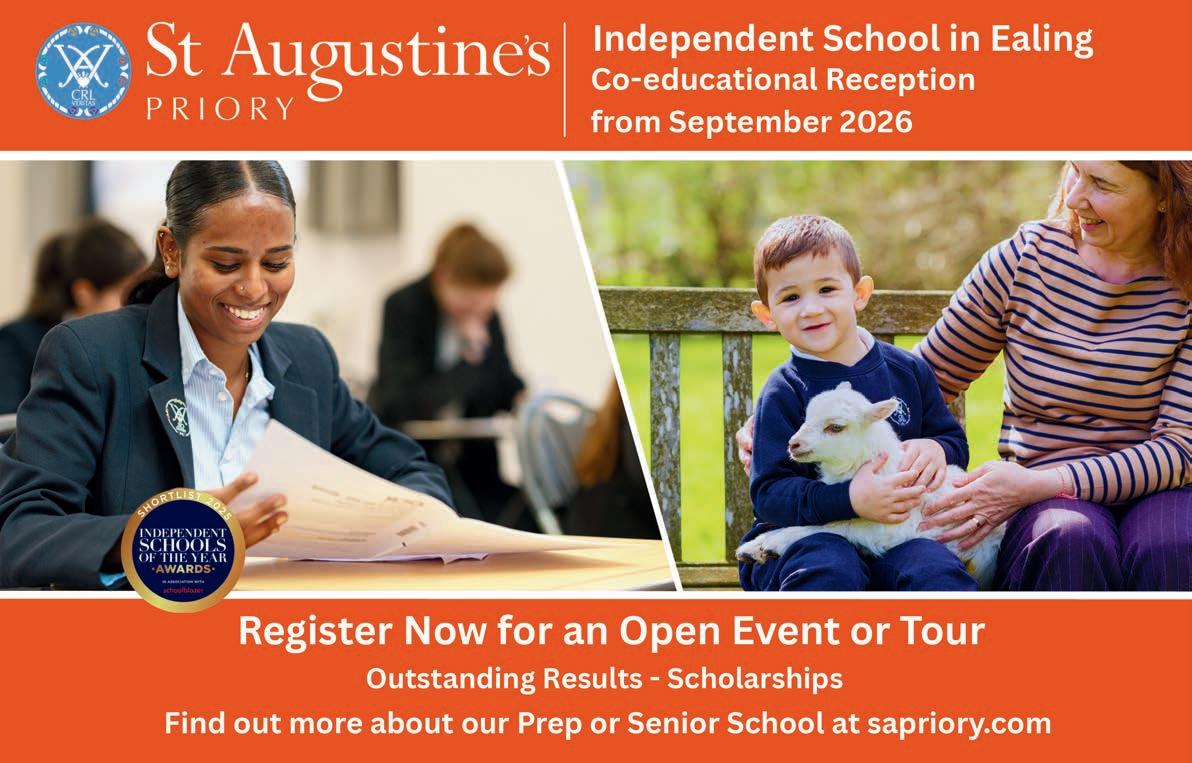

Discover the Magic of the Ionian with Sail Ionian Set sail on a bespoke adventure in the stunning Greek Ionian Islands. Whether you're a seasoned sailor or a complete beginner, Sail Ionian o ers a warm, family-run experience with exceptional service, flexibility, and safety at its heart.
•Bareboat Charter – For experienced sailors seeking independence and adventure
•Skippered Charter – Relax while our professional skippers guide your journey
•Informal Flotilla – Enjoy the camaraderie of group sailing with the freedom to explore
•Private RYA Training Courses – Learn to sail or advance your skills with expert tuition in paradise

Visit sailionian.com or contact us to plan your perfect sailing today. info@sailionian.com | 0800 321 3800
On 14 October at the Law Society in the capital, the leading lights of British education gathered to honour the winners of the eighth annual Independent Schools of the Year awards
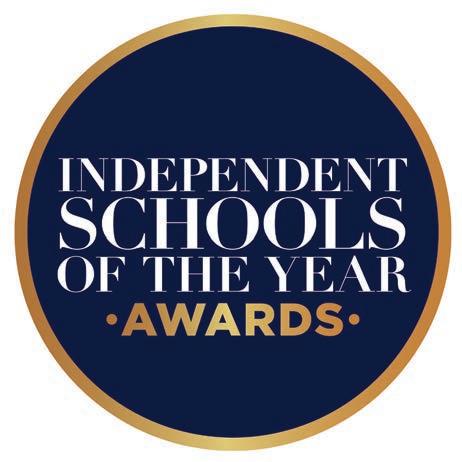
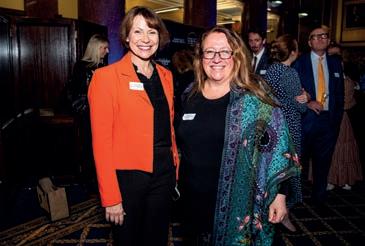
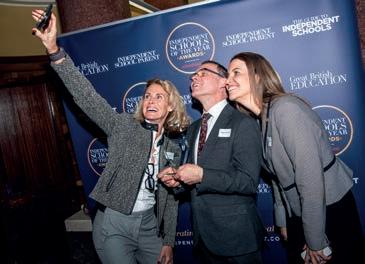
More than 200 guests from schools across the country congregated at the Law Society in London for the Independent Schools of the Year 2025 awards ceremony last month, hosted by this magazine. In just over eight years, the awards have become firmly established as the independent-school education sector’s leading awards campaign, securing category winners the national and international recognition that goes hand-in-hand with a surge of admissions enquiries.
With 25 categories, excluding the overall winner’s prize (with a joint win in one category, 27 awards were handed out on the night), the focus of the 2025 awards was, as always, demonstrating the benefits of an independentschool education – and to showcase the life-affirming, future-enhancing student experience the young people in our schools receive.
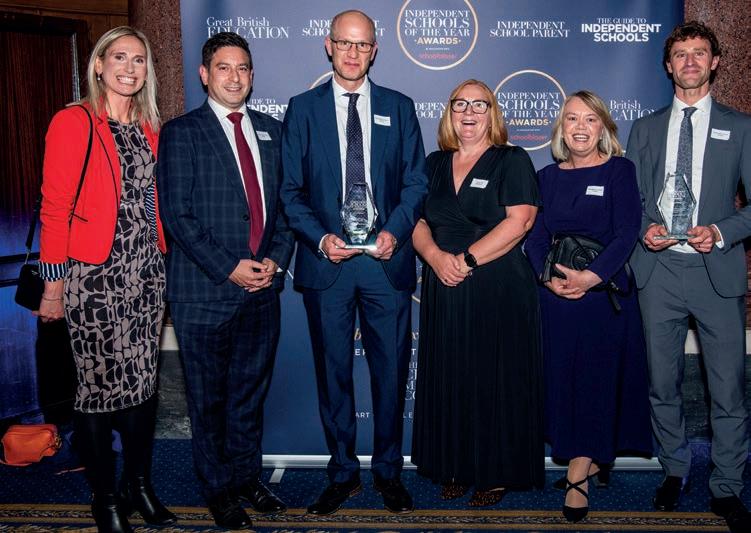
Independent School of the Year
• Haberdashers’ Elstree Schools
Independent Pre-Prep School of the Year
• St Christopher’s School & Nursery
Independent Prep School of the Year
• Mowden Hall School
Co-educational Independent School of the Year
• Alleyn’s School
Independent Girls’ School of the Year (Joint)
• North London Collegiate School
• St Helen and St Katharine
Independent Boys’ School of the Year
• Hampton School
Independent Boarding School of the Year
• Monkton Combe School
The British International School of the Year
• Brighton College Al Ain
Independent London School of the Year
• Sutton High School GDST
Independent School of the Year for Diversity, Equality, Inclusion and Justice (DEIJ)
• St Lawrence College
Independent School of the Year for Outstanding Educational Partnerships
• Haberdashers’ Elstree Schools
Independent School of the Year for Best Use of Education Technology
• Westbourne School
Independent School of the Year for Performing Arts
• Holmewood House School
The School Travel Award for the Best School Trip of the Year
• St James Senior Boys’ School
Independent School of the Year for Contribution to Social Mobility
• Bolton School
Independent School of the Year for Sporting Achievement
• Mill Hill School
Independent School of the Year for Student Careers
• Oakham School
Independent School of the Year for International Student Experience
• UWC Atlantic
Independent School of the Year for Student Wellbeing
• Worksop College and Ranby House
Small Independent School of the Year
• Lyonsdown School
The Development Award for an Outstanding Fundraising Achievement
• RGS Guildford
The Marketing Award for Brand Communication
St Albans High School for Girls
Rising Star of the Year Award
• Ahana Kotibhaskar (Wycombe Abbey)
Regional Independent School of the Year
• Central: Gresham’s School
• North: Durham Cathedral Schools Foundation
• South: Canford School
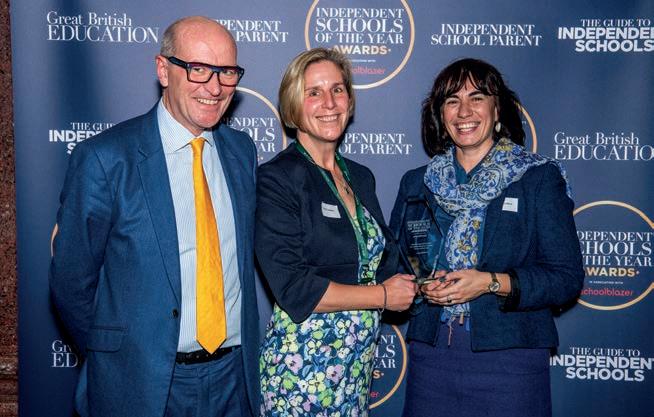
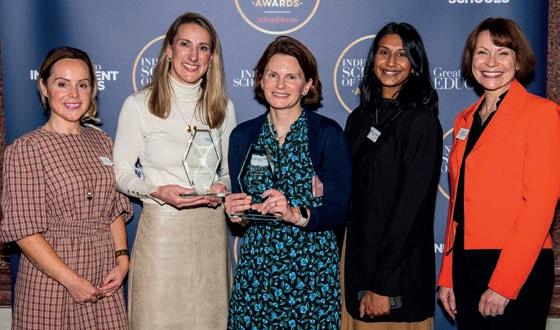
THE FOCUS OF THE 2025 AWARDS WAS, as always, demonstrating the benefits of an independent-school education – and the LIFE-AFFIRMING STUDENT EXPERIENCE
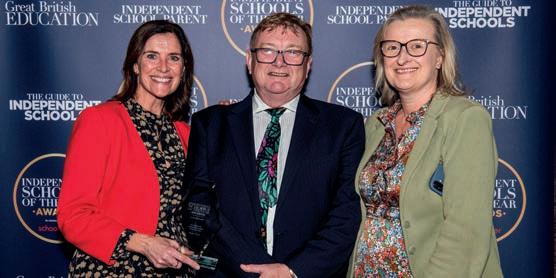

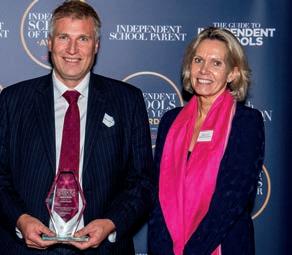
Saturday 15th November 2025 | 10am - 11.30am
Early Years Open Event for Pre-School & Reception (4+)
Saturday 7th February 2026 | 2.30pm - 4pm
Early Years Open Event for Pre-School & Reception (4+)
Friday 27th February 2026 | 9.30am - 11.45am Open Event
Wednesday 11th February 2026 | 9am - 12noon Open Event
Thursday 19th March 2026 | 9am - 12noon Open Event
To book a place at an Open Event please visit: stcatherines.info/admissions/open-events or use the QR code.

GSA Girls Day & Boarding School since 1885 | 3 - 18 years | GU5 0DF | stcatherines.info/explore

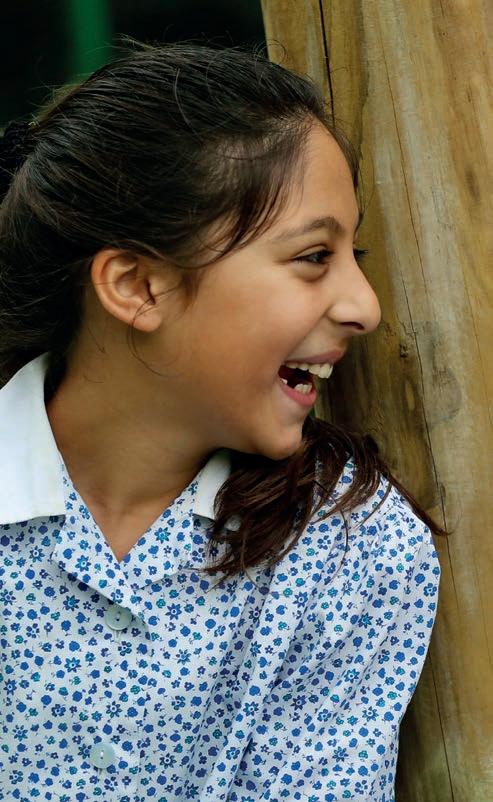


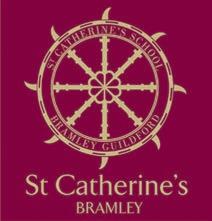

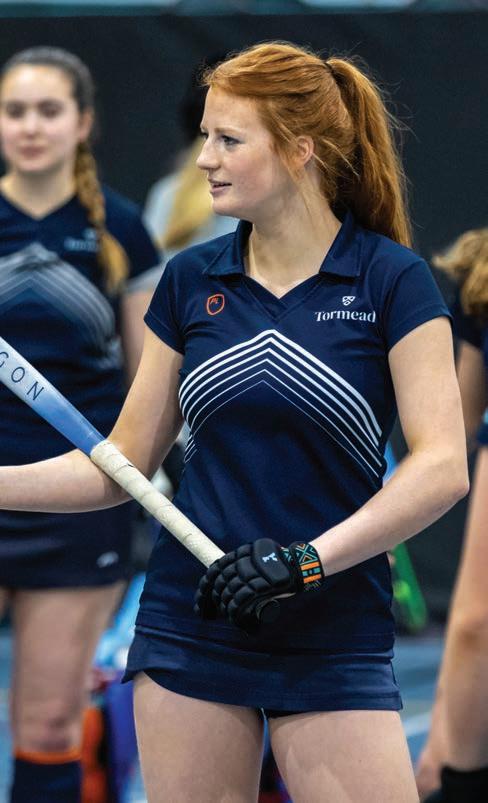
Dr.
Roksolana, Founder of Happy Kids Dental, shares her essential tips for protecting your child’s dental health
As both a mother and a second-generation dentist, I understand the juggle parents face – school runs, homework, sports clubs, and everything in between. Dental health can easily slip down the priority list. But small habits established early make a considerable di erence to your child’s long-term health, con dence, and smile. Here are the three things I wish every parent knew:
Brushing before bed is absolutely a non-negotiable
If you only manage one good brush a day, make sure it’s before bedtime. During sleep, saliva
production drops, which means bacteria have free rein to attack teeth. Skipping brushing before bed is the number-one reason we see cavities in school-age children. Help your child brush for two minutes with uoride toothpaste – and supervise until they’re at least eight to ensure every tooth surface is reached.
Sports mouthguards are a must
As children throw themselves into hockey, rugby, and martial arts, their smiles need protection too. Dental trauma from sports is incredibly common – and entirely preventable. a boil-and-bite mouthguard from Amazon can save you a lot of headaches and stress.
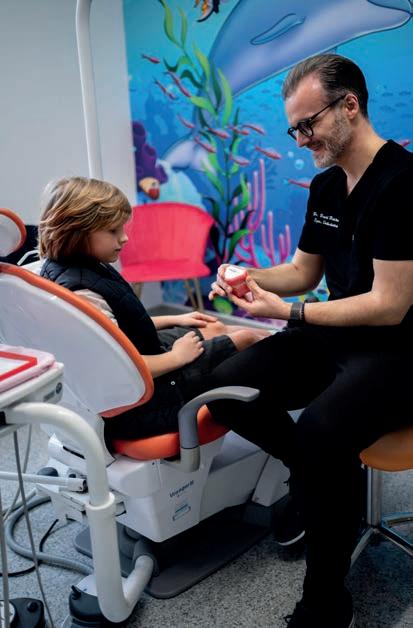
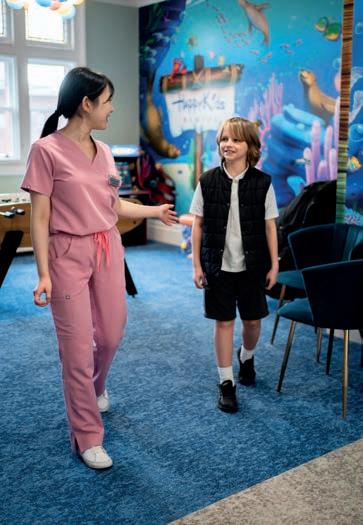
Book them in for an orthodontic check by age seven
Many parents wait until their child’s teens for braces, but early assessment can prevent complex issues later. By age seven, most children have a mix of baby and adult teeth, making it the ideal time to spot crowding, bite problems, or jaw growth issues. Early intervention can o en reduce (or even avoid) the need for lengthy orthodontic treatment during the teenage years.
At Happy Kids Dental, we’re passionate about giving children a positive, con dence-building experience at the dentist – because lifelong oral health starts young. If you have any questions about brushing routines, sports protection, or early orthodontics, we’d love to help.


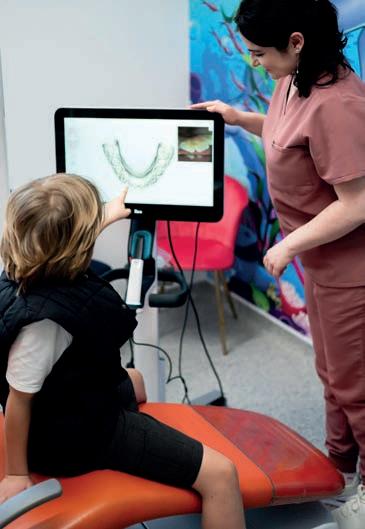
Find us in Marylebone, Chelsea, Hammersmith – and soon Wimbledon! happykidsdental.co.uk
From opera singers and actors to civil engineers, cricketers and rugby players, meet the independent-school alumni succeeding in their chosen fields

Opera singer
Pocklington School, Yorkshire
During a school trip, our singing teacher took us on a backstage tour of the Royal Opera House. We each sang a single note on the main stage and from that moment on, I dreamed of returning as a performer. As well as igniting my passion for opera, Pocklington School provided invaluable opportunities to perform in front of live audiences in theatre and music productions. The confidence and self-belief I gained alongside my academic studies prepared me well for my degree at the Royal College of Music (RCM).
After my master’s, I joined the RCM’s Opera Studio in 2024 and was recently selected as a Jette Parker Artist with the Royal Opera, receiving specialist training from leading international opera professionals. In May 2025, I made my Royal Opera debut in the titular role of Telemann’s Pimpinone. I’m now preparing for my main-stage debut as Baron Douphol in Richard Eyre’s production of La Traviata. I’m so grateful for my time at Pocklington School; it inspired me to follow my dreams!
England cricketer
Mill Hill School, Greater London
From an early age, I knew I wanted to be a sportsperson, so Mill Hill and Belmont, Mill Hill’s prep, were ideal for me. There were so many opportunities to play sport: hockey, netball, cricket and fives. I was able to get involved with lots of different sports, including ones that were far less developed in most girls’ schools, like cricket. Being in a co-educational setting was a real advantage.
As I got older, my cricket training took up a huge amount of time. Mill Hill was incredibly understanding throughout. When I was a pupil, it wasn’t possible for women to make a career out of cricket and I don’t think there are many schools that would have supported me in the way Mill Hill did, but that flexibility and support meant everything to me.
Mill Hill School shaped my character and gave me a brilliant education, and I’ll always be grateful to have been a pupil there.

Actor
Hurtwood House, Surrey
Coming to Hurtwood was a major turning point in my life and I loved all the opportunities to be on stage. It was a steep learning curve as, until then I hadn’t had any formal vocal training at all. My teachers were fantastic and so generous with their time. One was a successful actor and it really helped that he was an expert in the world in which I was trying to make my mark. Another helped me with my preparation for RADA, even though I applied five years after leaving school having already acted in many professional productions.
The drama department at Hurtwood was the catalyst for everything that I’m doing now. The productions were so professional that the transition to the West End didn’t seem like much of a gap. We Will Rock You at Hurtwood was life changing for me, as the school had invited someone from my future acting agency, Curtis Brown, to watch and the rest is history.
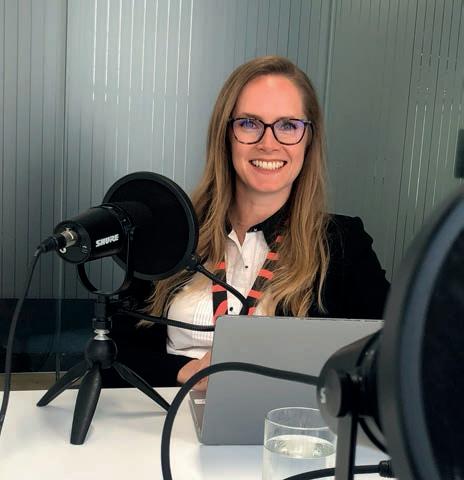

Civil engineer
King’s Worcester School, Worcestershire I fondly remember the support and encouragement I received from my teachers at King’s, and how they helped shape my thoughts and options for my career. My DT teacher in particular encouraged me to be confident in my own ability and helped me transform my ideas into tangible projects. I was also really supported by my house tutor, who encouraged me to have bold career aspirations.
Inspired by a King’s trip to volunteer at an orphanage in Tanzania, I co-founded the charity, Cameroon Catalyst to help transform lives in rural east Cameroon through the delivery of small but vital infrastructure projects. And I was incredibly proud and honoured to be awarded an MBE in 2015 “for services to civil engineering and international charity work”.
I currently lead a 500-strong structural engineering team at WSP, delivering some of the most iconic building projects in the UK across 20 sectors, and every day is both a challenge and an opportunity. In fact, every day is still very much a school day!
Played rugby for Wales U20s at international level
St David’s College, Llandudno
When I joined St David’s College, I was looking for somewhere that would let me push my rugby while keeping my academics strong. What I found was so much more. The small classes, supportive teachers and freedom to express myself gave me the confidence to take ownership of my learning and my sport. I learned that mistakes weren’t failures – they were part of the process. Coaches encouraged us to make decisions, reflect, and grow, which helped me develop resilience and leadership on and off the pitch. The balance of academic challenge and practical learning inspired me to achieve three As and a Distinction* at A-level. Beyond results, St David’s gave me belief in myself. That environment shaped who I am today, now studying physics at Loughborough University, captaining its rugby team, and still carrying the lessons of confidence, curiosity and determination that started at St David’s.

It’s o cially time to seek out as much glitter, sparkle and shine as possible. And as always, kids are one step ahead when it comes to trends – blame TikTok – so this Christmas, it’s likely your child will want to zhuzh up their Christmas list and party ensembles with pieces from Stych’s Sweet Treats range. From cherry-adorned hairslides and bags to colourful bead bracelets, the quirky brand’s signature style will be a disco hit throughout betwixtmas and beyond... Prices start from £5, stychaccessories.com


Deck the halls and ring in the cheer with festive fun days for all ages, tips for travelling to Turkey, and the chance to win a five-star Cretan getaway





s someone who’s always prided themselves on adventurous holiday choices, I’d never considered an all-inclusive for our family of four. But after a hectic year of house moves and new schools, the last thing we needed was adventure. What we needed was relaxation, and plenty of it. So for the first time, we booked a resort – and it might just be the best holiday decision we ever made.
We chose Turkey for its almostguaranteed sunshine, flying into Dalaman Airport and making the hour-long transfer to our destination: Hillside Beach Club, tucked into a private bay near Fethiye on Turkey’s south-west coast. We arrived hot, tired and crumpled, but were immediately greeted with cold lemonade and heartfelt warmth. Hillside is a well-kept secret among regulars who return year after year – and it didn’t take long to see why Nestled in its cove, surrounded by lush forest, with the Aegean Sea sparkling below, the resort’s location is spectacular. Our luxurious rooms were cleverly designed around a central terrace to maximise the view, overlooking an expanse of turquoise sea. Waking up on
Natasha Foges and her family stayed at Hillside Beach Club, an all-inclusive resort in Fethiye, Turkey, which exceeded all expectations…
our first morning to birdsong and the scent of pine trees, I could feel the knots in my shoulders begin to ease.
Days quickly found their rhythm. Breakfast in the main restaurant is a bu et-lover’s dream. I enjoyed the local Turkish honey, freshly scraped from the comb, flaky borek pastries, a cornucopia of breads and fruit in abundance. My husband Will became devoted to the omelette bar, while Joe (12) and Laurie (eight) feasted on Nutella-laden pancakes.
Then, the day was ours. The resort’s app made it easy to plan our time. The boys dashed o to the Activity Center for eight-to-15-year-old guests, run by energetic, multilingual sta who seemed genuinely delighted to play basketball and organise treasure hunts and DJ lessons. Laurie returned daily with a new creation made of tie-dye or papiermâché, while Joe loved the water games and mini tournaments.
Many hotels declare themselves ‘familyfriendly’, but Hillside elevates the concept. It’s fun for kids – gloriously so – but it also manages to be stylish, serene and deeply relaxing for adults too. While Joe and Laurie immersed themselves in activities, Will and I were granted that most elusive
of luxuries: time. We’d head down to Silent Beach, a peaceful adults-only spot where we read books beneath the olive trees, swam in the clearest water I’ve ever seen, and congratulated ourselves on not booking a mountain-trekking holiday.
Afternoons were family time at the pool or on the main beach – kayaking, pontoon-jumping and fish-spotting in the shallows. Hillside’s watersports centre is well equipped and safety conscious, o ering everything from paddleboards to banana boats. While the kids and Will zipped around the bay, I relaxed on a sunlounger, watching the fun unfold.
One evening, we joined a sunset cruise booked through the resort – a slow,







magical sailing with card games, drinks and dolphin-spotting as the pink sun dipped behind the hills.
Back at the resort, there was no shortage of activities. We lost a family boules tournament (but made friends), Will played darts and tried archery, and I indulged in a hammam and facial at the spa – a sanctuary of eucalyptus-scented breezes and open-air treatment rooms.
For more energetic guests, Hillside has a full roster: early-morning yoga by the sea, tennis, football, beach volleyball, sailing, and more.
Evenings had their own gentle buzz. While we could have booked more intimate dining spots, we kept returning

• Tour the ancient city of Tlos –Walk through Lycian rock tombs, Roman baths and a crumbling amphitheatre with mountain views.
• Browse Fethiye Market – Taste local specialities at this vast market, and pick up souvenirs, from crafts to jewellery.
• Take a boat trip to Butterfly Valley – Travel to this stunning natural reserve and discover more than 80 butterfly species.
• Ride the Babadağ cable car –Take a scenic mountain ride for spectacular views of the Fethiye area as the sun sets.
• Explore Kayaköy ghost village –Wander the eerie, abandoned Greek village and learn about its history and population exchange after the first world war.
• Hit the slides at Orka World –The largest aquapark in the area features a lazy river, wave pool and family-friendly cafes.
HILLSIDE’S WATERSPORTS CENTRE IS WELL equipped and safety conscious, offering everything from paddleboards to banana boats. I relaxed on A SUNLOUNGER, WATCHING THE FUN UNFOLD
to the lively main restaurant, whose staggering array of options – from gourmet salads and grilled meats to fresh fish cooked to order, all expertly catered – satisfied both the foodies and picky eaters among us. The desserts had to be seen to be believed: even sweet-toothed Joe felt a little overwhelmed by the
multitude of cakes, plumping instead for a simple cone from the ice cream station.
After dinner, we explored Hillside’s evening entertainments: beach movies, kids’ discos, live music and cocktails at Pasha Bar on Serenity Beach. More often than not, though, we ended up on our own little terrace, playing endless games of cards as the stars came out.





This wasn’t a trip filled with daring adventures or new discoveries, but it gave us something just as valuable – the chance for every one of us to unwind. As we packed our bags, Laurie asked if we could ‘stay another week or so’, and Joe began plotting our return. And me? I’m not usually one to go back to the same place twice, but there I was, checking the school calendar for spring half term. Hillside, we’ll definitely be back. hillsidebeachclub.com




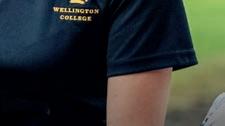















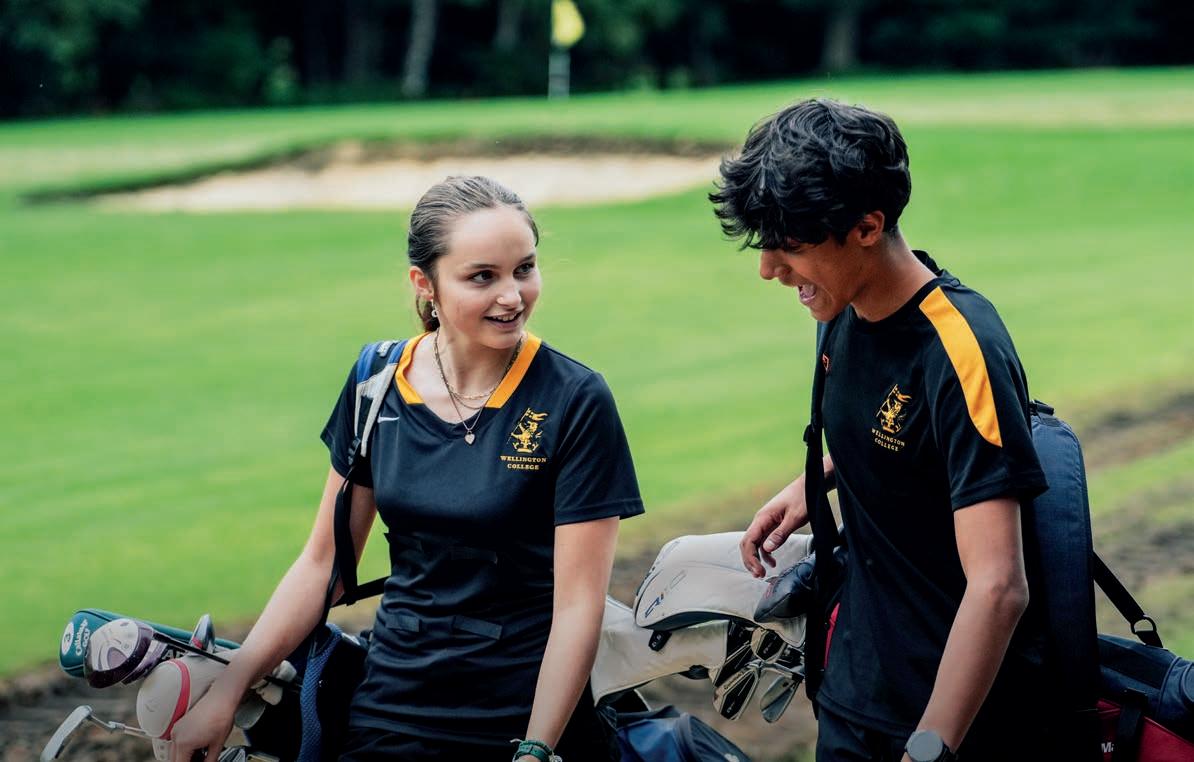



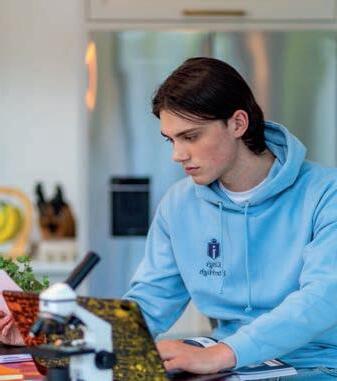


A growing number of UK students are looking beyond the Ivy League, discovering equally prestigious US universities known as the Ivy+
A growing number of UK students are looking beyond the Ivy League, discovering equally prestigious US universities known as the Ivy+
WWhen parents think of their child applying to the US, names like Harvard, Princeton, and Yale o en spring to mind. ese institutions are world-renowned for excellence, history, and prestige, and their global reputation makes them particularly popular with international students. Yet, they’re not the only, or necessarily the best, places to study. Enter the Ivy+ universities, a group of institutions that o er an equally outstanding academic experience but aren’t as overwhelmed by the same levels of global applications. e Ivy League names aren’t the only ones to aim for. e Ivy League is o cially made up of eight universities: Harvard, Yale, Princeton, Columbia, Brown, Dartmouth, Cornell, and the University of Pennsylvania. You’ve also likely
hen parents think of their child applying to the US, names like Harvard, Princeton, and Yale o en spring to mind. ese institutions are world-renowned for excellence, history, and prestige, and their global reputation makes them particularly popular with international students. Yet, they’re not the only, or necessarily the best, places to study. Enter the Ivy+ universities, a group of institutions that o er an equally outstanding academic experience but aren’t as overwhelmed by the same levels of global applications. e Ivy League names aren’t the only ones to aim for. e Ivy League is o cially made up of eight universities: Harvard, Yale, Princeton, Columbia, Brown, Dartmouth, Cornell, and the University of Pennsylvania. You’ve also likely




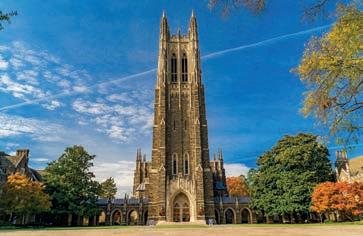
heard of MIT and Stanford, two top institutions that sit comfortably among the world’s best. But there are others parents should know, such as the University of Chicago, Duke, Johns Hopkins, and Northwestern, which consistently rank in the US top 10, attracting exceptional students from across the globe.
heard of MIT and Stanford, two top institutions that sit comfortably among the world’s best. But there are others parents should know, such as the University of Chicago, Duke, Johns Hopkins, and Northwestern, which consistently rank in the US top 10, attracting exceptional students from across the globe.
Each of these Ivy+ universities have distinct
Each of these Ivy+ universities have distinct
academic strengths. e University of Chicago, ranked sixth nationally, is renowned for economics, politics, and the social sciences. Duke and Johns Hopkins, tied at seventh, are leaders in medical, scienti c, and global research disciplines. Northwestern, also seventh, combines excellence in engineering, communications, and the arts. ese Ivy+ institutions rival, and in some areas surpass, the Ivies.
academic strengths. e University of Chicago, ranked sixth nationally, is renowned for economics, politics, and the social sciences. Duke and Johns Hopkins, tied at seventh, are leaders in medical, scienti c, and global research disciplines. Northwestern, also seventh, combines excellence in engineering, communications, and the arts. ese Ivy+ institutions rival, and in some areas surpass, the Ivies.
e best way to approach US university applications is to nd a university that truly ts the student: the right subject strengths, campus culture, and learning environment. Crimson Education’s expert strategists work one-to-one with students to identify and apply to their best- t universities, developing a strategy that matches their academic goals and personal preferences across the US and beyond. crimsoneducation.org/uk
e best way to approach US university applications is to nd a university that truly ts the student: the right subject strengths, campus culture, and learning environment. Crimson Education’s expert strategists work one-to-one with students to identify and apply to their best- t universities, developing a strategy that matches their academic goals and personal preferences across the US and beyond. crimsoneducation.org/uk
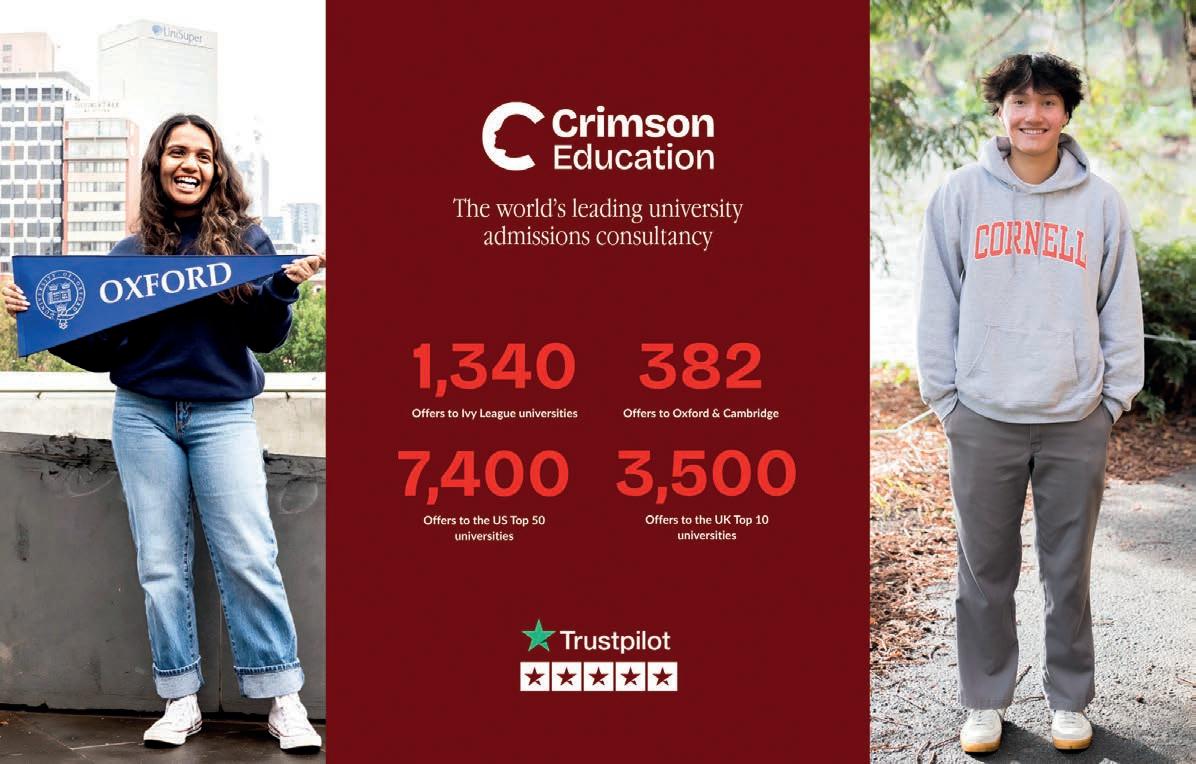












































*State boarding provision
*Award
*Elite athlete education programme
*Extensive enrichment opportunities
*Easy access to major UK travel hubs
*Centrally located within the UK
*Excellent GCSE & A Level results







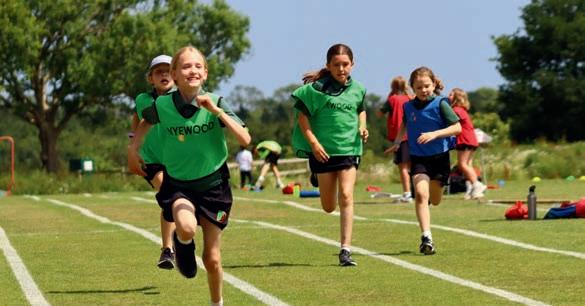









Our roundup of fun seasonal events, exhibitions and activities to check out
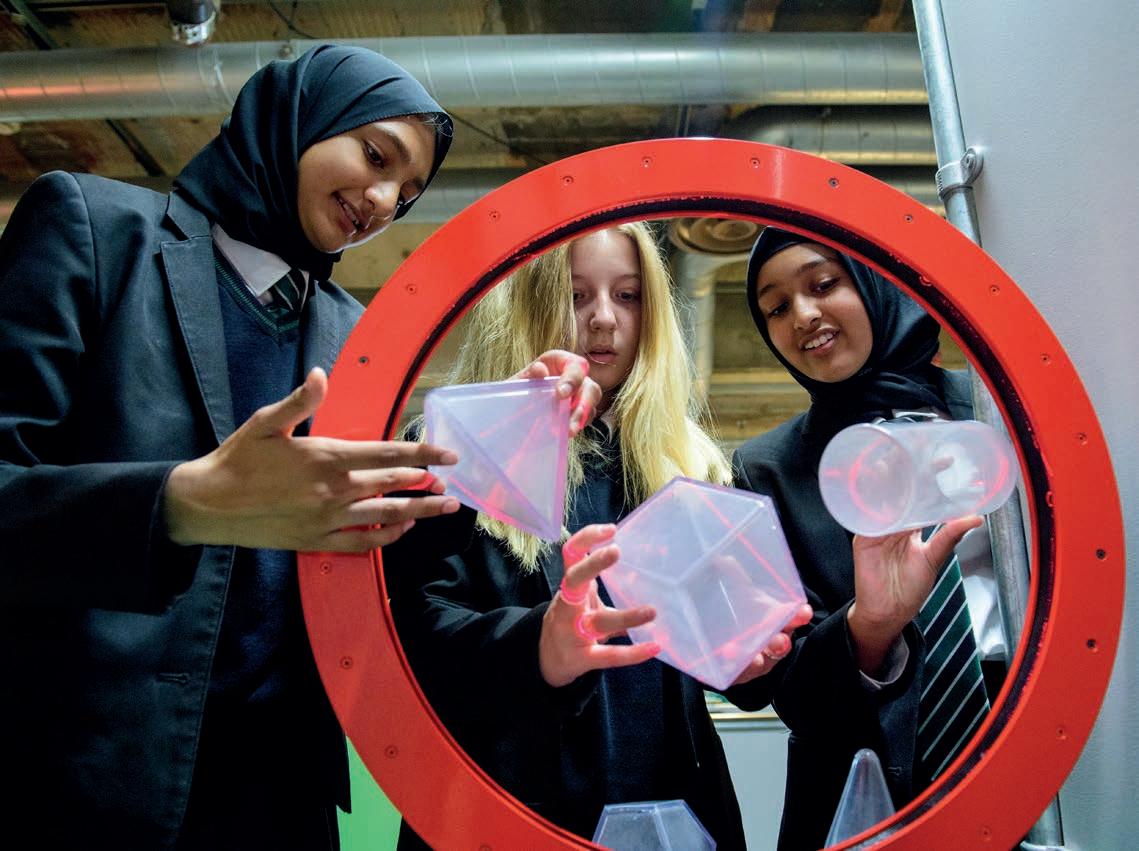
Do the math YEAR ROUND, FROM OCTOBER 2025
London
Mathematicians in the making will love the brand new interactive discovery centre opening up on London’s South Bank this autumn. MathsWorld is an exploratory space filled with more than 40 playful and thought-provoking immersive experiences and activities for curious minds of all ages, with zones that include code-breaking, AI, shapes, problemsolving – and even an area for under-eights. Inspired by other brilliant maths discovery centres around the world, including Mathematikum in Germany, it follows the hugely successful (though slightly smaller) MathsCity in Leeds, which opened in 2021. mathsworlduk.com
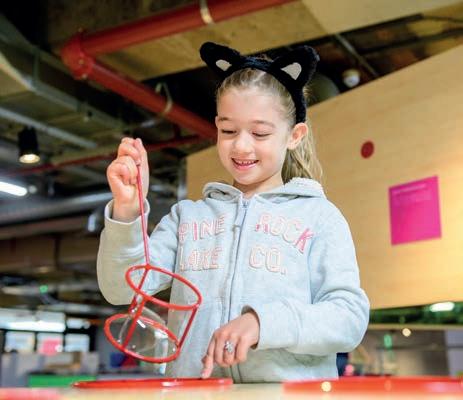
North Yorkshire
If you haven’t had your fill over the festive season – or want to kick things off in the best possible way – Wensleydale Creamery in Hawes, in the heart of the Yorkshire Dales, will delight cheese enthusiasts young and old. Families can learn about the Dales’ 1,000-year-old cheesemaking heritage in live demos, savour new favourites and discover what pairs perfectly with them in the tasting room and even sneak a peek inside the Creamery to watch the skilled cheesemakers at work. There are interactive elements especially for children too, as well as the opportunity to have their photo taken with life-size knitted figures of none other than Wensleydale’s most famous fans – Wallace and Gromit!
And the best bit? Children under 16 go free on weekends and during school holidays, and adult entry starts from £5.95. wensleydale.co.uk
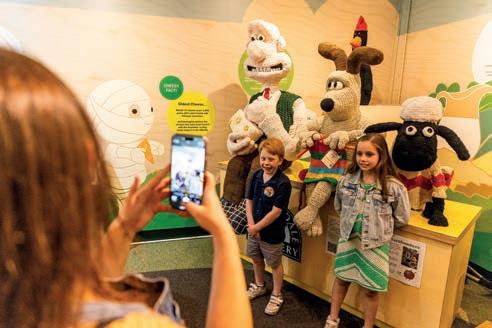
14 NOVEMBER – 1 JANUARY 2026
Kent
Wrap up warm and blow away the cobwebs down on the Kent coast this winter, where you’ll find plenty to keep you and the kids occupied at the vibrant and historic Folkestone Harbour. The iconic festive market will be in full swing, with its adorable fishermen’s huts filled with locally handmade crafts and incredible food – and when you’ve had your fill of festive coffees and delicious pastries, and stocked up on gifts, soak up all the entertainment on offer. Wander along the harbour for a spot of beachside adventure golf (which will have undergone its own festive glowup) or cosy up with a blanket to watch a classic on the big screen at the free outdoor cinema. Such fun! folkestoneharbourarm.co.uk

6 DECEMBER – 4 JANUARY 2026
London
Exploring the stories we tell, the ones we pass down, the ones we forget – and what happens when we take the time to listen – Fireside Tales is an enchanting interactive adventure from the brilliant immersive theatre pioneers Punchdrunk Enrichment. Suitable for children aged seven to 11 years, and their families, the 55-minute show has been developed with schools and encourages its young audiences to draw, write and share their own stories in a world of pure imagination. Don’t miss your chance to see it at Wembley Park this December, with tickets from £15. punchdrunkenrichment.org.uk


27 NOVEMBER – 3 JANUARY 2026
Hampshire




There’s a wealth of dopamine-boosting Christmas light trails happening across the UK throughout the winter months, including the spectacular Light Up at Sir Harold Hillier Gardens, just outside of Romsey in Hampshire, which happens to be the largest in the county. Moving through a series of immersive themed zones, each designed in partnership with world-renowned artists to tell a story through light, sound and atmosphere, families can marvel at everything from illuminated eucalyptus trees and a starlit Wish Pond to enchanting woodlands featuring holographic fairies and mesmerising lasers. And, of course, don’t forget to keep warm with a hot chocolate and other festive treats from the stalls in the Christmas Village – and maybe even pick up a keepsake bauble or two to take home. Tickets from £12.50. lightuptrails.com





UNTIL 25 JANUARY 2026
Cheshire
Step inside one of the most enduring aspects of Roman culture at The Grosvenor Museum over the coming months, as the touring exhibition Gladiators of Britain comes to Chester. Bringing together some of the most important objects of the time – including extraordinary finds from Chester’s own amphitheatre – the events of the arena come alive with rare Roman artefacts and special activities especially for families. Explore the human stories behind the gladiators and see what the spectators would have seen. You can even find out what it was really like to be at Gladiator School! Entry is free. westcheshiremuseums.co.uk
21 NOVEMBER – 4 JANUARY 2026
London
Throwing open its doors in honour of the festive season for the very first time, Chiswick House will be transformed into an imagined world of Georgian yuletide opulence and fantasy for its incredible Twelfth Night of Christmas event. In collaboration with live entertainment company Underbelly and theatrical heritage site curators CLW Event Design, this fantastical storytelling journey is inspired by the 1780 carol of the same name –and the era in which it was written. Take the opportunity to explore each of the opulent themed rooms, all featuring bespoke sculptures, fabulous period costumes and dramatic floristry, ending with a sumptuous banquet installation in the Lower Tribune. And, of course, Father Christmas will be waiting in his 18th century grotto with festive stories and gifts for younger guests. Tickets from £14. chiswickhousechristmas.com


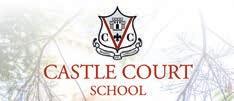
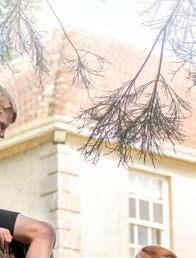
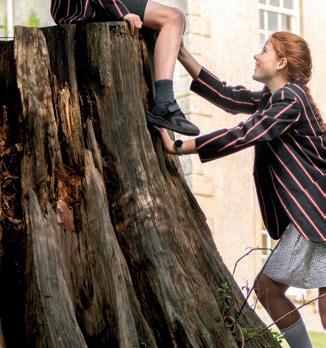


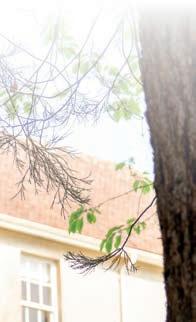
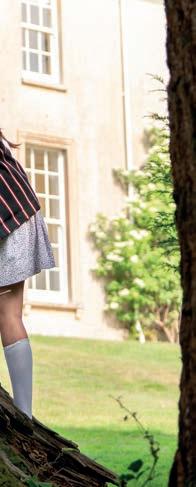


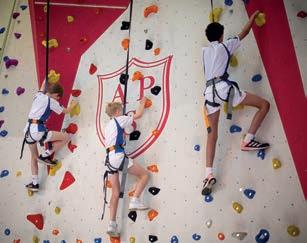

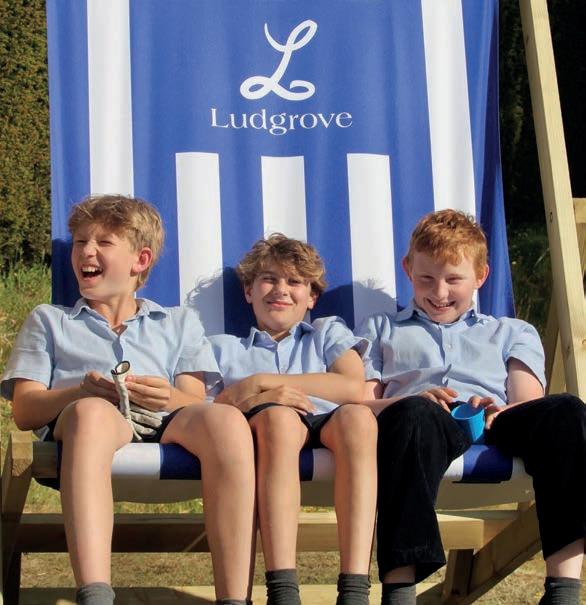


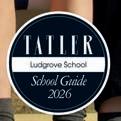

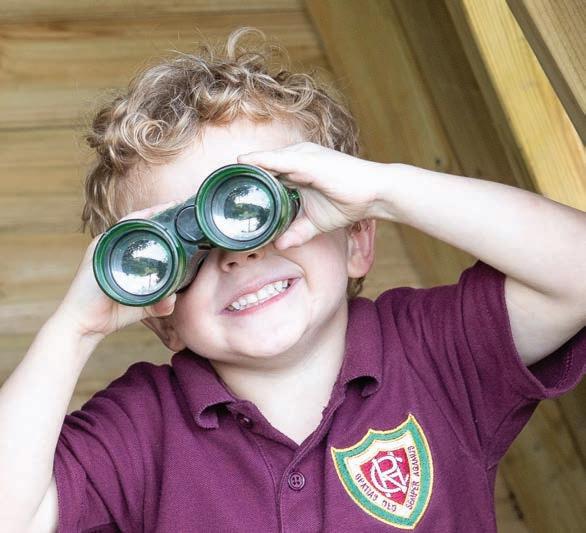



If you haven’t yet visited the Titanic: Echoes from the Past exhibition in Camden, be sure to add it to your list this autumn. The 360°immersive VR experience is perfect for children who love – or are currently learning about – history, with the opportunity to relive the iconic ship’s journey in its full glory. After a 15-minute onboarding session, you’ll get to walk through bustling third-class cabins, marvel at the grandeur of the famous staircase, and stand in the captain’s cockpit as the collision unfolds, as well as hear authentic monologues and accounts from real-life passengers. Minimum age is eight years. Tickets from £20. immersivetitanicvr.com/london


15 NOVEMBER – 4 JANUARY 2026
County Durham
Heart-warming Christmas activities don’t come more charming than the festive offerings happening at Raby Castle Park & Gardens in Darlington this winter. The medieval property will be filled with traditional cheer as families wander the eight beautifully dressed rooms that tell the story of what Christmas Day would have been like at the castle. There are opportunities to enjoy the Castle by Candlelight evening experience, the incredibly popular festive afternoon tea, regular wreathmaking workshops and the eagerly anticipated Christmas Market for food and gift shopping galore. And for younger members of the family, the Enchanting Forest trail outside in the Plotters Forest adventure playground – which is woven among the trees in a Christmas tree plantation! And if all that doesn’t entice you to visit, the breathtaking grounds, which includes an incredible 21-metre cascading waterfall, almost certainly will. raby.co.uk/christmas
28 NOVEMBER – 24 DECEMBER
Buckinghamshire
Looking to get up close and cuddly with some furry friends this festive period?
Odds Farm Park in Buckinghamshire is one of only 29 locations in the UK recognised by the Rare Breeds Survival Trust – in fact, its incredible Tamworth pig is considered as critically endangered as the Sumatran Tiger. There are more than 30 other different breeds of farm animal to spot, too, and plenty of festive happenings on selected dates up until Christmas Eve, including toy workshops (where children can make their own furry friend to take home), live entertainment, letter writing, reindeer food making, marshmallow toasting in the outdoor fire pits and so much more. Tickets from £17. oddsfarm.co.uk









Anemos Luxury Grand Resort is a ve-star sanctuary of sumptuous suites and spa indulgence on the fringes of the charming village of Georgioupolis in the Chania region. With breathtaking views of the majestic Le a Ori mountains and the endless Cretan Sea, Anemos – named for the Greek word for ‘wind’ – embodies the spirit of a serene seaside haven.
O ering a range of deluxe rooms, spacious family accommodations, elegant suites, and maisonettes, this resort invites guests to embrace the beauty of northern Crete’s longest coastline while enjoying impeccable services, re ned gastronomy, and moments of pure relaxation. Anemos represents a luxury waterside escape, next to the longest coastline of northern Crete, Chania.
To nd out more, or make a booking for your next holiday, visit anemosresort.gr
• A four-night stay in a deluxe family room (two bedrooms, with garden view) for two adults and two children (up to 12 years of age) on a half-board basis.
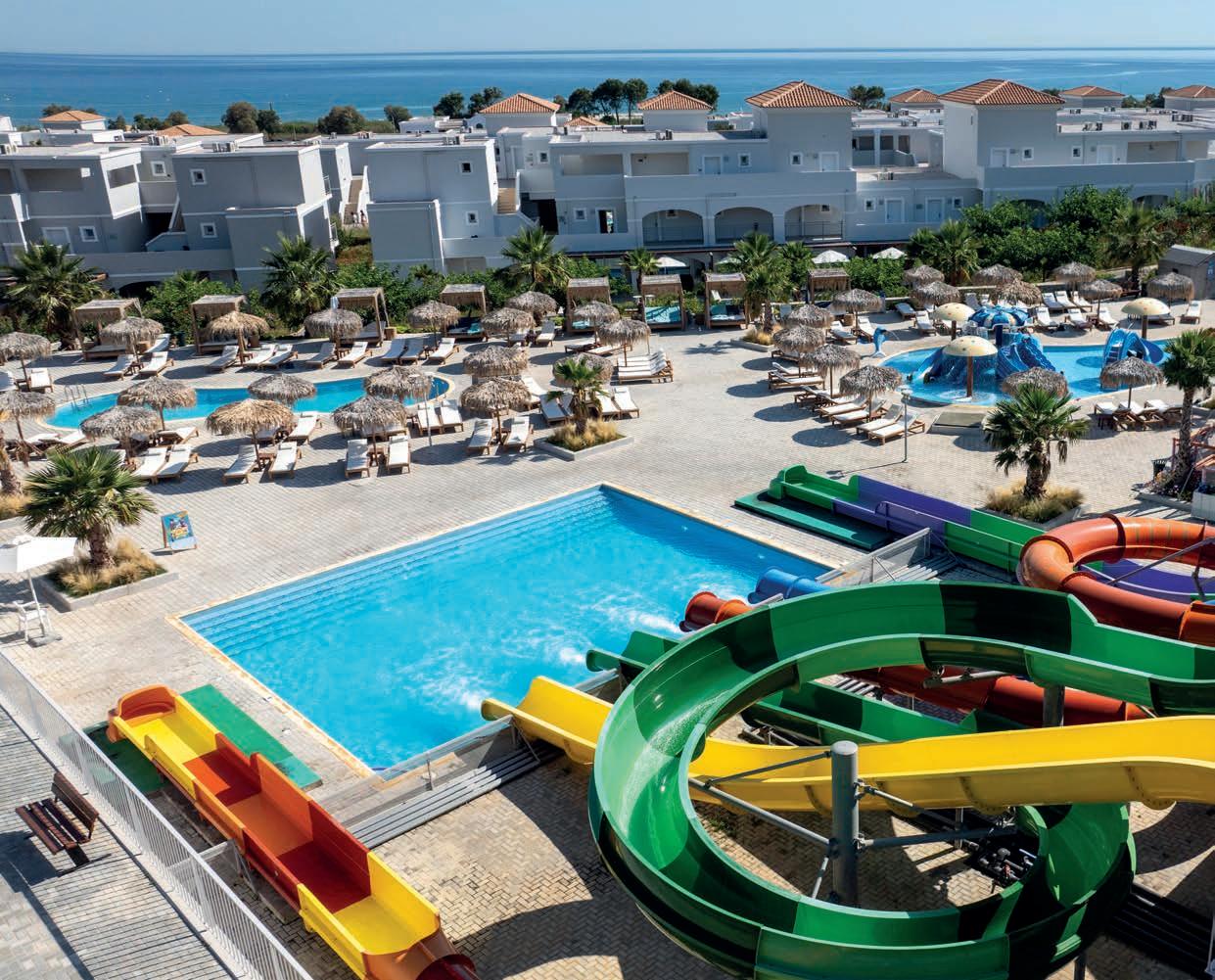






Please


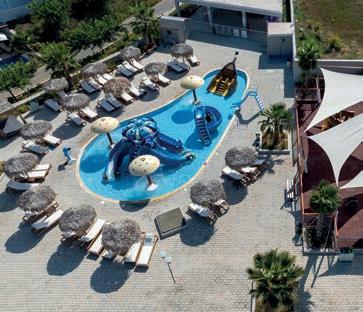


Founder and CEO of children’s clothing brand Happyology remembers her time at Queen Ethelburga’s in North Yorkshire
Describe Queen Ethelburga’s in three words:
I’d say it’s: holistic, international, disciplined. Who was your best friend?
My best friend was Catherine Chan. We studied at the same schools since primary school, moved to the UK at the same time, attended the same college, and even studied the same subjects. We shared many life experiences and supported each other deeply. What did you want to be when you grew up?
I wanted to become an entrepreneur and run my own company. I’ve always really enjoyed problem-solving and had a strong enterprising spirit. I was particularly interested in the supply chain and brand creation. What was your most embarrassing moment at school?
Crying during a maths class when exam marks were released because I didn’t achieve the score I expected.
Play any pranks?
Disciplined Jessie was a favourite of teachers at Queen Ethelburga’s



“I WAS DEFINITELY A TEAM PLAYER in terms of group projects or house responsibilities. I even STARTED AND RAN A YOUNG ENTERPRISE COMPANY”
Yes, quite often! Mostly in the girls’ house, where we spent a lot of our free time. We played harmless pranks on each other, shared laughs, and bonded over gym sessions and late-night chats.
Let’s talk about the food… worthy of a Michelin star or…? The school meals were excellent – healthy, diverse, low in salt, and very wellbalanced. I genuinely enjoyed them and would say they were worthy of a Michelin star!
Where was your favourite place at school to hang out with friends?
I loved hanging out in the common room with a larger group of friends. For more personal conversations, our en-suite rooms were perfect. We often talked about fashion, makeup, and relationships. My roommate was from Germany, so we also exchanged a lot of cultural insights.
Were you a teacher’s pet or someone who was more likely to be in detention?
I was lucky to be a teacher’s favourite in many subjects,
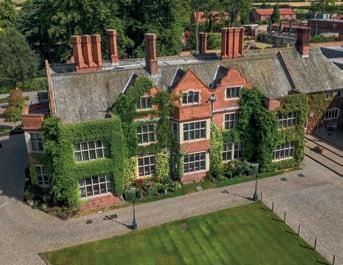
All-star sports captain or outside field lingerer?
I wasn’t an all-star captain, but I stayed active. I participated in field running, swimming, and yoga regularly.
Did you win any prizes? Yes, I won several academic performance awards throughout school. I also received a silver award in the Maths Olympiad and a Young Enterprise award.
Who was your favourite teacher there?
especially physics, maths, business studies, and with my housemaster. I think they appreciated my self-discipline and the fact that I never gave them trouble.
Were you a lone wolf or more of a or a team player? I enjoy working independently when it comes to studying, but I was definitely a team player in terms of group projects or house responsibilities. I even started and ran a Young Enterprise company, which gave me my first experience as a company director.
My favourite teacher was Martin, our business studies teacher. He was inspiring, humorous, friendly, and incredibly knowledgeable. He always motivated us to go beyond the syllabus. What advice would you o er your school-age self?
I would tell myself to take an arts subject related to photography or fashion – both have been hobbies of mine since childhood, but I never studied them academically. How would your teachers describe you?
Conscientious, quick to learn, and highly self-disciplined.



